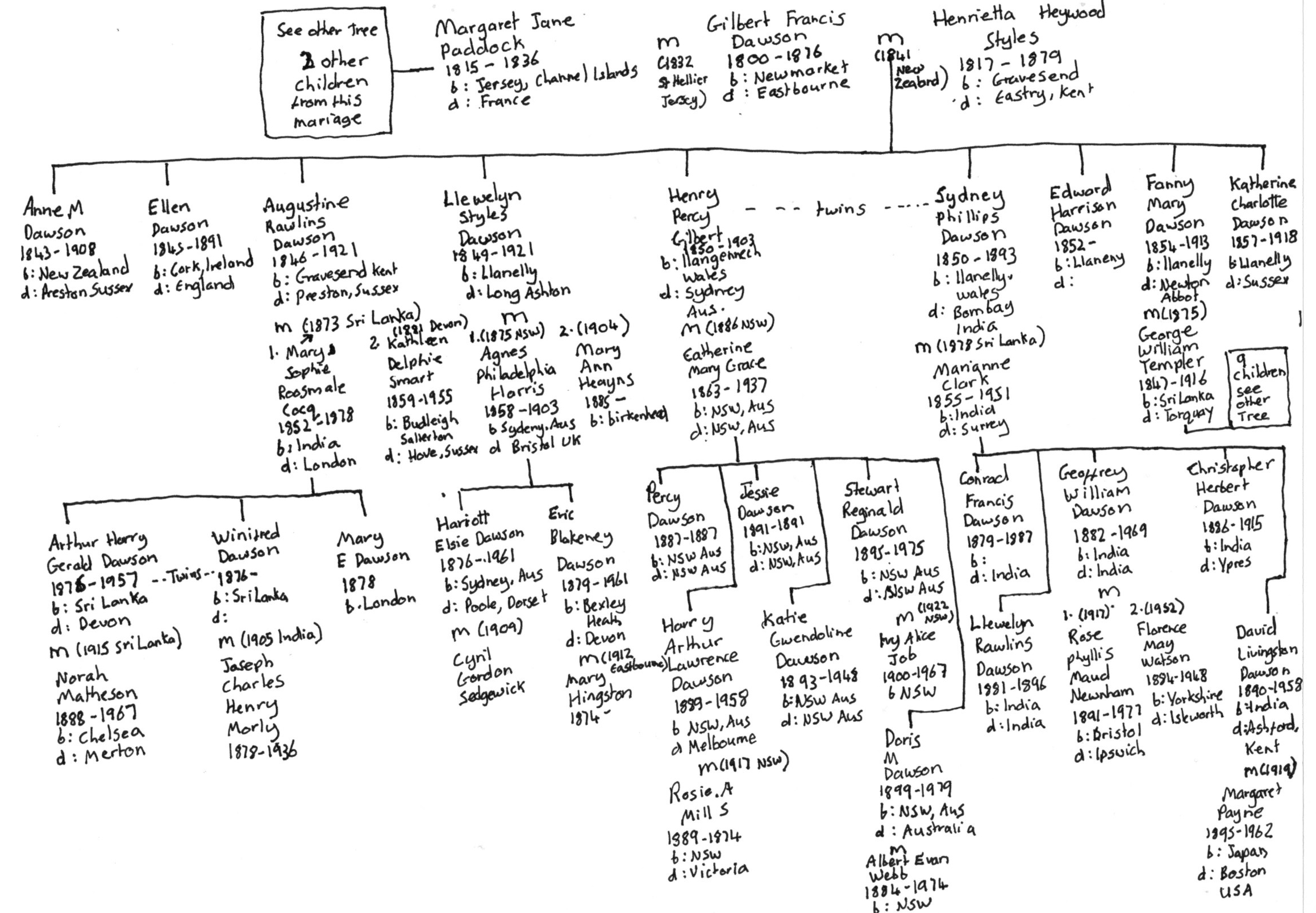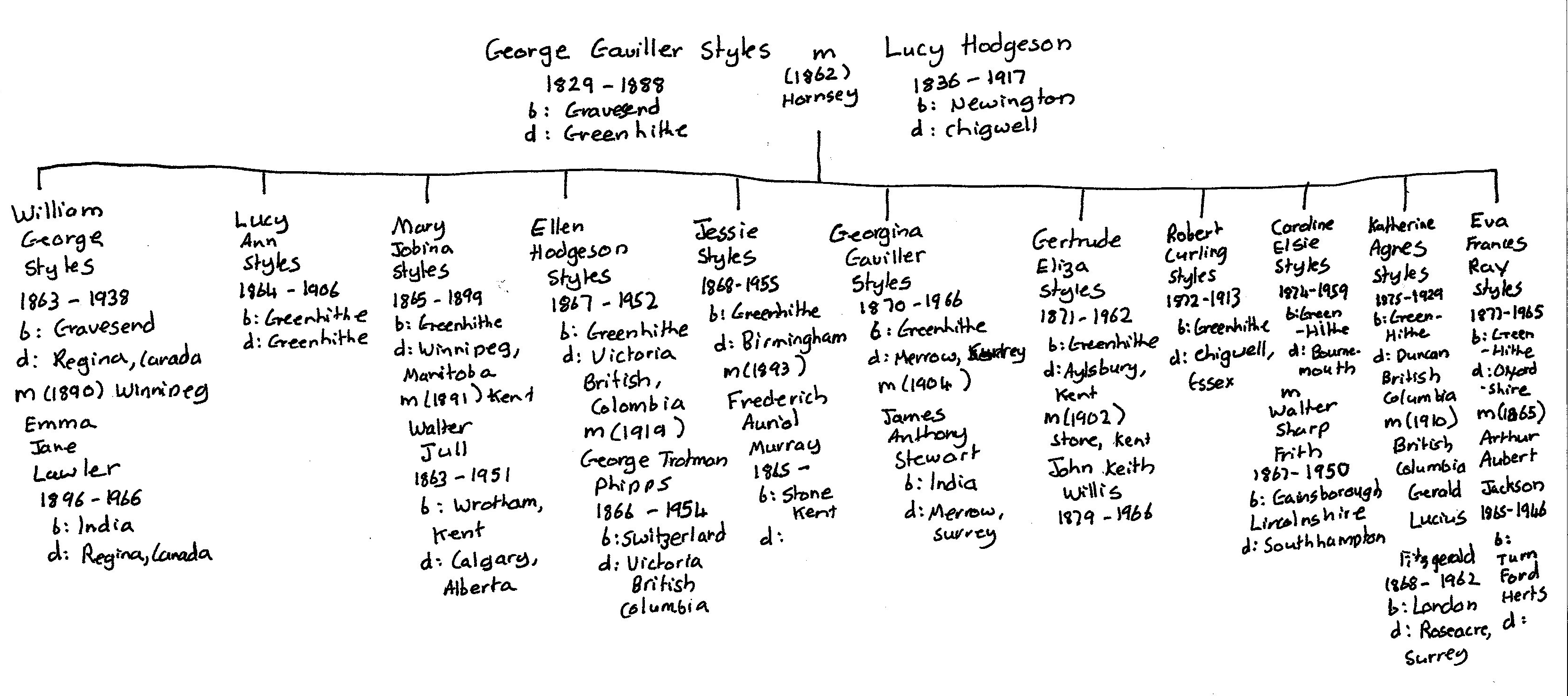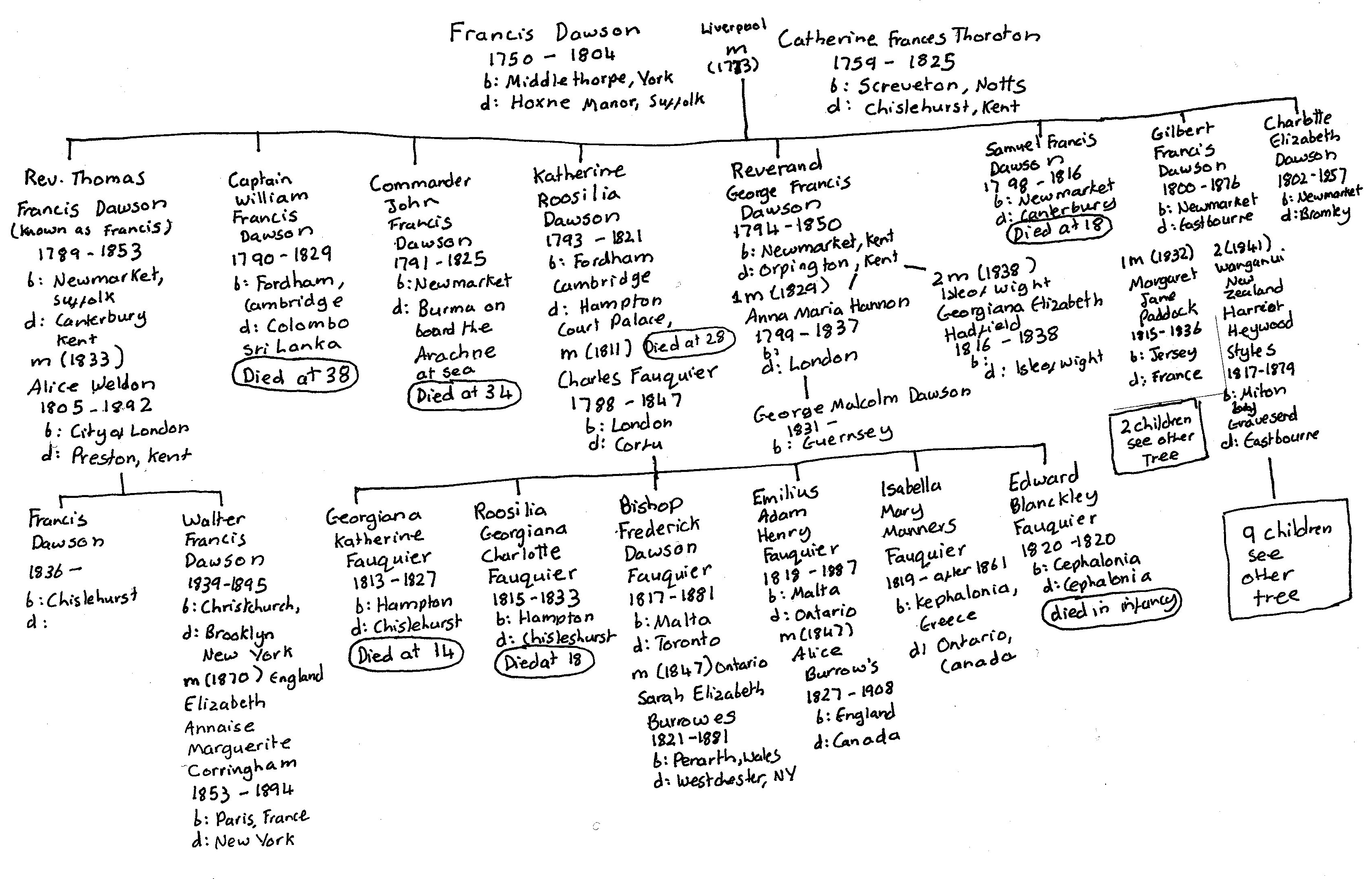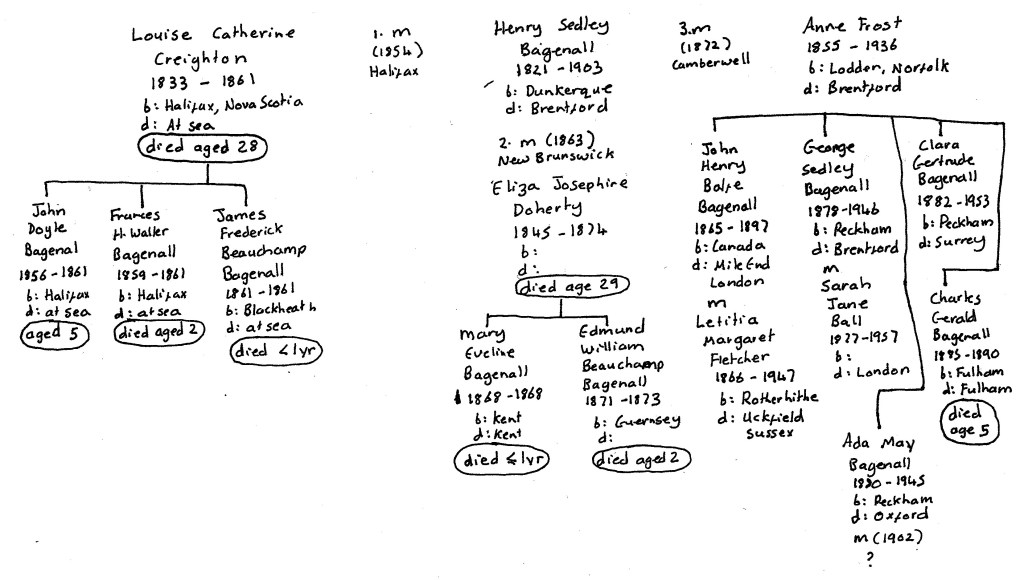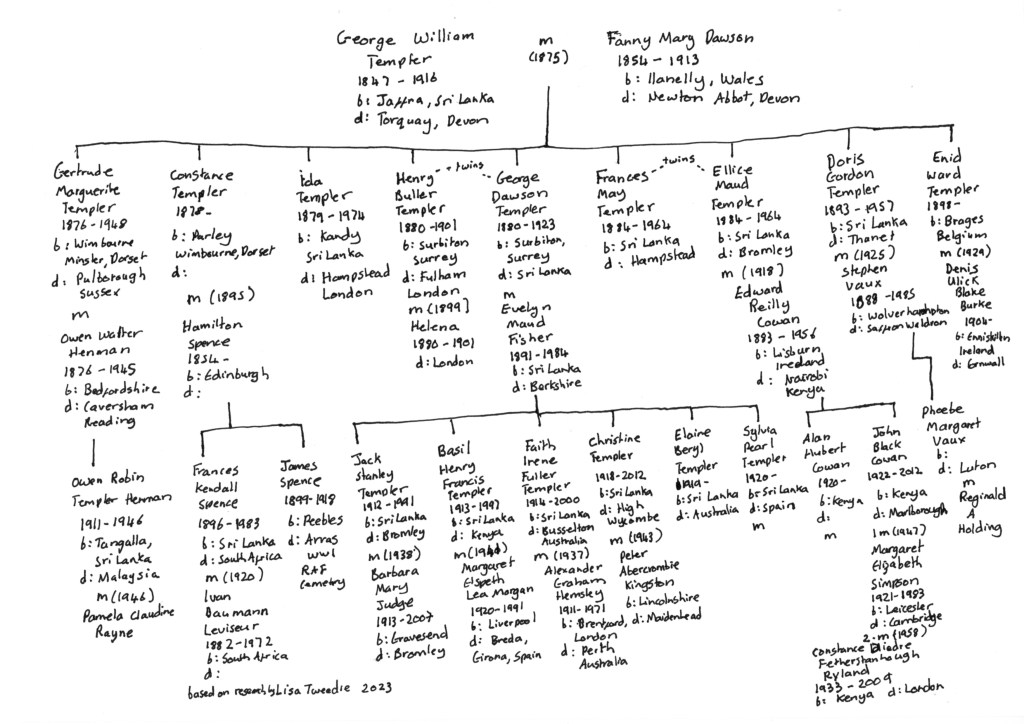Mid 1800’s Ancestors :
New Zealand, Kent, Wales

Harriott Heywood Styles
Born: 22 Jun 1816
Milton by Gravesend, Gravesham Borough, Kent, England
Died: Jun 1883
Eastbourne, East Sussex, England

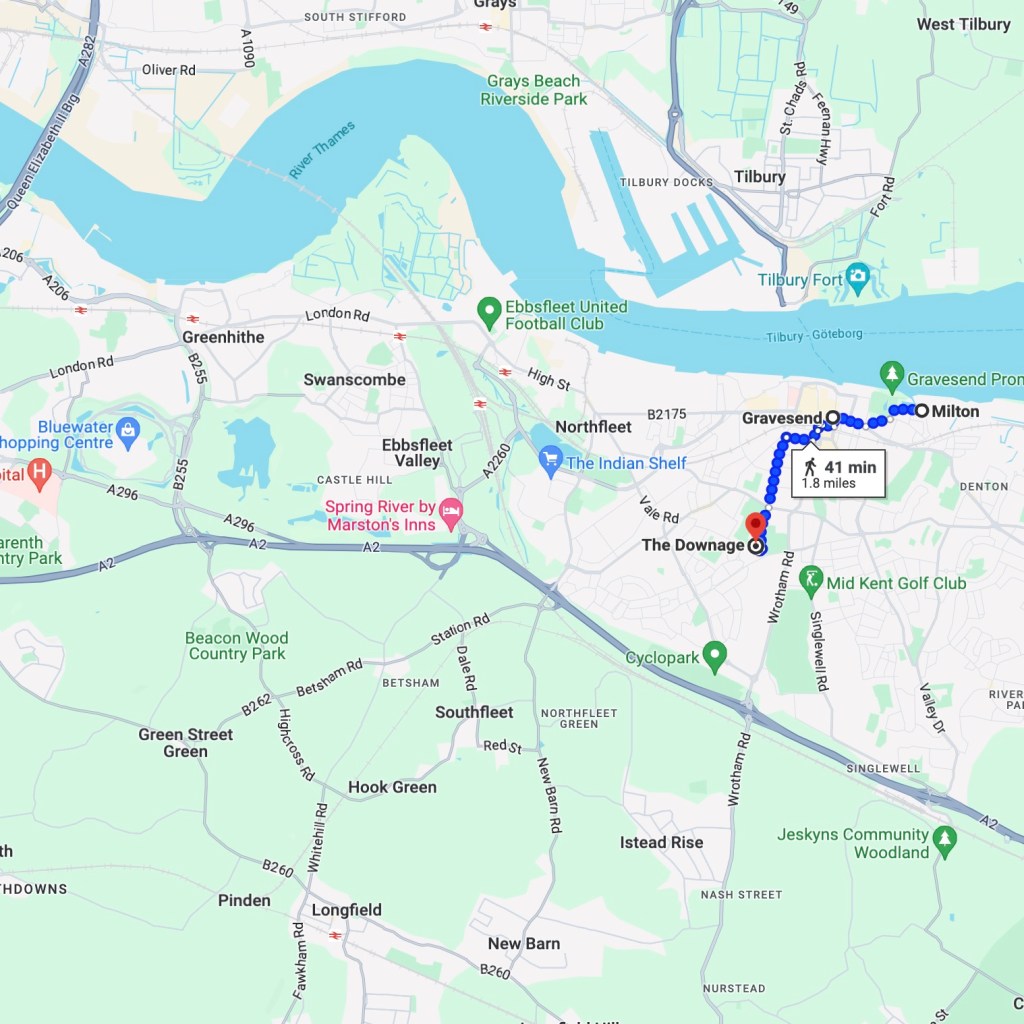




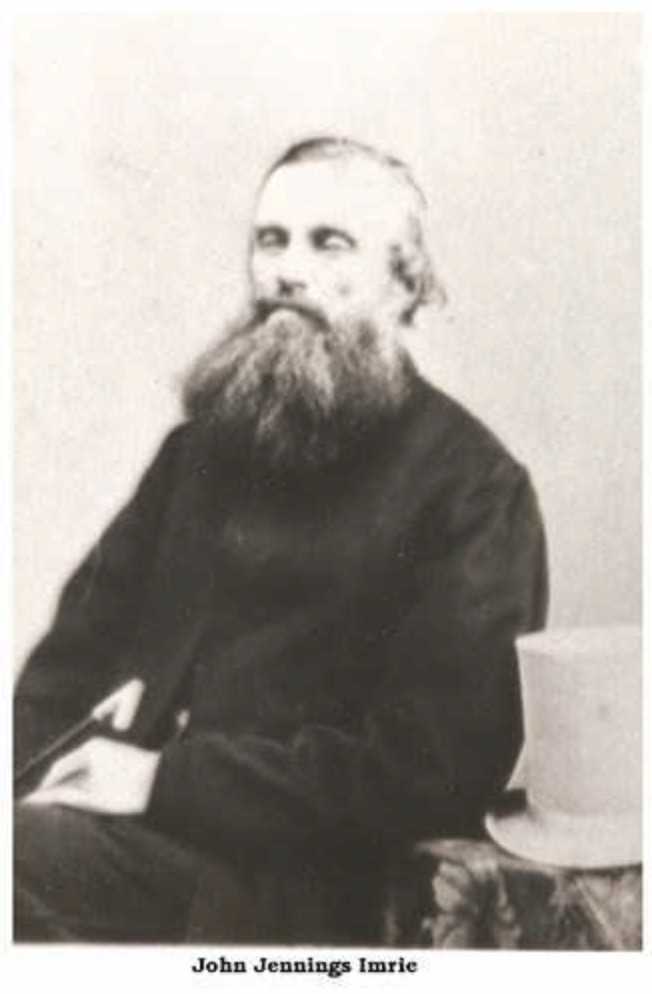
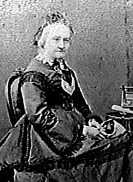

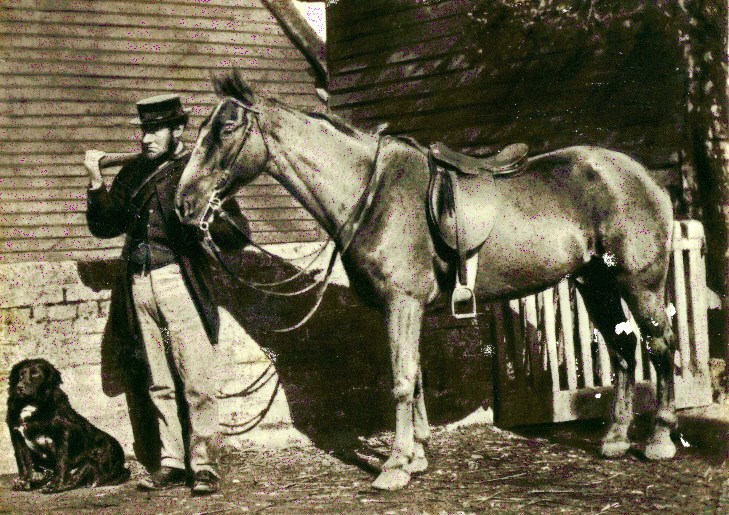

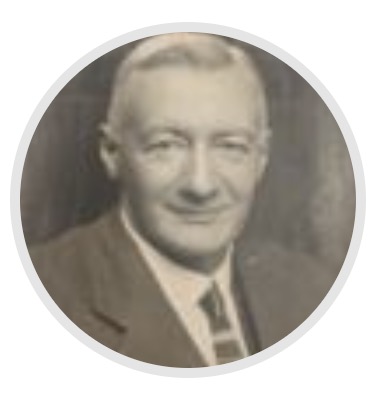
Harriott was the daughter of William Hancock Styles a farmer from the Gravesend area of Kent and his wife Harriott Smith. She came from a large family who had all lived in Gravesend for a long time. It was not really a family that travelled.
The 1841 England and Wales Census recorded in June finds Gilbert’s two boys from his first marriage living with Harriott’s parents in Gravesend on the Styles family farm that was her childhood home. It is likely they had stayed there to complete their education. Harriet is recorded as living there too. It is not clear how Gilbert was introduced to the family but given that the docks were right there and he lived on ships he probably had local connections.
In the April of 1841 Harriott’s sister got married. I can imagine them timing that wedding so it would be before Harriott left for her very long time away from the family.
There is a record of Harriott taking a boat called the Clydeside from Clydeside, Glasgow Scotland to Australia. It went on to Wellington, New Zealand arriving in Wanganui on November 24th 1841 with Miss Styles and two masters Dawson on board. So it seems she accompanied the boys out to New Zealand. The Clydeside was a ship built by the master ship builder Kenneth Mathieson to transport his own family and belongings to New Zealand. He carried with him 14 passengers. They left in July and docked in Australia before going on to Wellington and then finally Wanganui.
On board was a Dr John Jennings Imrie who wrote an account of the voyage which is held at the University of Queensland library. I have not been able to access it yet.
The boat arrived safely to the Wanganui river only to ground opposite Landguard bluff just outside of town. The boat does appear to have got damaged as Mathieson had to build a dock to fix it later. The Clydeside sailed back to England a few years later.
Imagine coming all the way from Scotland only to be grounded a few kilometres from your destination! The site of the grounding is close enough to the town that people on land may have seen it and sounded the alert. Perhaps they were able to unload Harriott and the boys from the grounded ship.
Harriott Heywood Styles married Gilbert Francis Dawson five days later on Nov. 29, 1841, in Wanganui, New Zealand. Harriott was 24. It must have been quite a change for her to be living in straw hut in a fairly unruly settler community the other side of the world from home.
Unfortunately they left New Zealand within a couple of years under a scandal related to Gilberts work situation. The family then lived in Ireland briefly and then for about 10 years in Llanelly, Wales where Gilbert was the portmaster at the new coal docks. All the rest of their children were born there.
Harriott was the step-mother of Gilbert’s two children by his first wife, and also the mother of nine children by him. They were: Anne Marguerite Dawson, born 1842 in New Zealand; Ellen Dawson born 1844 in Ireland; Augustine Rawlins Dawson born 1846 in Gravesend; Llewelyn Styles Dawson, born 1848 in Llanelly, Wales; Harry Percy Gilbert Dawson, born 1850 in Llanelly, Wales; Twins: Edward Harrison Dawson & Sidney Phillips Dawson, born 1851 in Llanelly, Wales; Fanny Mary Dawson, born 1854 in Llanelly, Wales; Katherine Charlotte Dawson, born 1857 in Llanelly, Wales.
The family moved to the South East of England circa 1860. The 1861 census shows Harriot Heywood’s mother, Harriot Styles, living with them in Dartford, Kent. In 1871 they were in Eastbourne, and lived out the remainder of their retirement there.
In 1878, Mary Sophia Dawson (nee Roosmale-Cocq), the wife of Harriott and Gilbert’s son Augustine Rawlins, was in London with their two children, Winifred Templer Dawson, age 3, and Arthur H. G. Dawson, age 1. She was pregnant with their third child. Her husband Augustine Rawlins remained at home in Ceylon.
On March 7, 1878, Mary Sophia died in hospital, likely giving birth to Mary E Dawson. Harriott , at the age of 62, took in these three kids, and raised them as her own. In the 1891 census, the 3 kids can still be found still living with 3 of Harriott’s daughters. The eldest Winifred, became a nurse, and worked, and married, in Calcutta, India. Arthur became a Survyor, and spent his whole working career in Ceylon, retiring as Surveyor General of Ceylon. He would have worked with his cousin George Dawson Templer.
Harriott died in Eastbourne in 1883, Seven years after her husband. Her funeral was at St Mary’s church and she was buried with her husband there.


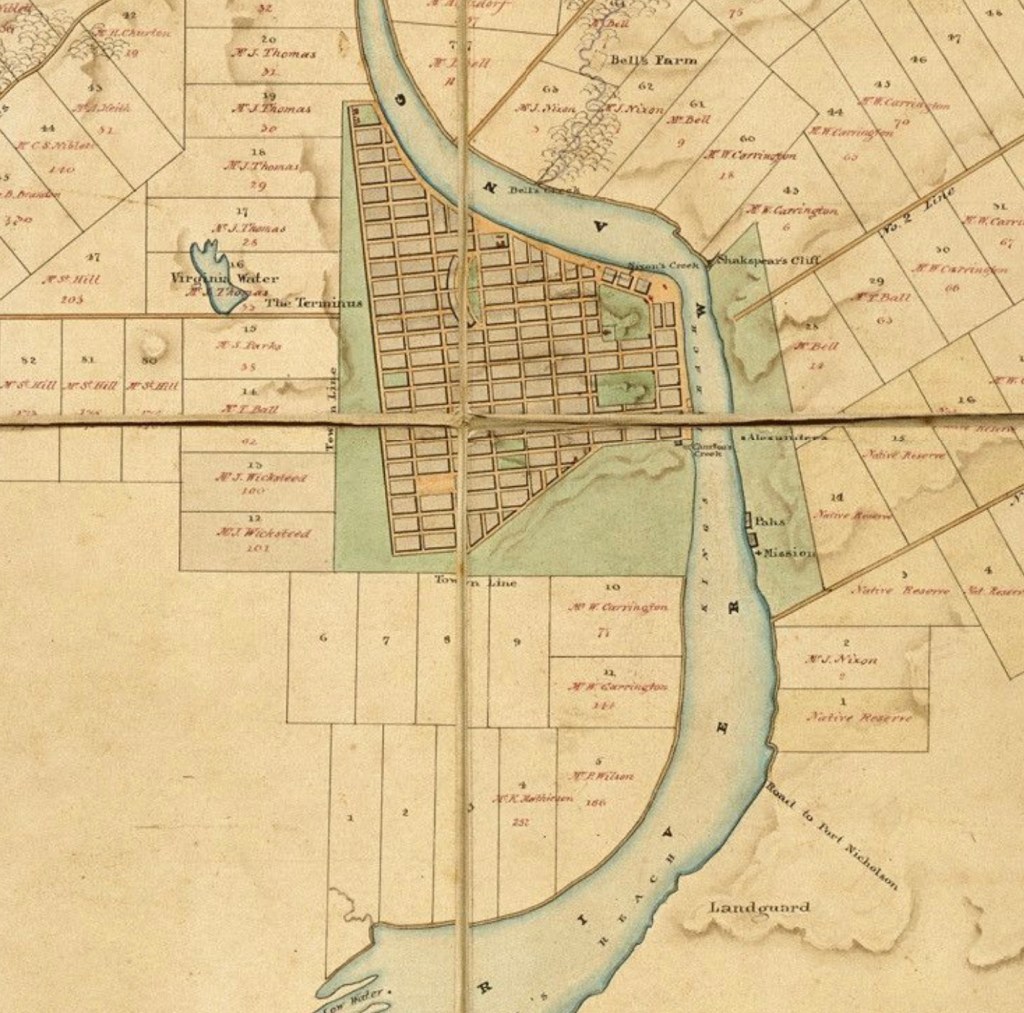

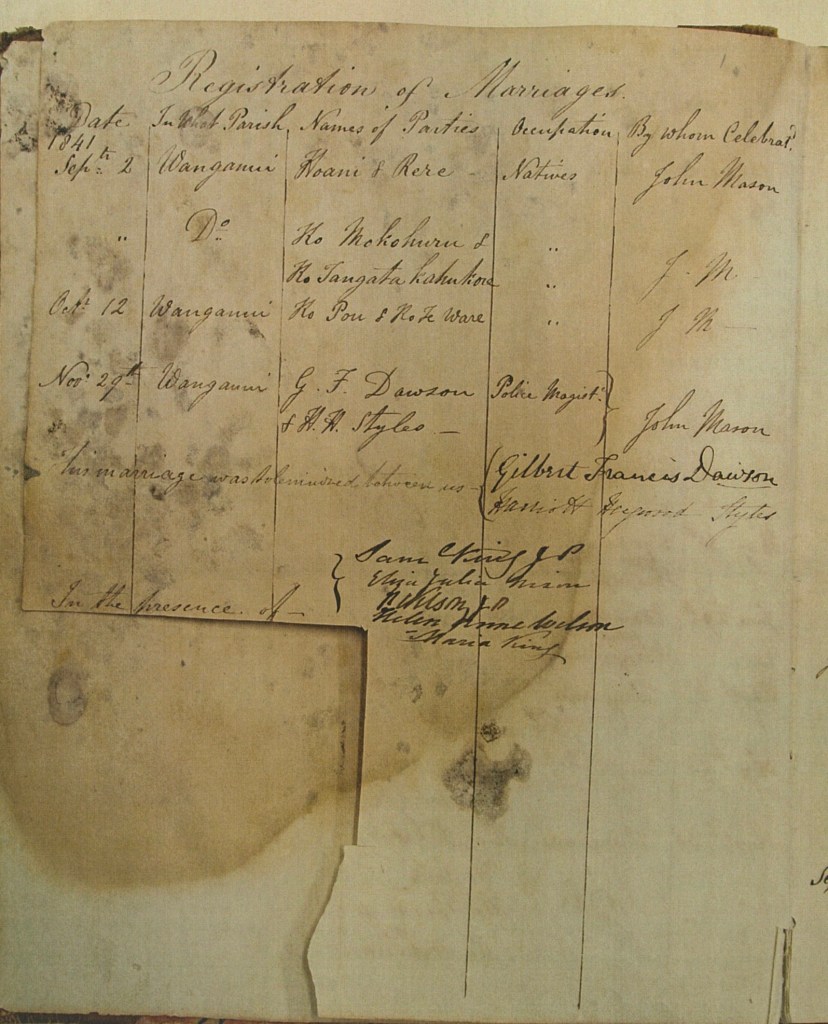
Further details about the Clydeside the boat Harriott went to New Zealand on with George and William Dawson (Gilbert’s young sons) and a description of the harbour which was difficult to navigate.
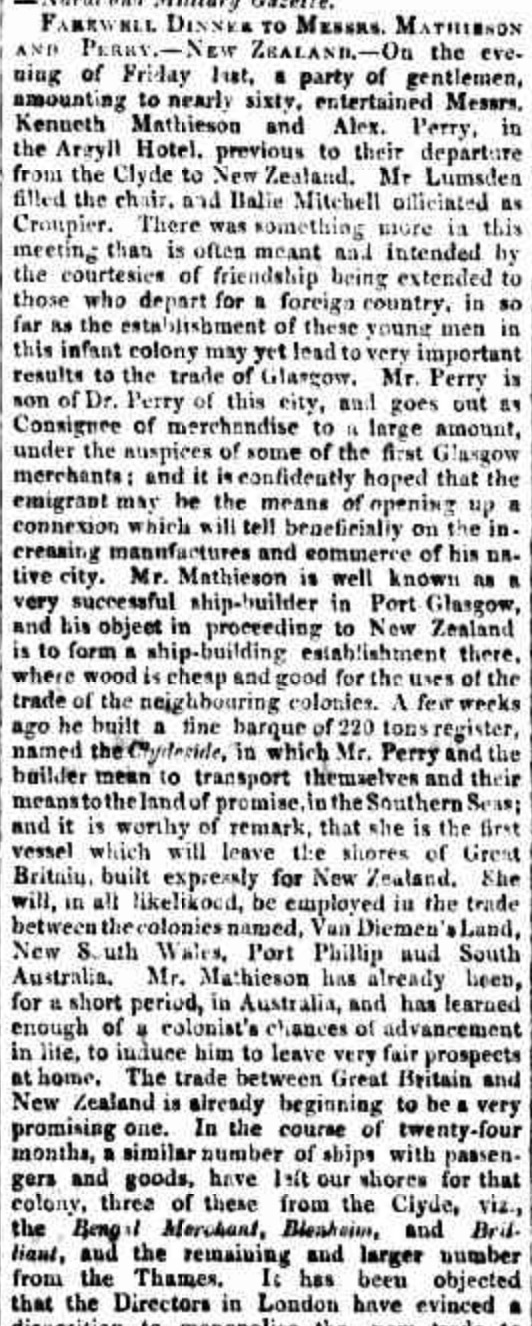

The ship ran aground when she arrived at Whanganui. This was not suprising as it was a very difficult river to navigate with large sandbanks – see extract from



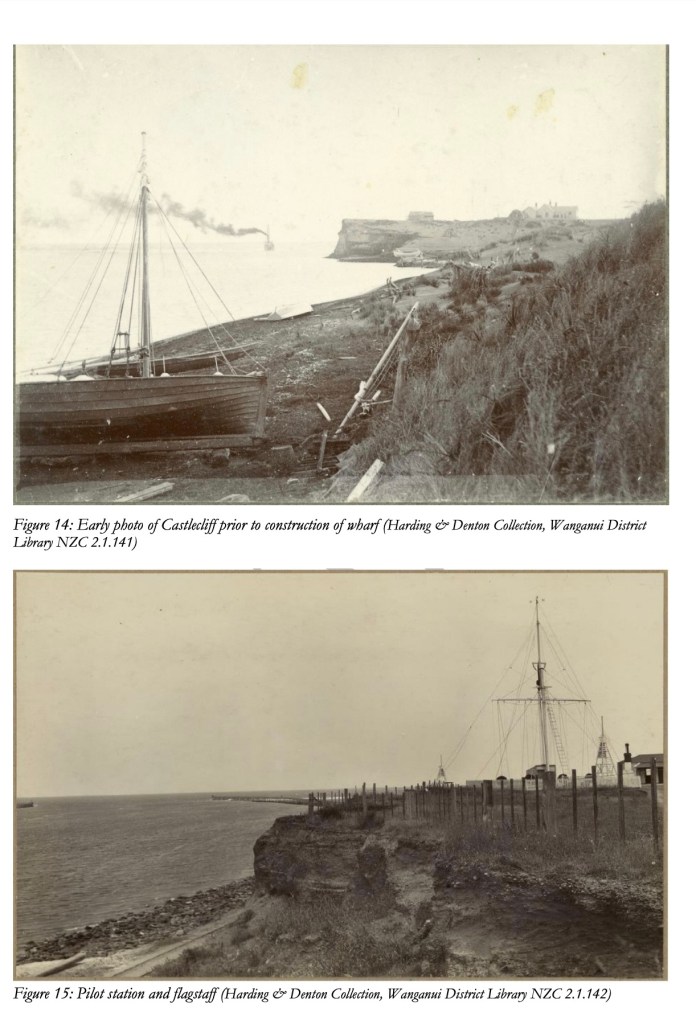
Harriott was unusually brave in that she was the only one in the Styles family who had ever travelled abroad (as far as records show). However this changed in the generation below many nieces and nephews emigrated to North America (see more detail)
There were at least five nephews/nieces that went abroad. Firstly George one of the sons’s of Harriott’s sister Ann Lacey (nee Styles) and One son and three daughters of her brother George Gaviller Styles : William, Mary, Ellen and Catherine.


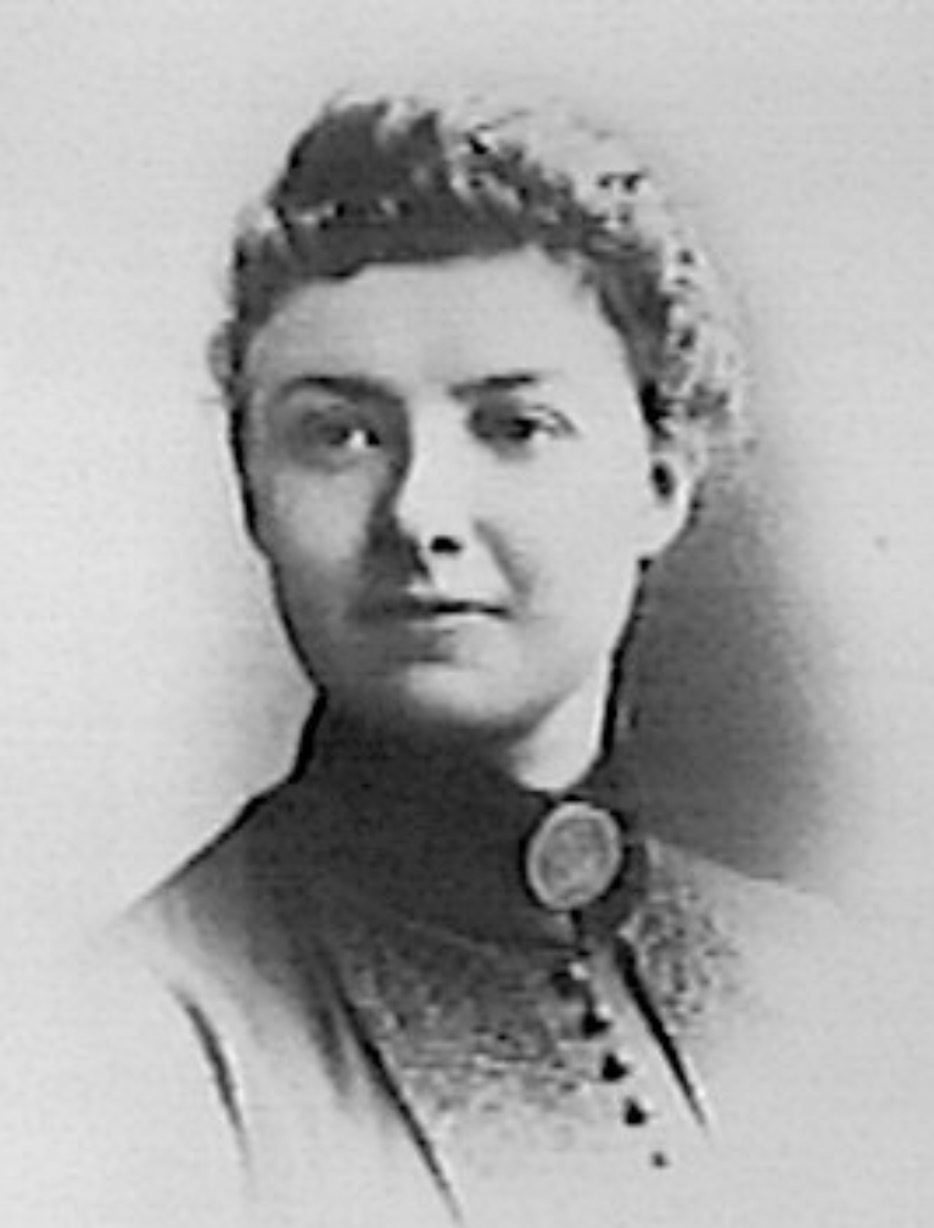

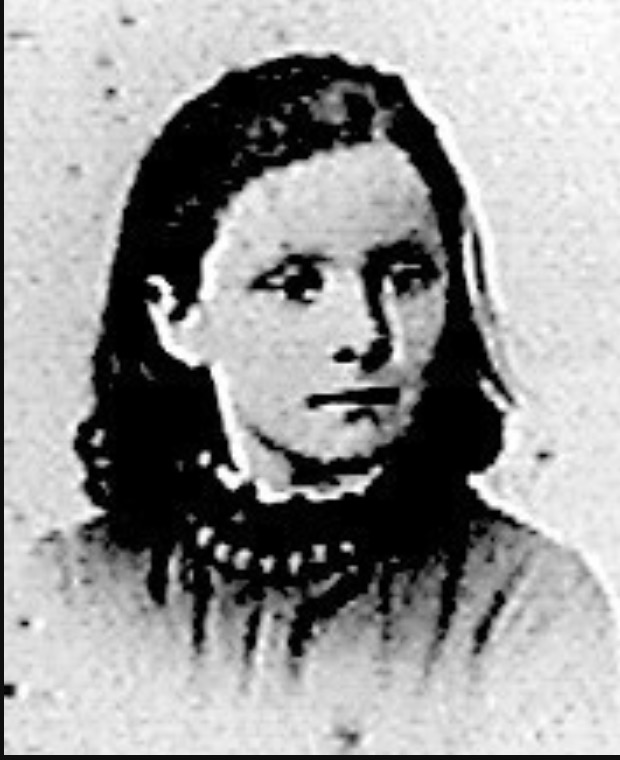
Census records for Harriott from 1841 until just before she died in 1881

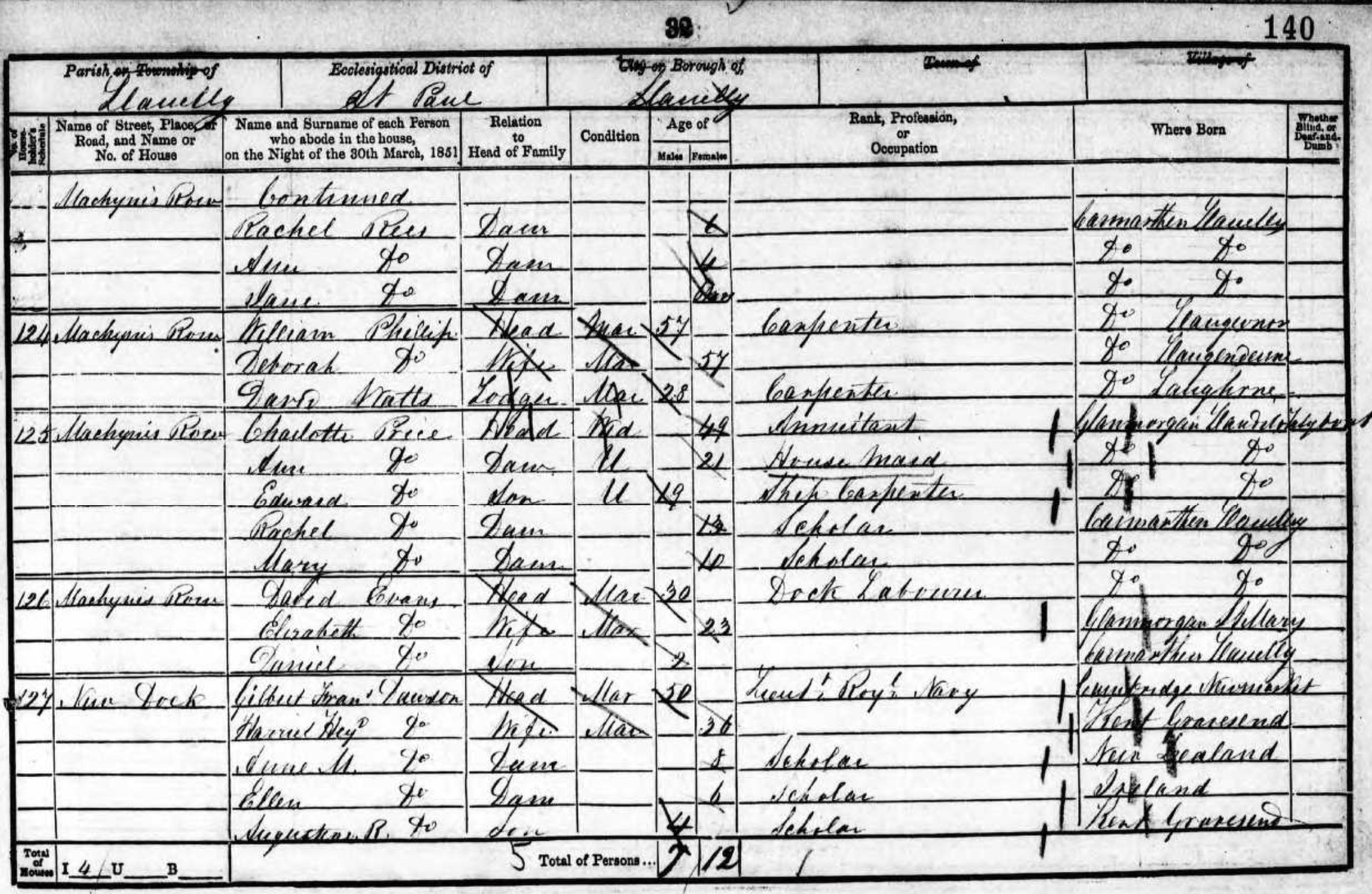







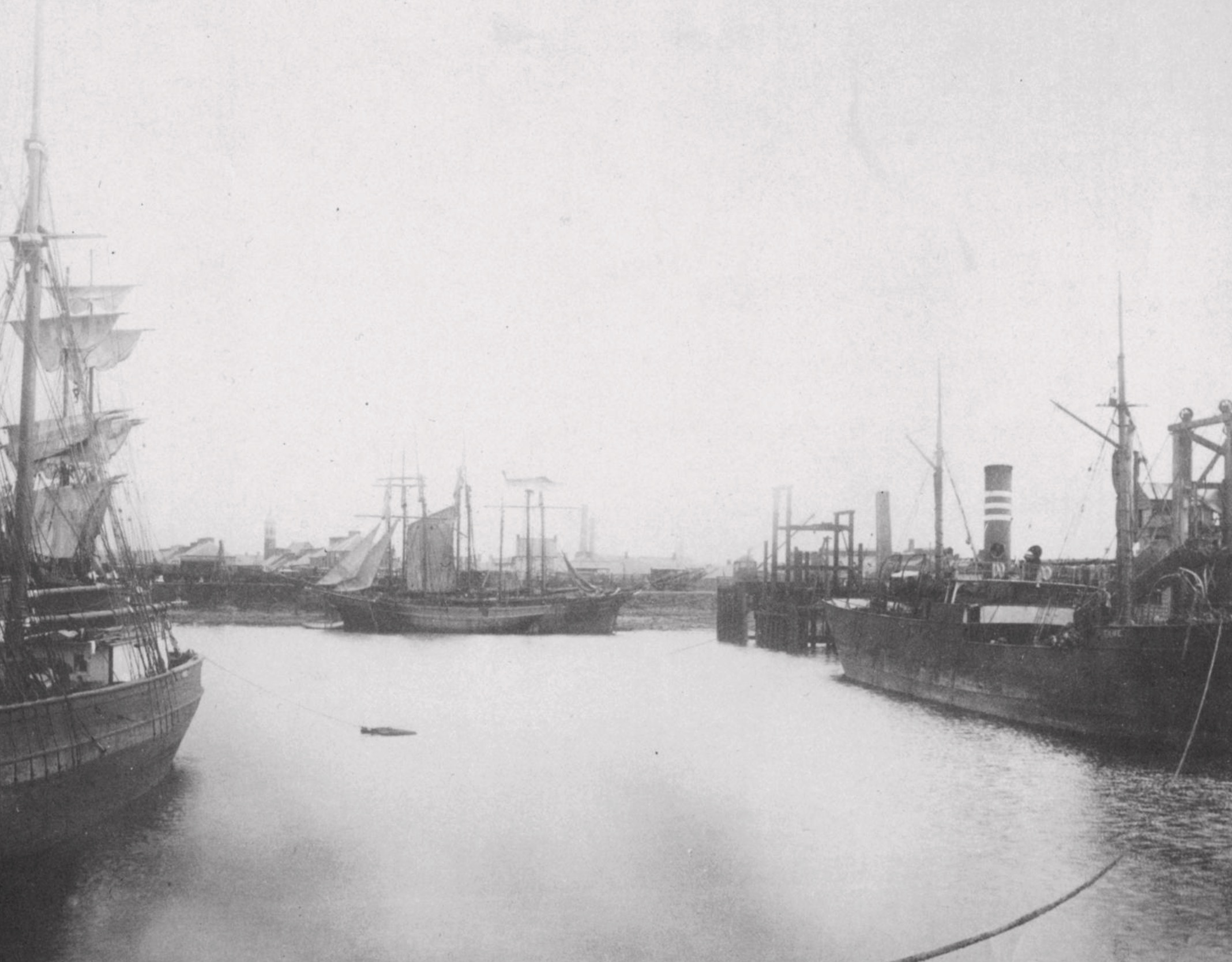
Thanks to the University Library of Queensland for some of the details about Harriott’s journey to New Zealand. And hopefully for sending me account of the boat journey which they have in their archives.
Thanks to the Museum of Whanganui who provided information about Harriott’s arrival and the grounding of the boat opposite Landguard’s bluff from the book by Chappell and Veitch. And also a copy of Harriott and Gilbert’s marriage record from Whanganui – something I never expected to see!
Gilbert
Francis
Dawson
Born: May 1800
Newmarket, Cambridgeshire, England
Died: 1876
Eastbourne, Sussex, England

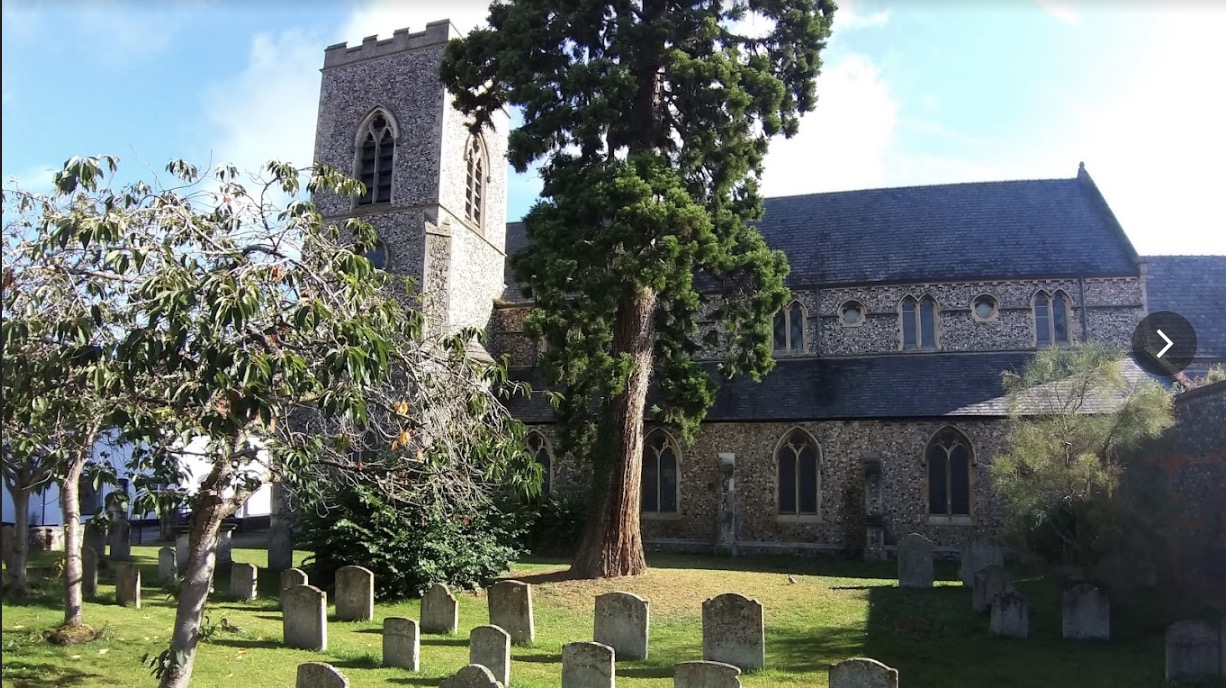
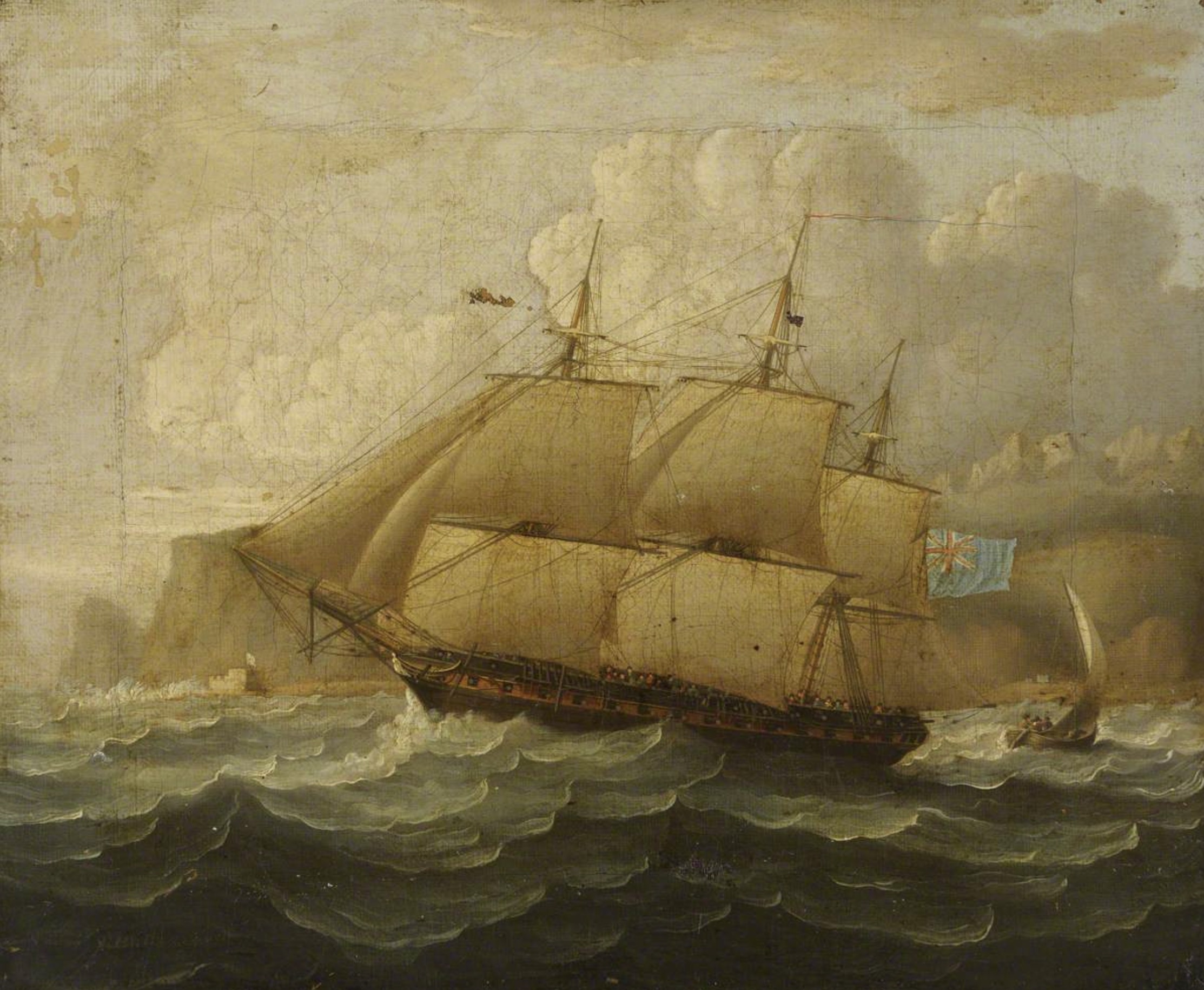



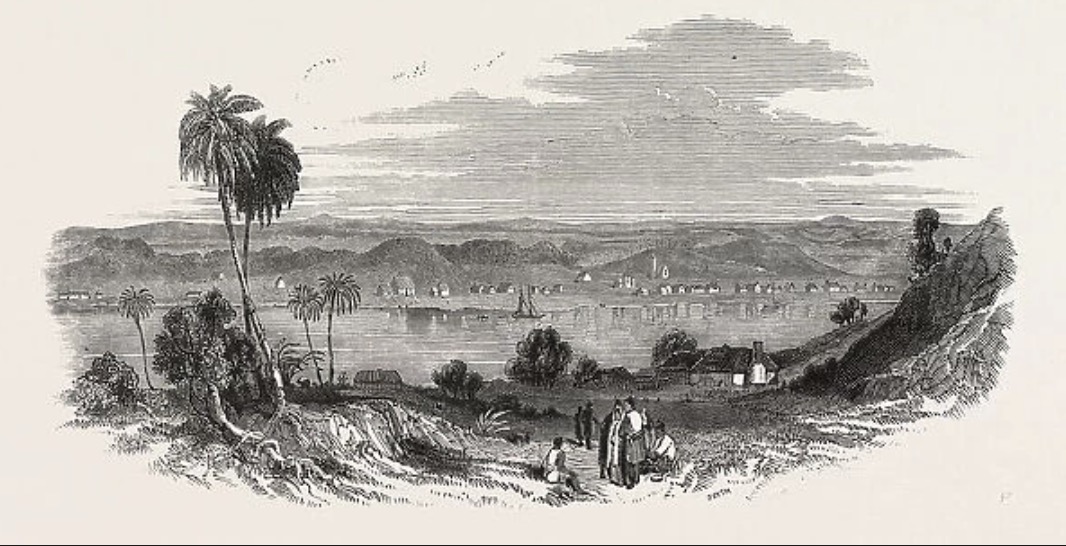
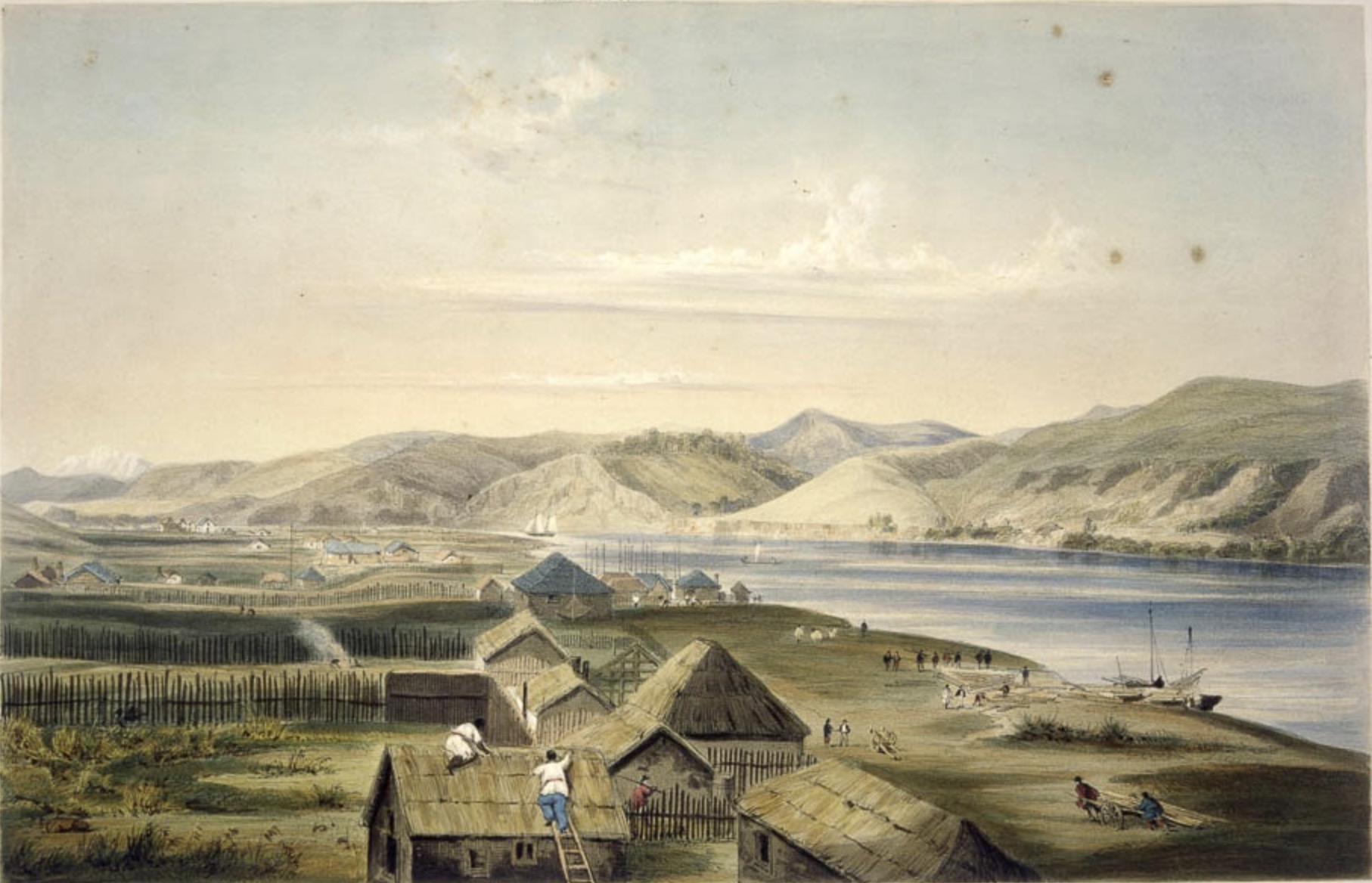
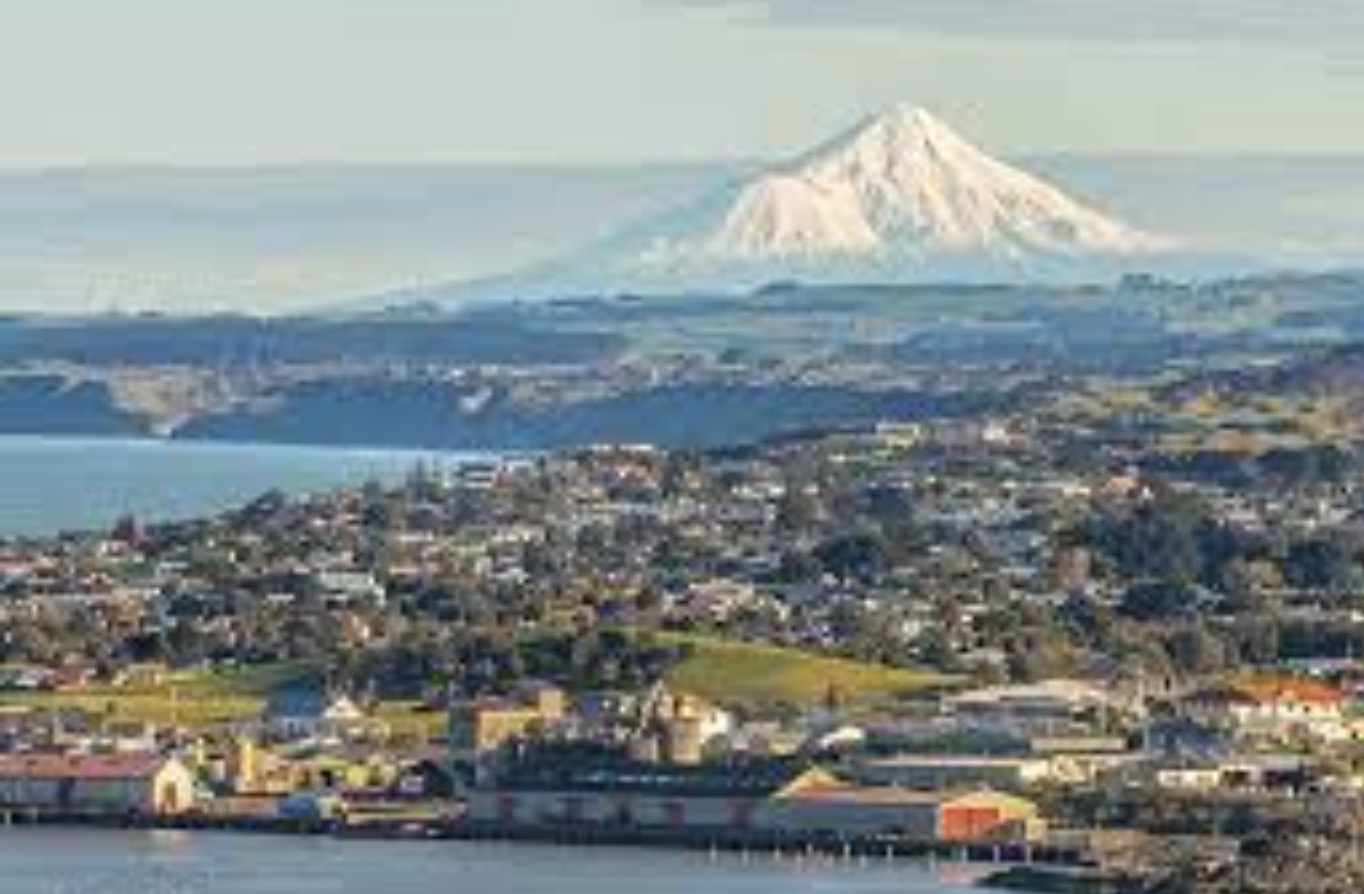



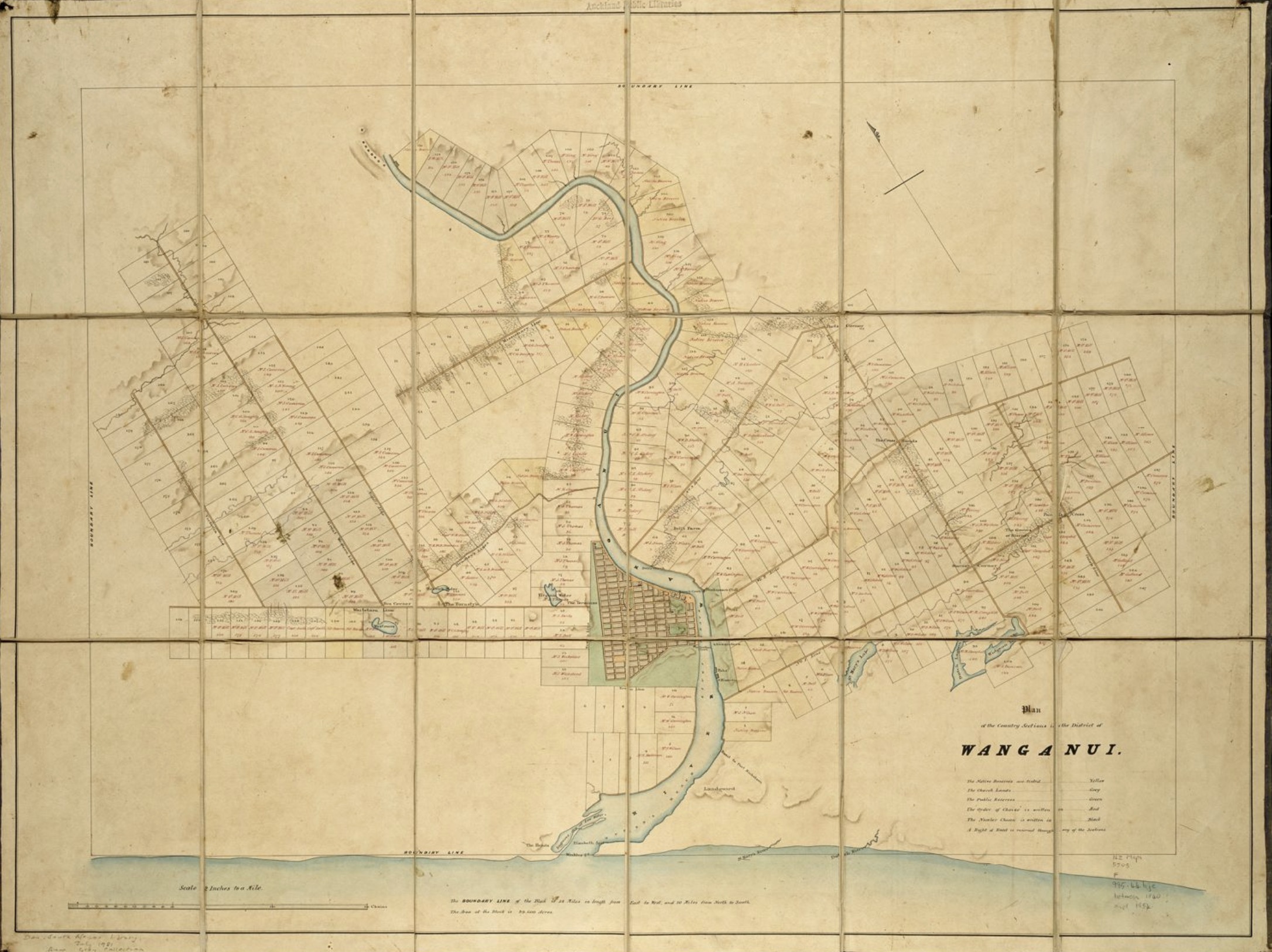
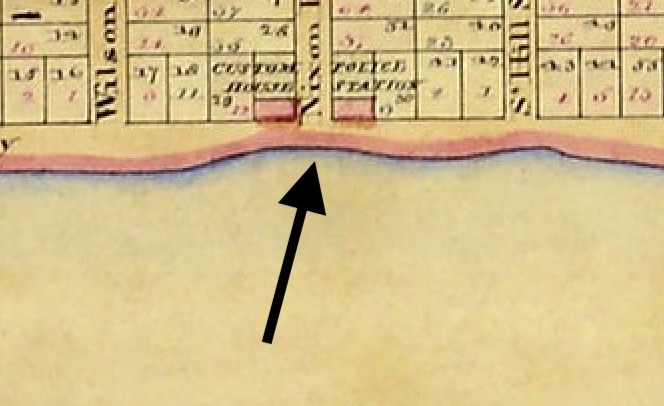


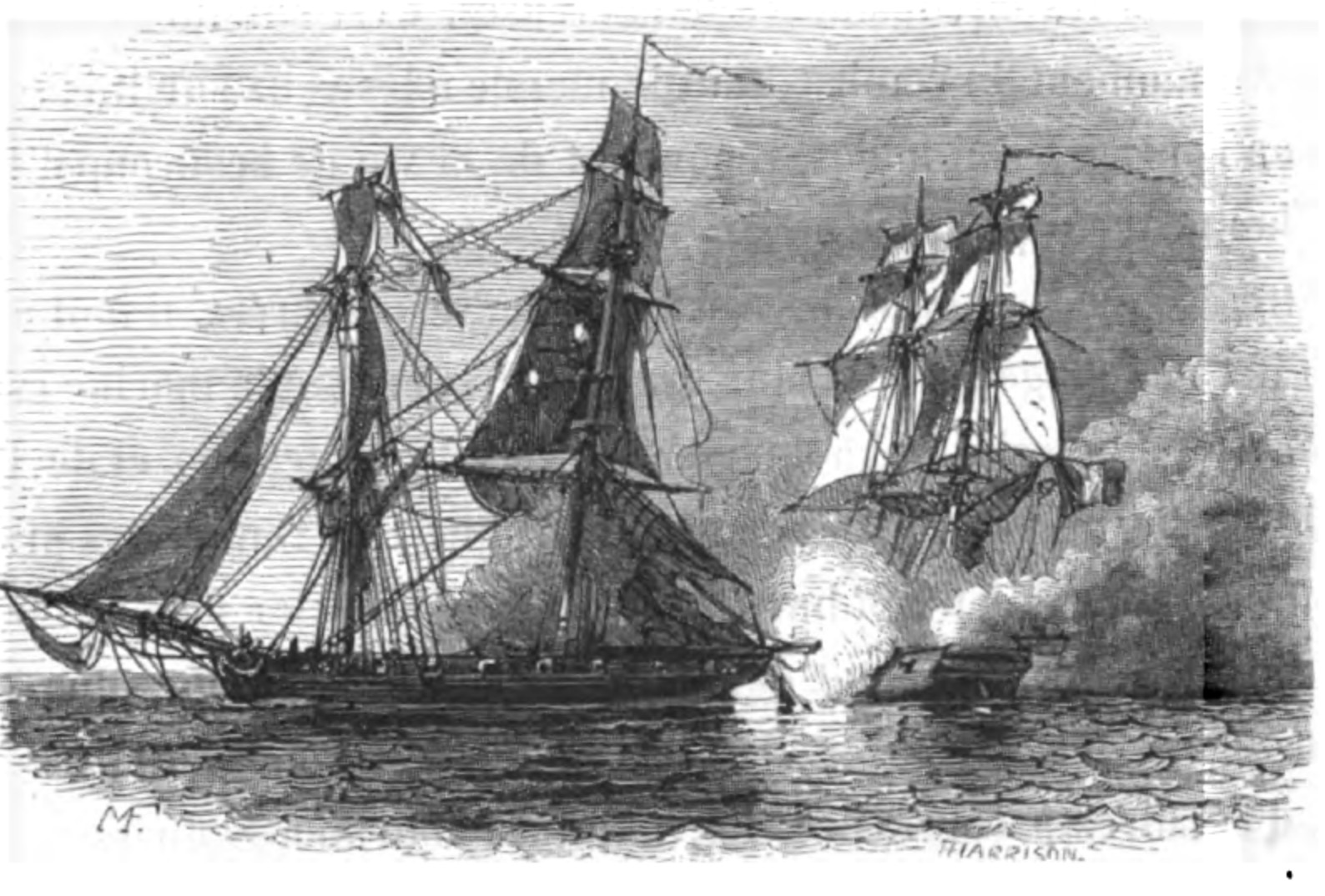
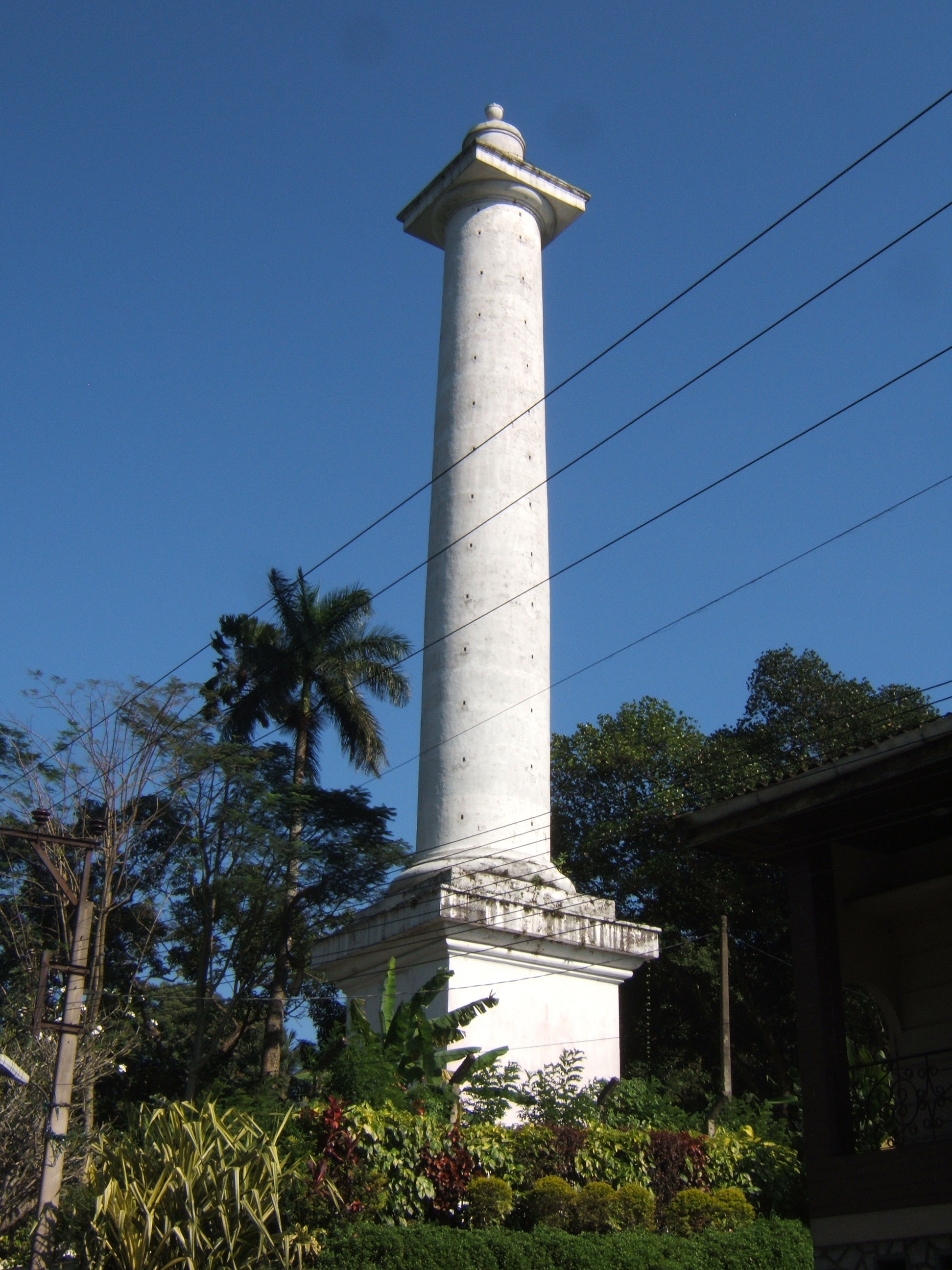


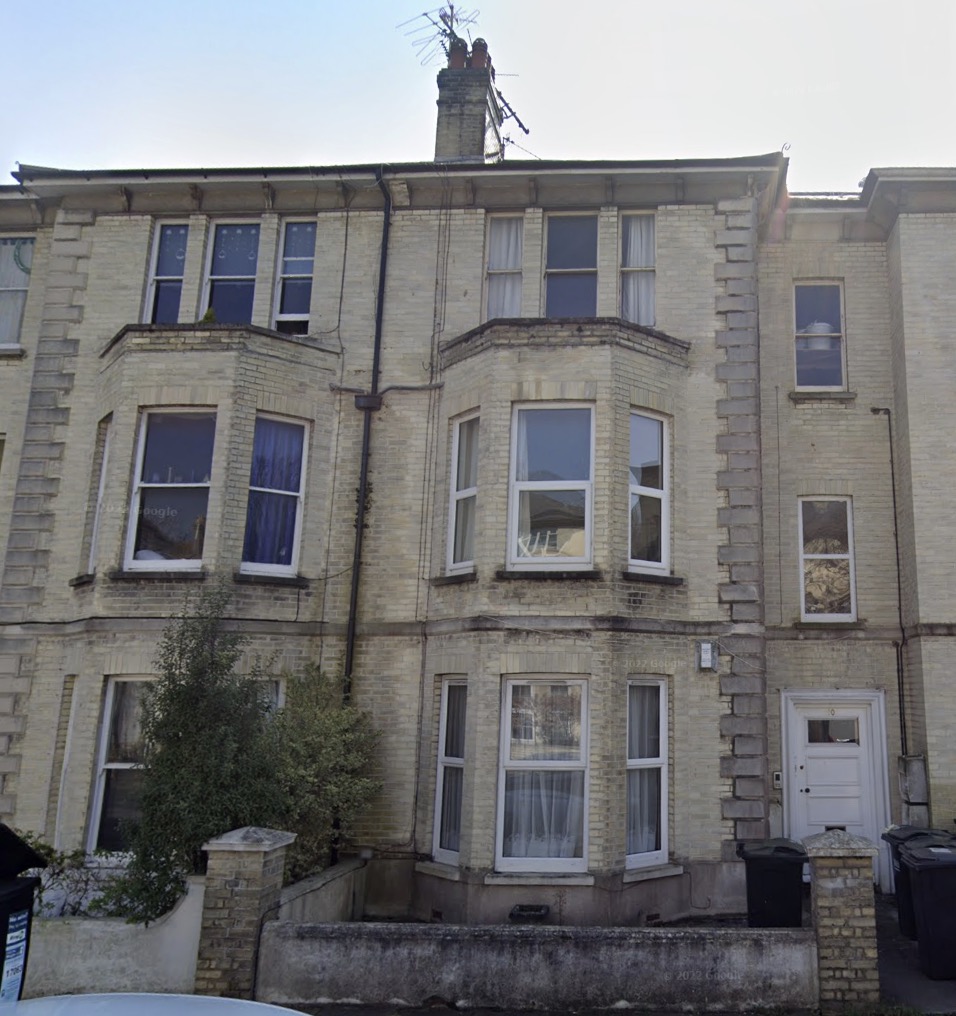
Gilbert Francis Dawson was the 7th son of Francis Dawson and his wife Catherine Frances Thoroton. His father Francis Dawson was born just outside York where his family had a long history. Gilbert’s great great grandfather had been Mayor of York and his great great grandfather was Sheriff of York. So the family were involved in the politics of the town. His mother was from Screveton in Nottinghamshire.
Gilbert decided to follow several of his brothers, and joined the Royal Navy in 1812. 1813 found him aboard the 74 gun ‘ship of the line’ Warspite as a Midshipman, patrolling the east coast of North America during the war of 1812 against the Americans. He was 13 years old.
While on the Warspite he assisted at the captureof the American letter of marque Flash, he served at the blockade of Basque Roads and Brest, and went with General Sir Thomas Brisbane, with the 27th Regiment in a convoy, from Bordeaux to Canada after the Battle of Toulouse.
Gilbert then joined the Iphegenia, under Captain Andrew King, he went on a convoy to Bermuda, and, at the conclusion of the war with America, sailed for the East Indies, where he continued to serve until 1820 in the Conway (28 guns), under Captain John Reynolds. The Conway was employed protecting British trade in the Persian Gulf and in suppressing the slave trade around Mauritius. Slavery had been abolished in 1807 in the UK but was still present in British Colonies until 1838.
In that period he also served on the larger Leander (50 guns), flagship of Hon. Sir Henry Blackwood (his former Captain), where he was actively employed both in the Persian Gulf and the Straits of Malacca.
HMS Leander had seen service in the Napoleonic wars. The Leander also saw action with Admiral Edward Pellew’s fleet at the bombardment of Algiers in 1816, firing over 3,000 round shot and sustaining severe casualties. She spent some time as the flagship on the North American Station, followed by in the East Indies.
Gilbert then joined for a short period the Queen Charlotte bearing the flag of Sir James Hawkins Whitshed, at Portsmouth.
He spent the remainder of his naval career in the West Indies.
On 31 March 1823 he commanded one of the boats of the Thracian when in conjunction with those of the
Tyne, the whole carrying 47 men under the personal command of Walcott. They boarded and captured after an engagementof 45 minutes, the Zaragonzana, a notorious piratical schooner of 13 guns and upward of 70 men. On this occasion Mr Dawson with his own hands took prisoner of the pirate chief, the celebrated Marquis Caytano Arogonez (or Cayetano Aragonés), as the latter, having with others jumped overboard, was wading through the water to the shore.
He was lent by order of Vice Admiral Sir Lawrence W Halsted to the Grecian cutter, for the purpose of commanding a barge
crew. And he then assisted in hunting out and destroying the pirates in the Isle of Pines and other places.
In the execution of this service Mr Dawson, piloted, and sketched and drew plans of the enemy’s different landing places, displayed zeal which was gratefully acknowledged by Lieutenant Cawdey and which obtained for him the approbation also of the Admiral.
He obtained his commission in 1823, and was promoted to First-Lieutenant in 1824. After that he served chiefly on the West Indies station on the Diamond, Bustard, Britomart, Plimrod and Hyacinth.
In 1832, he was invalided home through “chronic rheumatism brought on by long servidtude and exposure to wet in tropical climates” ending his active Naval career.
By this point three of his siblings had died young: two of his brothers and one sister. His brother Commander John Francis Dawson whilst under command of part of the British Flotilla in the Burmese war in 1825 (aged 34). Another brother Captain William Francis Dawson a Royal Engineer died in Sri Lanka in 1829 (aged 38) of Dysentry. His sister Catherine had died aged 28 in Hampton court. Her husband Charles Fauquier had been disgraced in Malta for embezzling funds. He remarried in Greece and a second family. Two of Catherine and Charles children died young. However the remaining children were unaware that their father was still alive and went to live with various Dawson relatives in Canada. They only discovered their half siblings existance in the 1980’s.
On leaving the navy Gilbert joined his brother, George Francis Dawson, who was Reverend, St. James’s Church, on the Channel Island of Guernsey.
While there, he met and married Margaret Jane Paddock in 1832 on the Channel Island of Jersey. They had two children, both boys. Unfortunately she passed away in 1836, she was pregnant with their third child who did not survive and is buried with his mother. Gilbert spent the next few years as a widow working on various steamboats and ships. Possibly he was based in Gravesend and perhaps this is where he met the Styles family, perhaps the family were asked to help look after the two young boys.
In 1840 Gilbert headed for New Zealand – leaving the boys on the Styles farm in Gravesend. It seems likely that he already knew Harriott and perhaps had even already proposed to her as she and the boys followed him to New Zealand about a year later.
Gilbert landed in New Zealand at the Bay of Islands from the ship Diane on the 28th November 1840. He was appointed magistrate at Russell and moved to Auckland in early 1840 where he was again appointed Magistrate. In April 1841 it was announced that he had been appointed to work with Michael Murphy as a magistrate for Wellington.
He landed in Wellington in August 1841. But was soon moved on to work in a brand new settlement at Petre, which was later called Wanganui and finally Whanganui. He was appointed Magistrate of Police and not long later Justice of the Peace.
Apparently he built a straw built residence on the river bank which he designated government house. According to Wakefield another pominent settler he “followed the pompous example of brother officials … and strutted about in a manner truly ridiculous”. Wakefield really did not like him.
Unfortunately Gilbert’s work as a Justice of the peace did not find favour with the powerful organization “The New Zealand company” who were trying to negotiate land rights with the Maori community. He was too vocal in defence of the Maori people who the company was illegally taking rights to land from. So just before he was married in 1841 a rumour was spread about Gilbert behaving inappropriately with some of the soldiers in Whanganui which caused something of a scandal.
Despite all this the couple were married in November 1841. In October 1842, they had the first of nine children, a girl, born in New Zealand.
Unfortunately the scandals surrounding Gilbert and another Police Magistrate in Wellington Michael Murphy made the newspapers. Gilbert and Michael eventually both lost their jobs. The letter to Gilbert from the Colonial secretary on the 20th January 1843 said that “as had not cleared character accusations his services no longer of benefit to public, duties to cease on receipt of this letter”.
New Zealand historian Richard Hill (and others) is fairly convinced that this was entirely related to “The New Zealand company” wanting to get them out of the way. Gilbert fought the allegations from Wellington. In July 1843 there was a large earthquake in Wanganui I am not sure where the family were at that point. Six months later Gilbert eventually gave up his fight to clear his name and went back to Europe in January 1844.
Longer term this dispute over land in Wanganui resulted in a war with the local Maori community who far outnumbered them and by 1847 the settlers started to build fortified home’s with wooden pallisade fences around them. It seems that Gilbert and Michael Murphy’s approach might have been a better long term solution for the area and Richard Hill (1997) writes that their more collaborative approach was ultimately vindicated.
In something of a contrast we know from Slave reparations work done at University College London that at about this time Gilbert received a sum of money in relation to some slaves in Jamaica. The sum was £24 equivalent to close to £4000 pounds in real terms for the time. It was part of sum that was divided up between 7 people. The other people are the brother of his first wife and several of her Paddock in laws. So this was money he inherited by virtue of being married to Margaret Paddock.
Gilbert had worked in the West Indies so we cannot say he did not understand what slavery was. Equally we do not know what he did with the money. A charitable view would say that someone who stood up for the Maori community on principle and had spent much of his career fighting slave traders and pirates he would not have wanted to benefit from slavery in this way. But equally I imagine at that particular point they were in need of funds to pay for the family to get away from New Zealand and start again in Europe. So who really knows what he chose to do with that money. Records do not tell us.
It is a sad truth that many many ordinary people in the UK did have investment money in the slave trade at that time as the UCL research has so admirably demonstrated. The UCL site is well worth exploring even if it is uncomfortable reading for many white British families. It shows that a sizable percentage of middle class and a larger percentage of upper class families in the early 1800s in the UK had some form of financial interest the slave trade www.ucl.ac.uk/lbs/
To return to the Dawson family in October 1844 the couples second child, a girl, was born in Cork, Ireland. In 1846 their third child and first born boy was born in Gravesend, England. The remaining six of their children were born in Llanelly, Wales, where Gilbert had charge of the new coal docks and also was involved with the Llanelli rail company.
In 1860 they returned to the south east of England, eventually settling in Eastborne, where they lived out their retirement. Gilbert died there in 1876 at the age of 76.
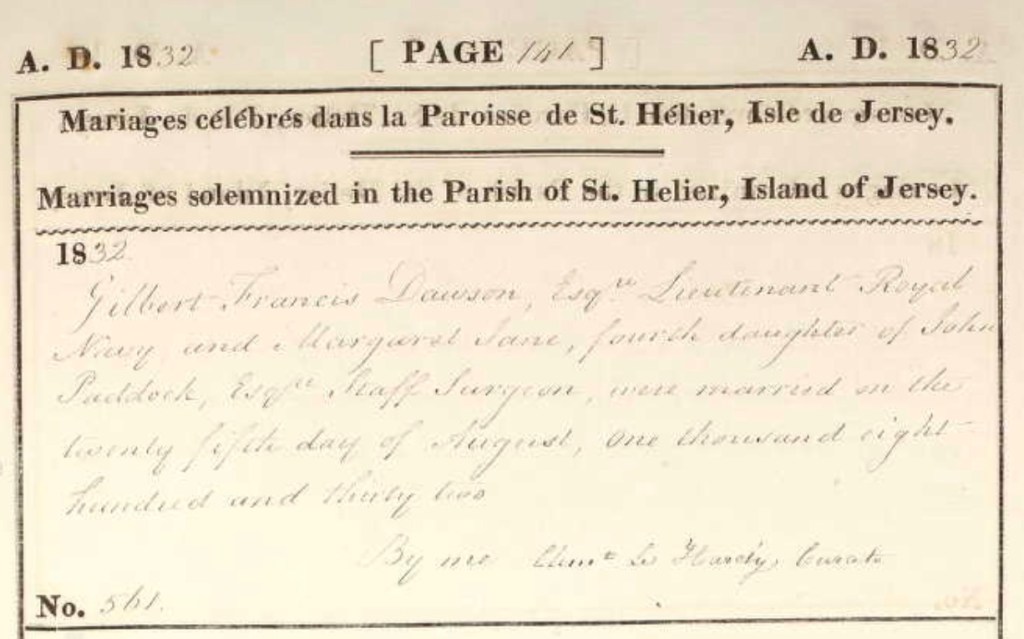
Details of Gilbert’s Naval Career
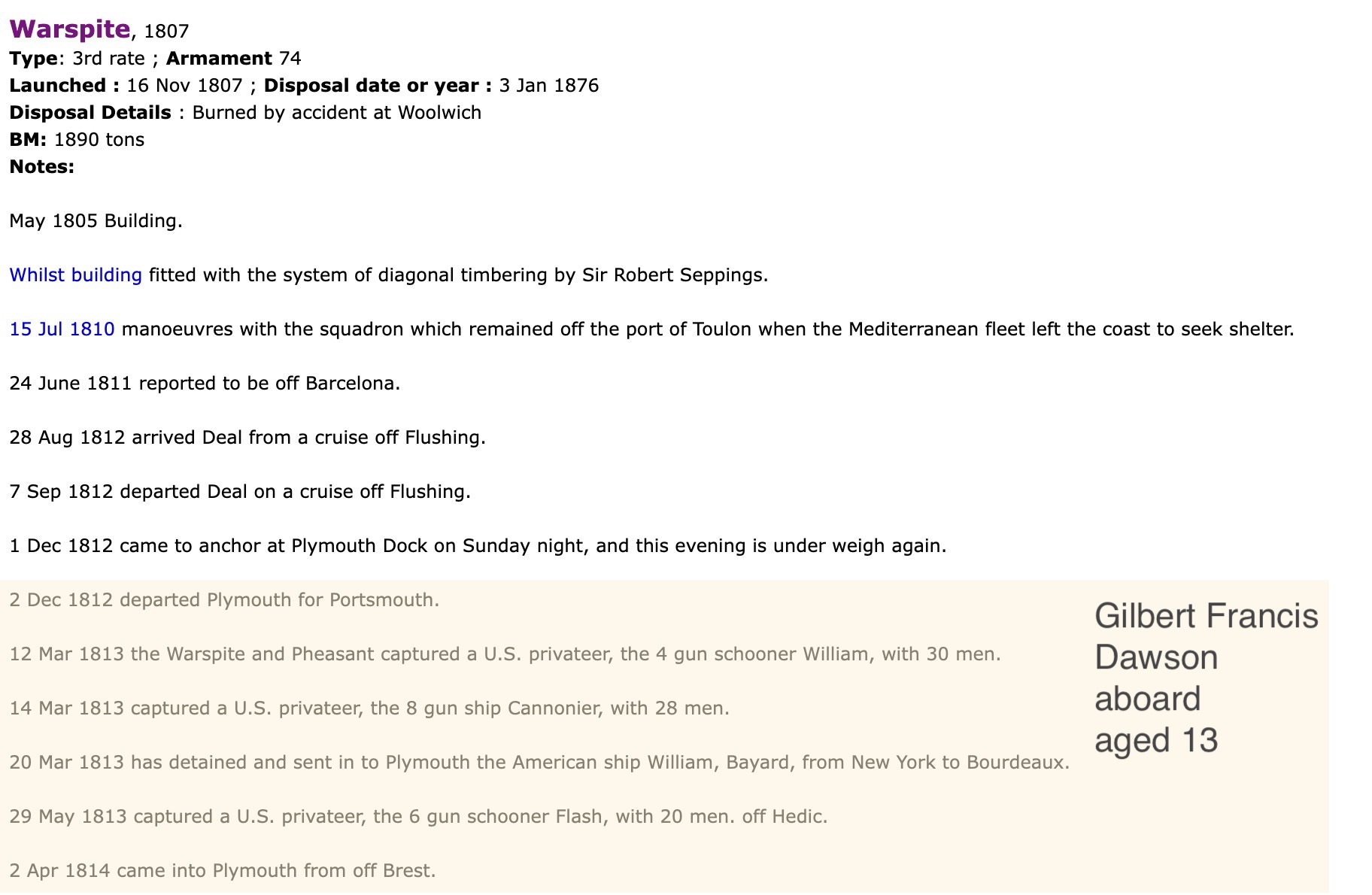

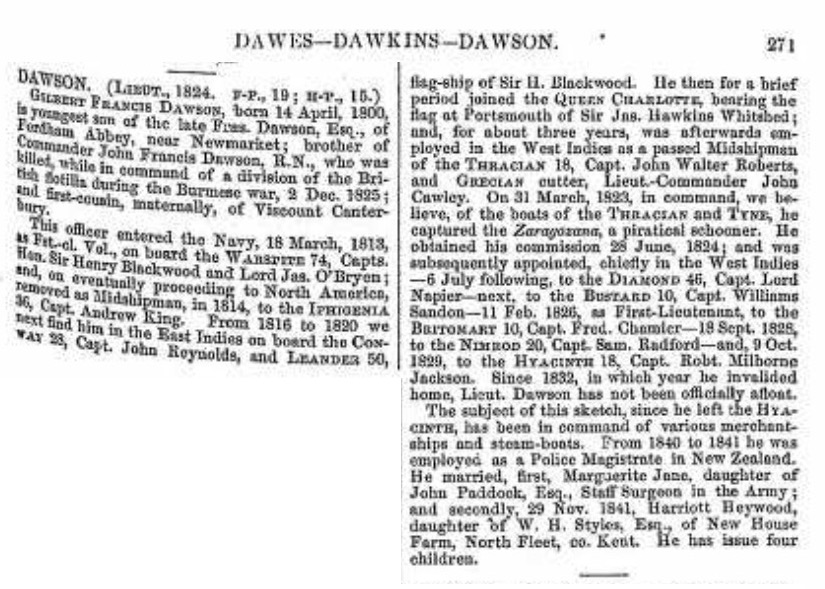


A detailed biography provided by the museum in Whanganui:

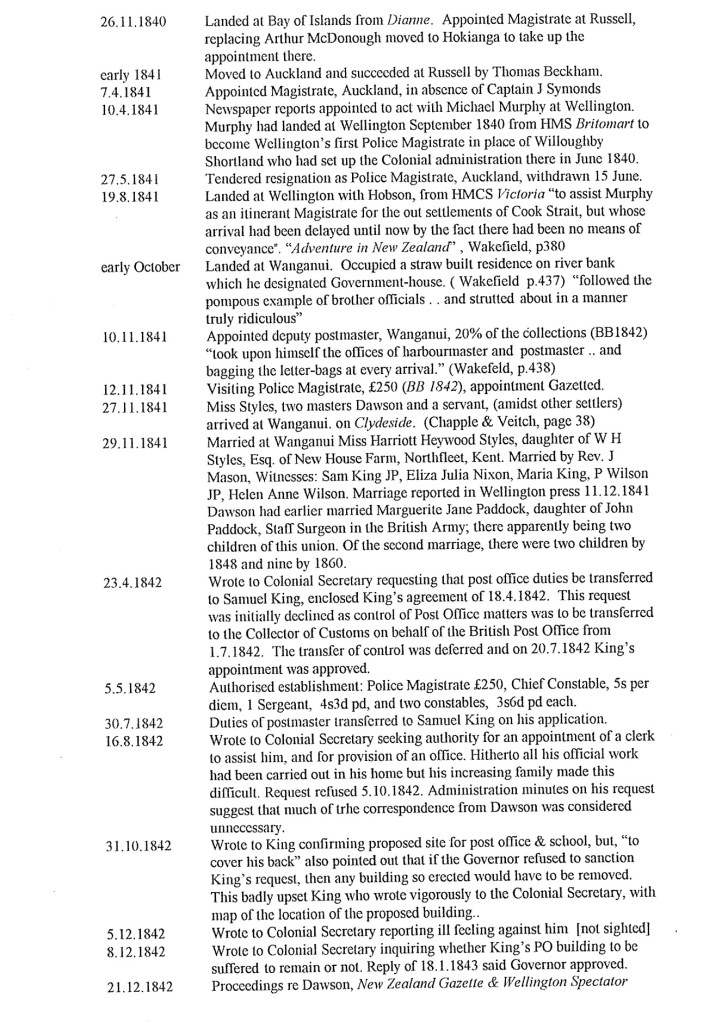

Details about the Capture of the Marquis Cayatano Arogonez (or Cayetano Aragonés) captain of the Zaragozana (later the HMS Renegade) reported as being captured by Gilbert Dawson’s own hands as he tried to escape from the pirate ship.
From the Wikipedia Entry on HMS Renegade:
“Zaragozana
Zaragozana may originally have been a slaver, or a privateer. A slave ship named Zaragozana, Brooks, master, sailed from Bristol, Rhode Island, and on 15 November 1815 arrived at Havana from Africa with 204 slaves.[4]
On 18 November 1816 the Spanish guarda costa Valencey, Captain Varines, together with the schooner Zaragozana, arrived at the wreck of HMS Tay on the east side of Scorpion Reef (Spanish: Arrecife Alacranes; 22°26′N 89°40′W). After the Spaniards had verified that all the crew were safely on Crane’s Island, they proceeded to demand, at gunpoint, that Captain Roberts and his crew surrender and deliver over their arms and any specie on board Tay. Roberts surrendered, declaring he and his men “prisoners of war”, a status the Spaniards acknowledged. They then proceeded to loot Tay of her stores and provisions. The Spaniards also recovered about $350,000 in specie.[5] (An early report of her loss stated that Tay had $2 million in specie on board.[6] Zaragozana then took off Tay‘s complement.[5]
Some records report that a Zaragozana, of five guns and 75 men, was one of four privateers under the Spanish flag that the Consulado of Havana fitted out in 1817.[7] Between 1821 and 1824, as one officer of the Royal Navy put it, Cuba became a “grand depot of piracy”.[8]
In the battle the USS Alligator attacked some pirate schooners and their prizes. In the short, but sharp, fight, Alligator lost her commanding officer, Lieutenant William H. Allen, wounded mortally by two musket balls. Soon thereafter, boats from Alligator captured all the pirate vessels except one schooner that managed to escape. The pirate vessel may have been Zaragozana. Her captain, Cayatano Arogonez (or Cayetano Aragonés), boasted after his capture that it was he who had killed Lieutenant Allen.[9]
On 10 February 1823 Saragozana entered the port of Nuevitas and there took the American schooners Lady’s Delight, of Baltimore, and Lively, of Philadelphia. The pirates treated the masters and crews badly before permitting them to go ashore, destitute.[10]
In March 1823 Admiral Sir Charles Rowley ordered HMS Tyne and Thracian to search for Zaragozana. The two cruized for some 400 miles along the coast of Cuba. On an island in the harbour of Nerangos they found 1100 casks of wine and spirits that pirates had looted from vessels they had captured.[a]
On 31 March Tyne, under Captain John Edward Walcott and Thracian, under Commander John Walter Roberts, were off Baracoa when they saw Zaragozana. Walcott immediately had both men-of-war disguise themselves as merchant vessels by setting their sails in a slovenly manner, and sailing casually towards the schooner. The subterfuge worked for three hours, but then the schooner hurried towards the harbour of Mata. The British abandoned their subterfuge and set off in chase under full sail.[11]
At 1:30p.m. Zaragozana anchored with her broadside facing the entrance to the harbour. Captain Arogonez had also landed some of his men, armed with small arms, who took up position in the trees close to the shore of the harbour. Walcott decided to send in four boats from his ships to attack the schooner. He took command of the boats, which held 47 men in all. At 3pm the boats were within gunshot of Zaragozana, which opened fire, as did the men on shore. It took about three-quarters of an hour for the British boats to reach Zaragozana, having endured the fire from the schooner and shore all the way. As the British boarded Zaragozana, some of the pirates fled ashore. Even so, the British took 29 prisoners, including Arogonez.[11]
British casualties amounted to one man killed and five wounded. The pirates lost 10 men killed and 15 wounded. Troops that the Governor of Baracoa had sent captured 16 pirates that had escaped to shore.[12] The British took their prisoners with them to Port Royal, where they arrived on 9 April. The initial report in Lloyd’s List gave British casualties as three killed and six wounded. It described Zaragozana as being of 130–140 ton (bm), armed with one 18-pounder and three 9-pounde guns, and six swivel guns, and having a crew of 80–90 men. The report further stated that Zaragozana had previously captured a French vessel carrying wine. One hundred casks were on board Tyne and Thracian, as well as some 700–800 casks that had been found on shore.[13]
Arogonez and 23 of the pirates were tried and hanged on 22 and 23 May on Gallows Point. Walcott also reported that the Governor of Baracoa had stated that he would deal with the men his troops had captured.[12]
The Royal Navy took Zaragozana into service as the 4-gun schooner HMS Renegade.[b]“
Details of Gilbert’s dismissal in Wangarui in 1842
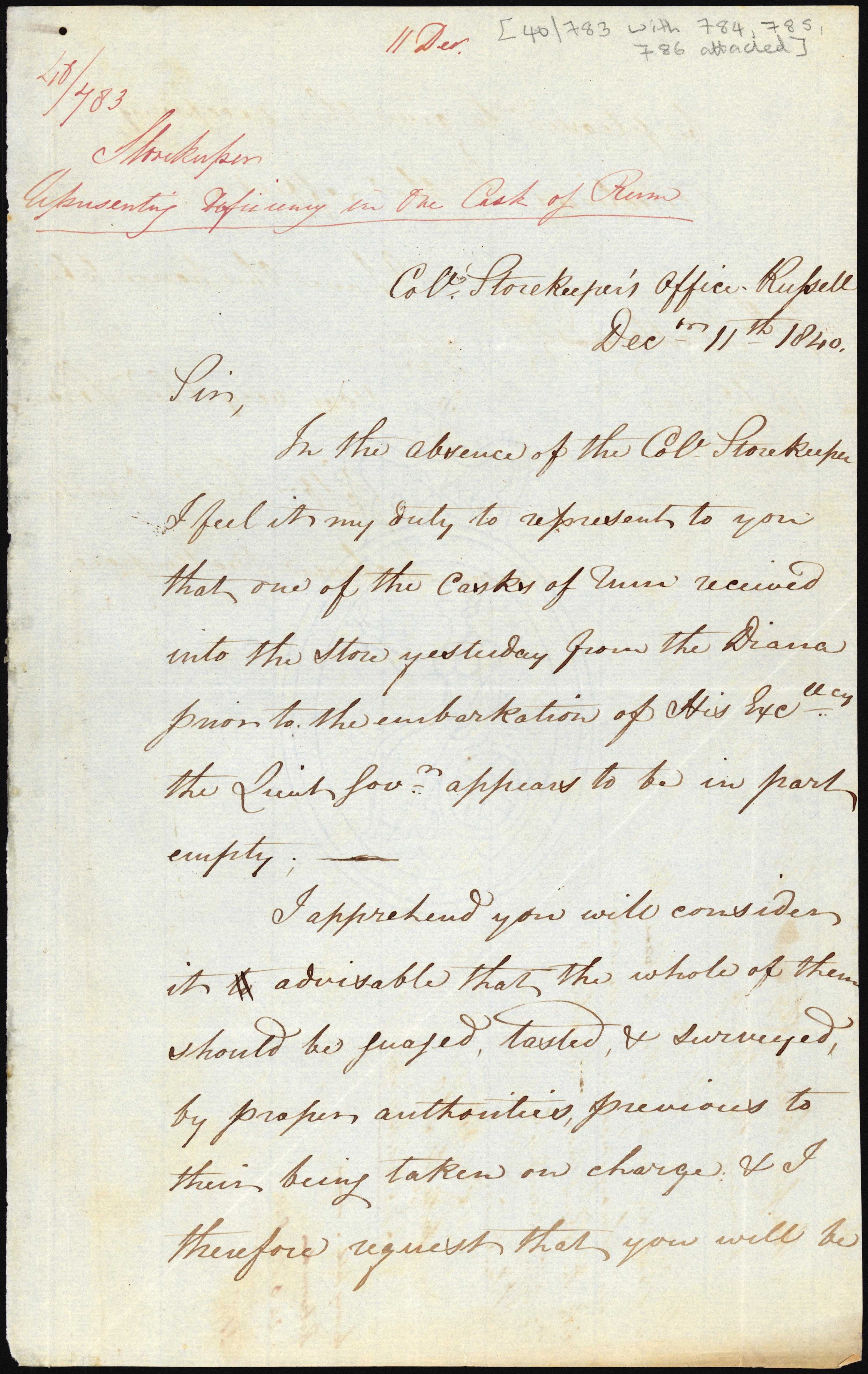







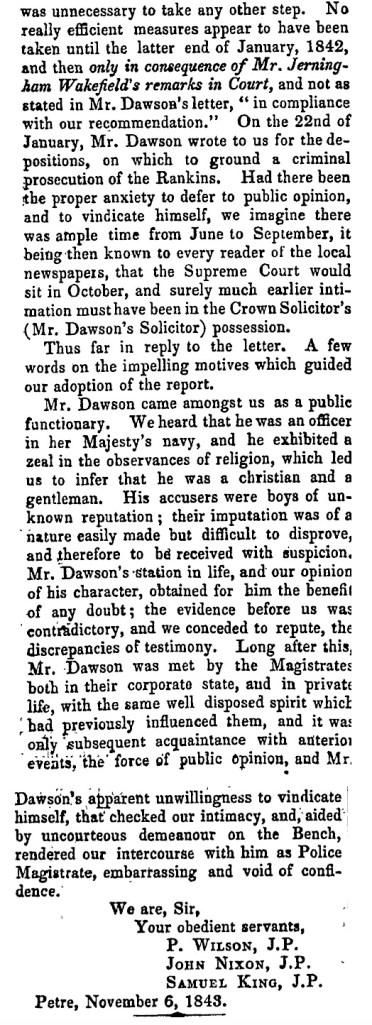
Below is an article explaining Richard Hill’s theory that in fact the rumours were indeed slander put about by the New Zealand company.





Details of Gilbert’s Slave Reparations in 1844
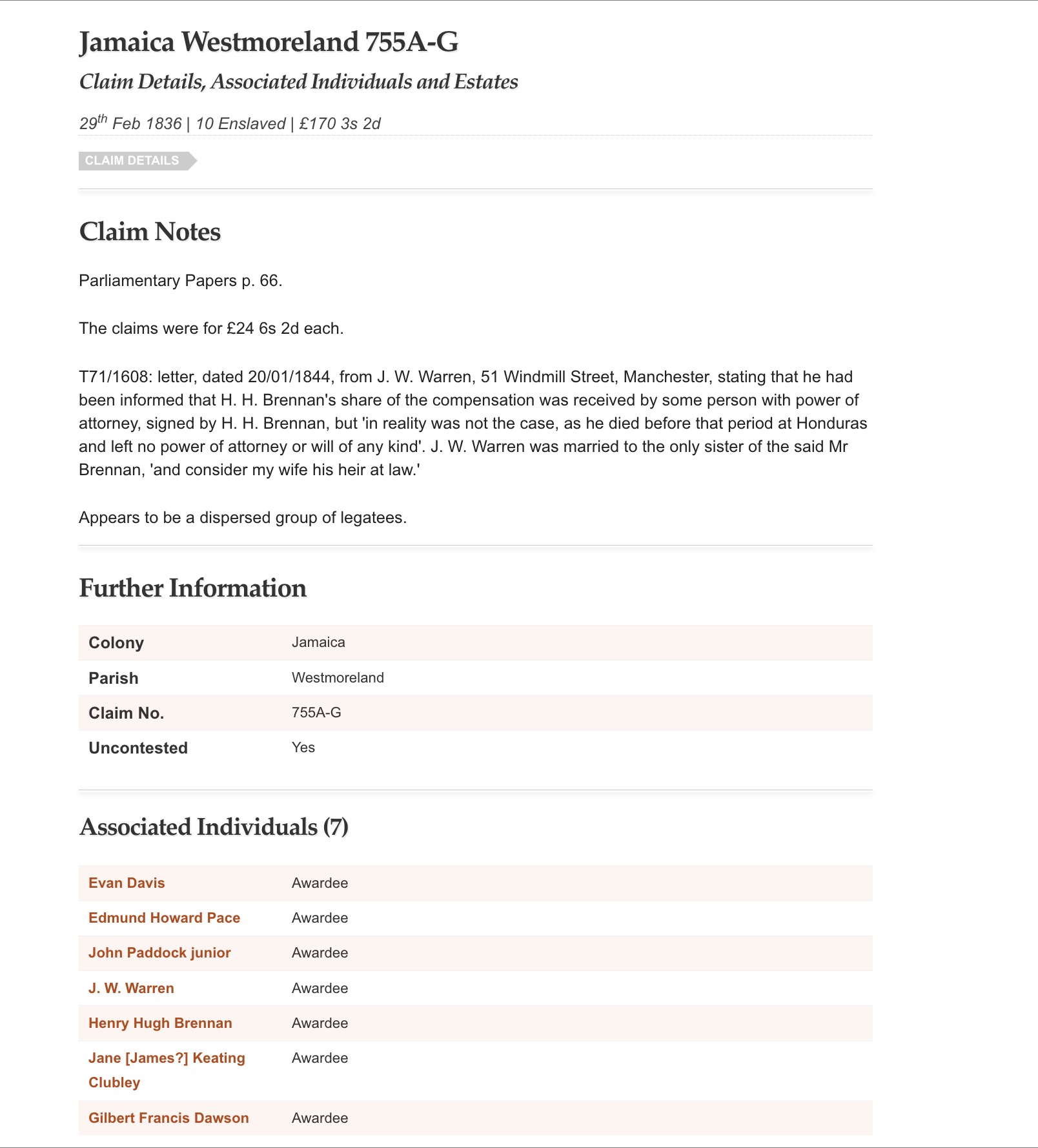

Gilbert’s eldest brother was Chaplain to the House of Commons. He was known as Reverand Francis Dawson although christened Thomas. He and his wife had a house in Beccles at one point.
Some details of some of his other siblings are given below.
Details of Gilbert’s brother Commander John Francis Dawson – who died in the Burmese war of 1825 on board the ship Arachne (died aged 34)
The Arachne lies underwater just off the coast of Australia
https://www.environment.gov.au/shipwreck/public/wreck/wreck.do?key=5204
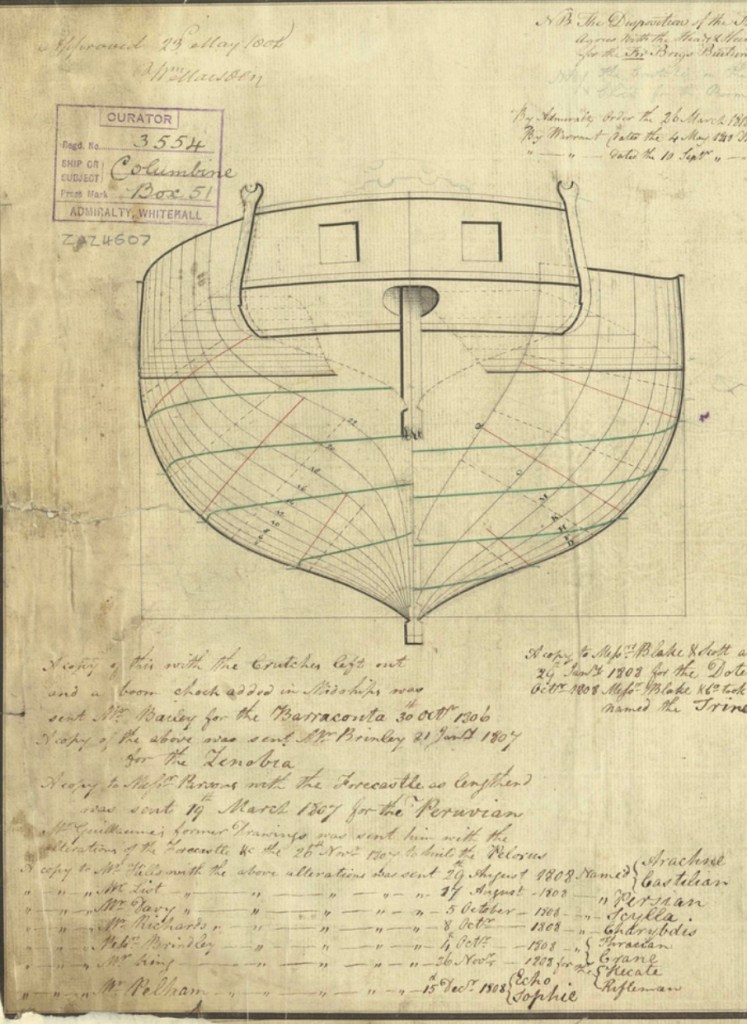
Here is how the website describes her and the battle in which Commander John Francis Dawson was lost in 1825:
“The whaling barque Arachne was originally built as HMS Arachne, an 18 gun brig sloop of the Cruiser Class (two x 6 pwd long guns and 16 x 32 pwd carronades, 121 men). It was ordered in 1806, the keel laid September 1808, and launched from Hills Yard at Sandwich on 18th February 1809. The name Arachne originated from Greek mythology about a Lydian maiden who challenged the goddess Athena to a weaving contest and was punished for her presumption by being turned into a spider.
Built on a 1796 design, the Cruiser Class was identical to the Snake and Favourite Class of sloops, apart from the masts and an extra section inserted amidships to give extra length. These were by far the most numerous class of warships built during the age of sail. In 1824 the Arachne was converted to a ship sloop. Sexton says in his Appendix: ‘Note that the topsides were later raised’. The National Maritime Museum in Greenwich holds profile and deck plans of the Arachne in 1830 as a ship sloop (A/F 1830-3179).
HMS Arachne saw operations in the Burmese War between 1824-26, having been dispatched from England under Commander Henry Ducie Chads for the East India station. On the Arachne’s arrival on 11 September 1824 Commander Chad immediately took naval command in the Rangoon River, which saw the Arachne significantly involved in the defence of Kemmendine in 1824, operations in the Irrawaddy in 1824-25, and major action at Nepadee Ridge in 1825-26. Chads transferred to HMS Alligator on 7th November 1825, replacing Captain Alexander who had died, and the command of the Arachne was taken by Commander John Francis Dawson. Commander Dawson fell in the fighting of 2nd December at Nepadee Ridge, and was succeeded in his command by Lieutenant Andrew Baird of HMS Boadicea. Following this engagement a treaty was signed on 3rd January 1826 but unfortunately it did not last.
Hostilities resumed on 19th January, lasting until a definitive treaty was signed on 24th February. By 6th May 1826 the whole force had returned to Rangoon and been broken up. The Admiralty, East India Company and both House of Parliament expressed their appreciation for the zeal and gallantry displayed by the naval contingent during a most arduous and difficult conquest, and one which could only be effected by men expert in the various problems of river warfare. In 1851 a medal known as “India No. 1” with the clasp “Ava” was distributed to surviving Navy officers and men who had served in the Burmese War. The Royal Navy logbooks from HMS Arachne are held in the Public Records Office, London.”

Details of Gilbert’s brother Captain William Francis Dawson – Royal Engineer who died in Sri Lanka in 1828 (died at 38)
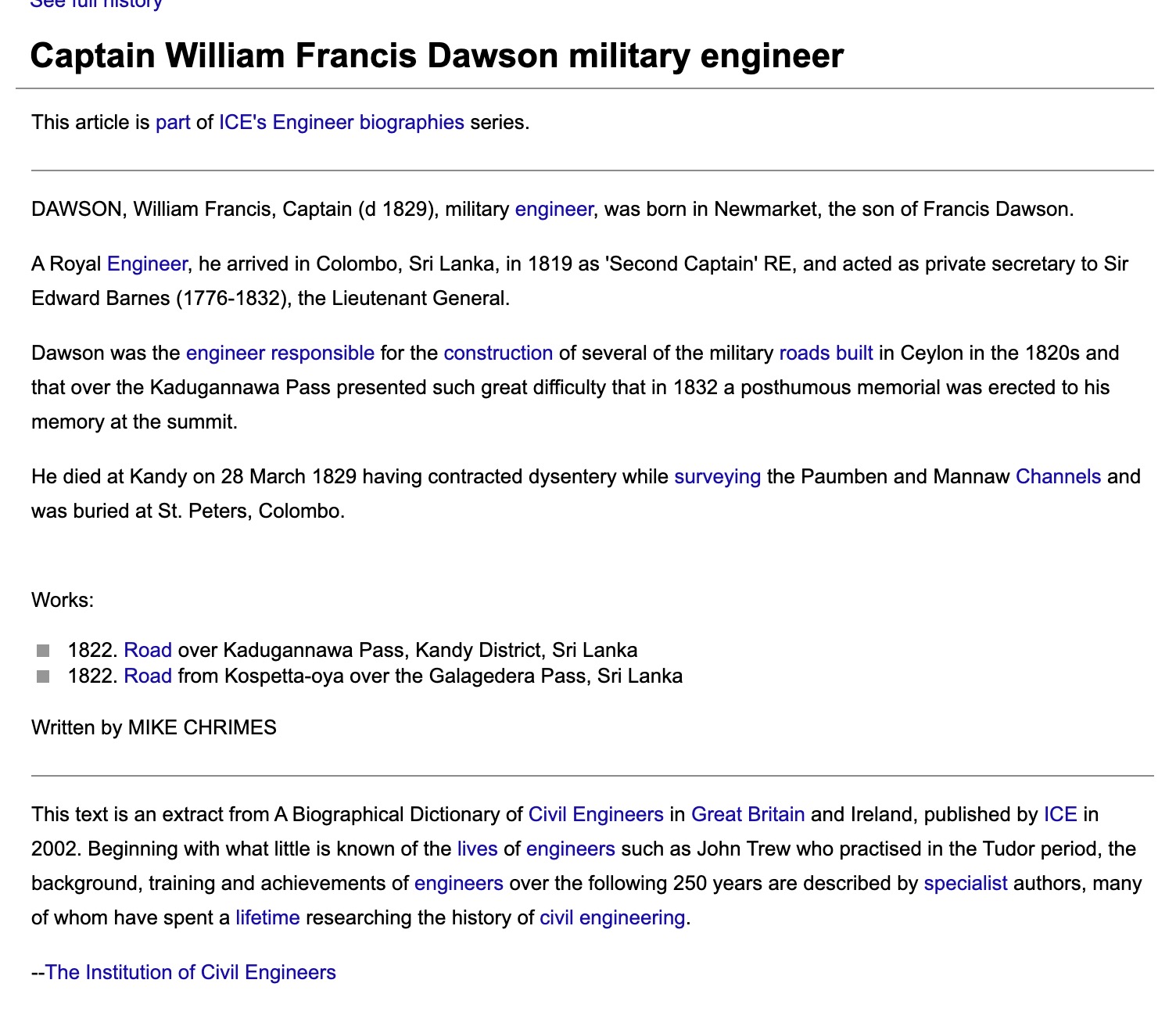

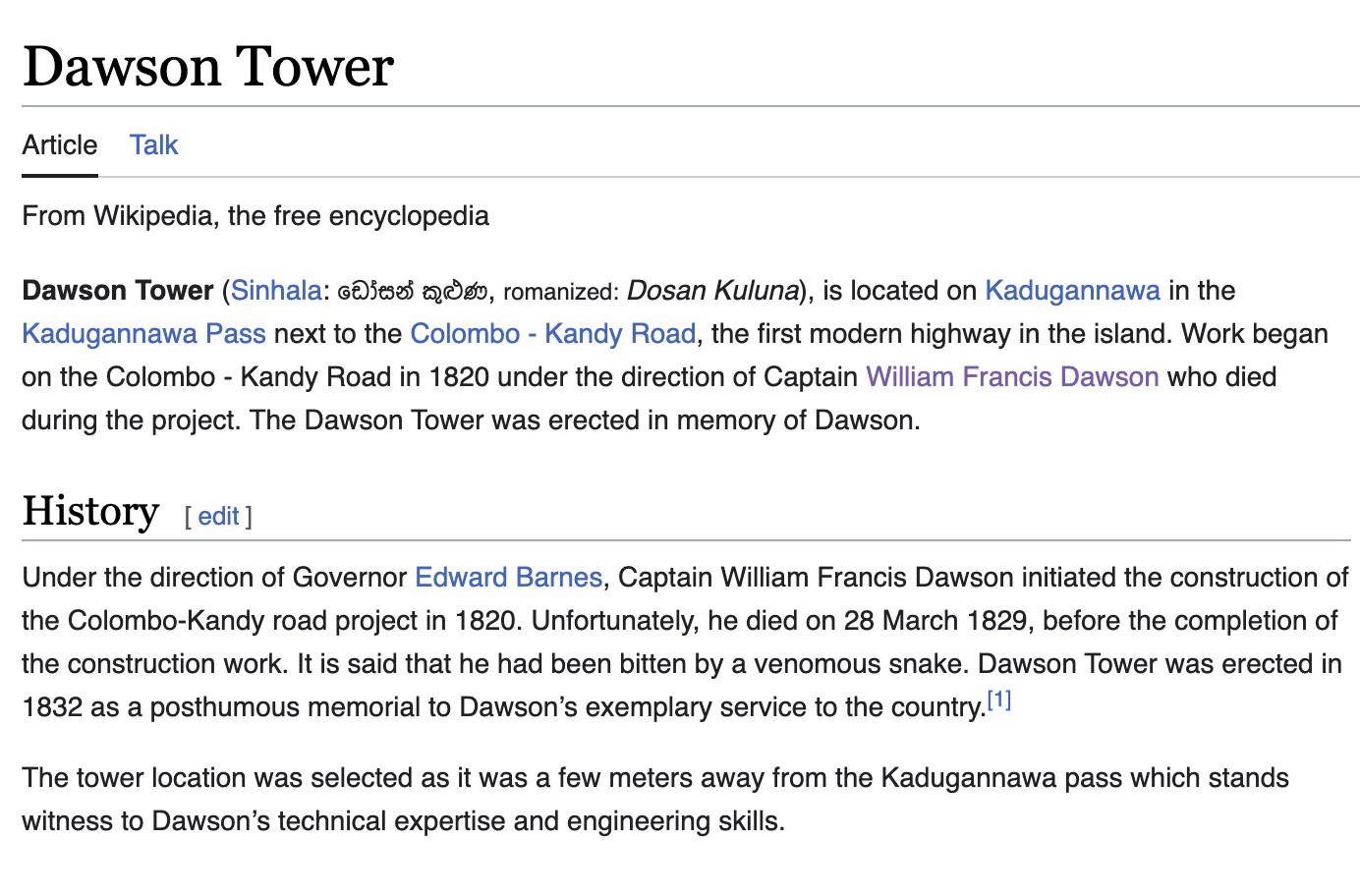
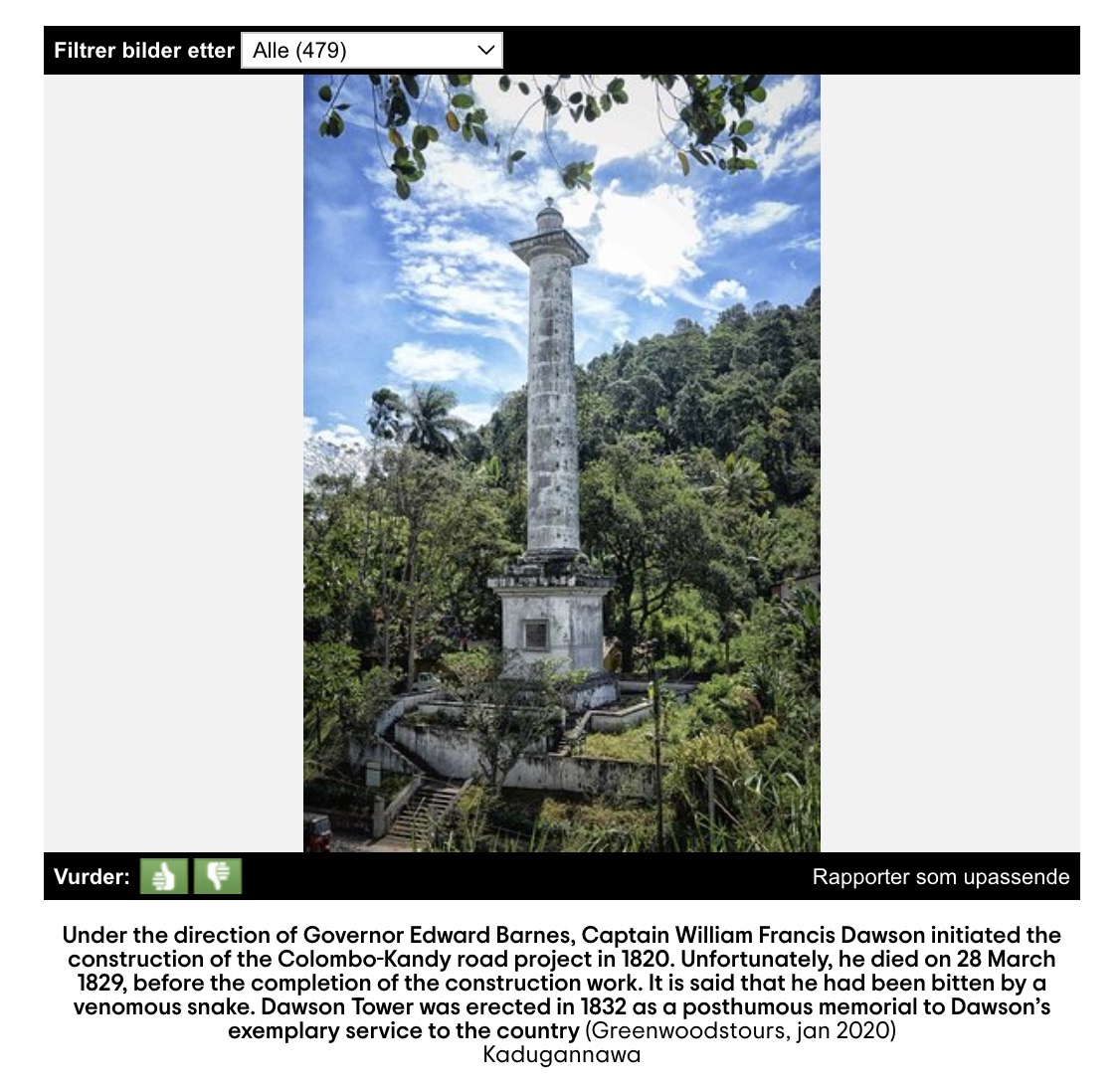

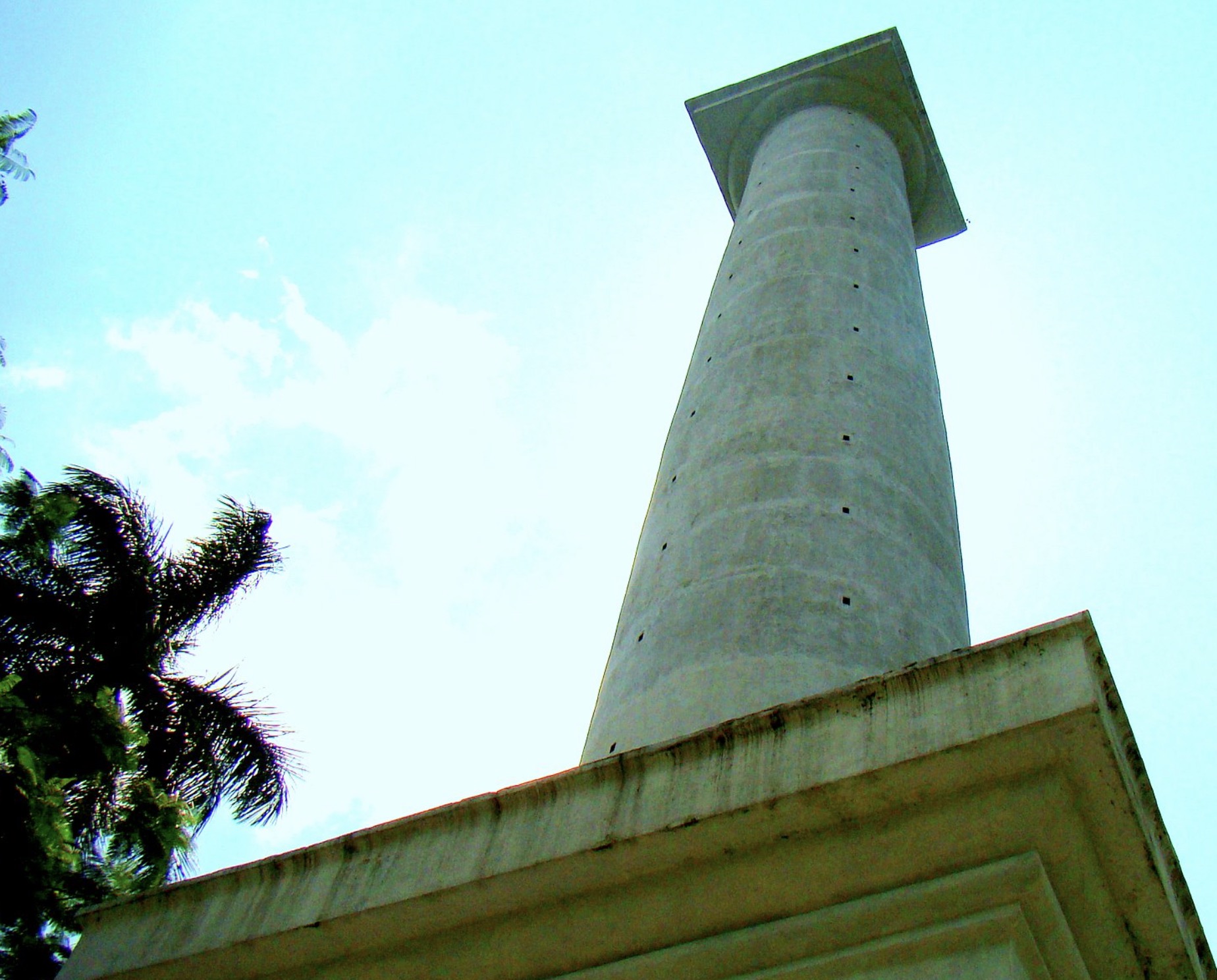

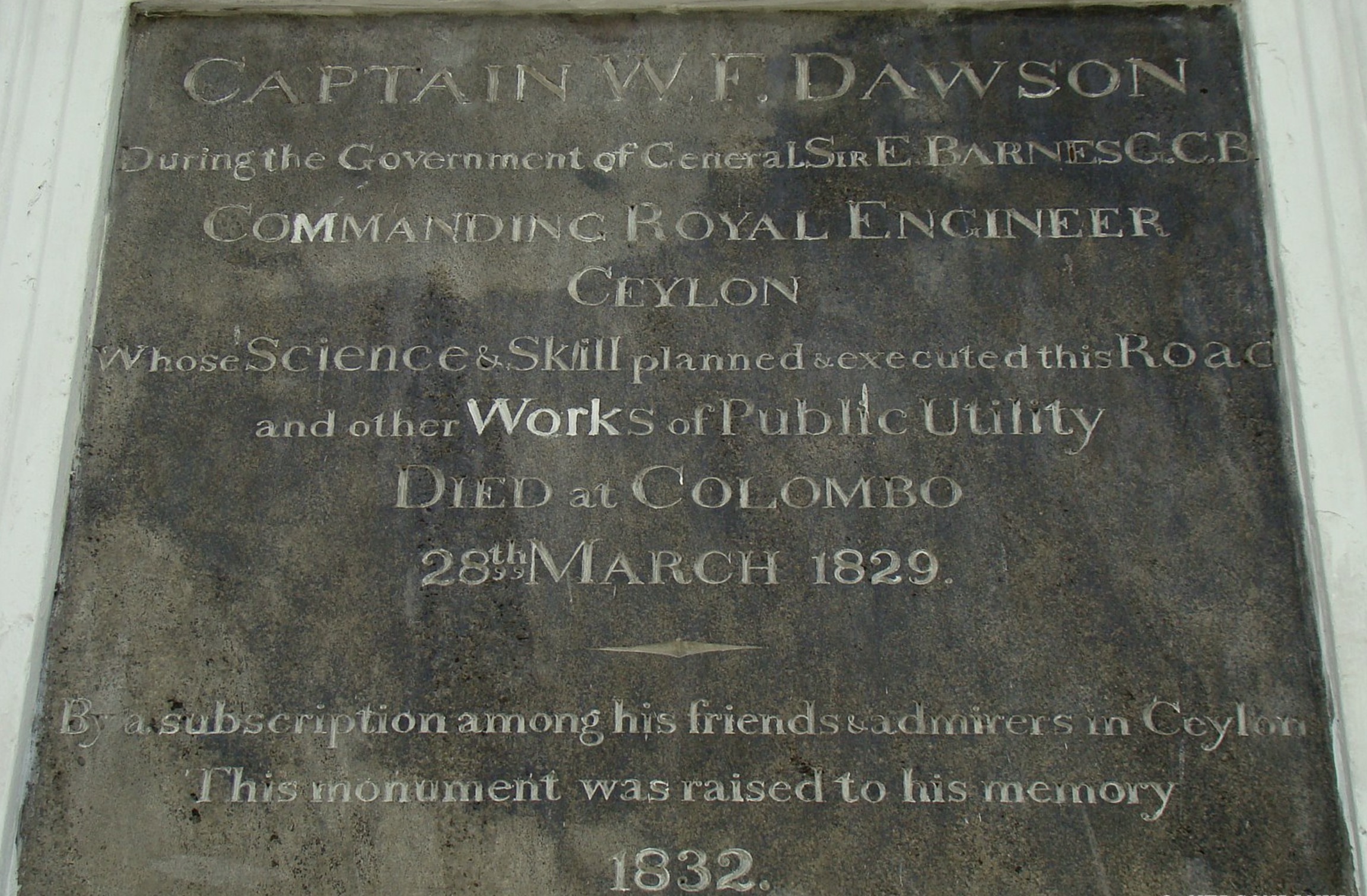
Details of Gilbert’s sister Catherine Roosilia Dawson family (died at 28)
This is information about Charles Fauquier – husband of Katherine from Wiki-tree:
Charles was born in 1788. He was the fourth son of Thomas Fauquier and Charlotte Townshend. He was born at Hampton Court, London, on 3 September 1788, and baptized on 3 October of that year at St George’s Church, Hanover Square. He spent his early years with his family in their apartment at Hampton Court Palace, where his father had a “Grace & Favour” residence as one of the Gentleman Ushers to Her Majesty Queen Charlotte, wife of King George the Third.
On 31 January 1799 he was appointed Page of Honour to Queen Charlotte. He retained this position until 1815. From 1807-1810 he was an Ensign in the 1st Regiment of Foot Guards. He was commissioned on 26 June 1807 and was awarded a campaign medal for service in Europe during the Napoloeonic Wars.
In 1811 he married Katherine Roosilia Dawson at St Mary, Hampton, Richmond upon Thames. The marriage was announced in newspapers such as the “Lancaster Gazette” of 28 September 1811: “Married – On the 16th inst. Charles Fauquier, Esquire, son of Thomas Fauquier, Esquire, of Hampton Court Palace to Catharine Rosilia, eledst daughter of the late Francis Dawson of Ripon Park.”
They had two daughters (Georgiana and Roosilia) born at Hampton Court then Charles was posted overseas to the Ionian Islands where he was a “Deputy Assistant Commissary General” to the Army (sort of Quarter-master and Pay-master). On 15 June 1815, the London Gazette had the following announcement: “STAFF. Charles Fauquier, Gent, to be Deputy Assistant-Commissary-General to the Forces. Dated March 27, 1815” Katherine went with him to the Mediterranean, leaving the two little girls in the care of her family and Charles’ family at Hampton Court.
They were in Malta in 1817-18 where Katherine had two more children (Frederick and Emilius) In 1819 they were on the island of Cephalonia where a third daughter Isabella Fauquier was born. Another baby boy, Edward, who died in infancy was born on Cephalonia in 1820. Katherine then returned to England to her family, bringing with her the three small children born overseas. She died at Hampton Court in December 1821, aged not quite 30.
During the years 1819–1820 on Cephalonia, as well as serving as commissariat officer to the few hundred soldiers stationed there, Charles Fauquier also acted as Deputy Collector of Customs, collecting dues raised on the export of currants, the small grapes being one of the staple products grown and processed on the islands of Cephalonia and Zante. The event which reverberated back in England and led to Charles’ ostracism by his family was his conviction by a court martial of the embezzlement of several sums of money raised on the export of currants in 1820. There was a court martial on Corfu in 1822 then a trial in London in which Charles was fined and sentenced to 2 years imprisonment. The family appealed to the King who granted clemency for the term of imprisonment but ordered that the fine be paid. Charles was also dismissed from the Army but he remained on Corfu.
At some time in the years between 1823 and 1826 Charles Fauquier met Theodora Pillo, who was born on the Island of Cephalonia, and he married her in Corfu on 1 October 1826. On his marriage certificate Charles is shown as “civilian”, though on the marriage of his daughter Luisa to George Twelves he is described as “Ionian Government Employee, Corfu”. It has been suggested that the Ionian Government, on whom the British Government was increasingly keen to offload costs of the Federation of seven islands, might have looked more leniently on Charles’ previous behaviour, and was willing to make use of his clerical skills.
Charles and Theodora Fauquier were to have a family of 9 children (making about 15 children for Charles in all). All the children of this second family were born on Corfu.
Charles Fauquier died on Corfu in 1847 and is buried in the British cemetery there.
It is interesting to know that the children of the first marriage of Charles Fauquier never knew about his second family (with Theodora Pillo). Back in England they were apparently told that their father was dead. The boys were sent to family connections in northern Canada, and grew up never knowing that there were half-siblings growing up in Corfu. The two families did not connect up until the 1980s.
Details of Gilbert’s brother Reverand George Francis Dawson who was sent to a court martial in Malta for refusing to fire a salute at a catholic festival due to his Protestant beliefs
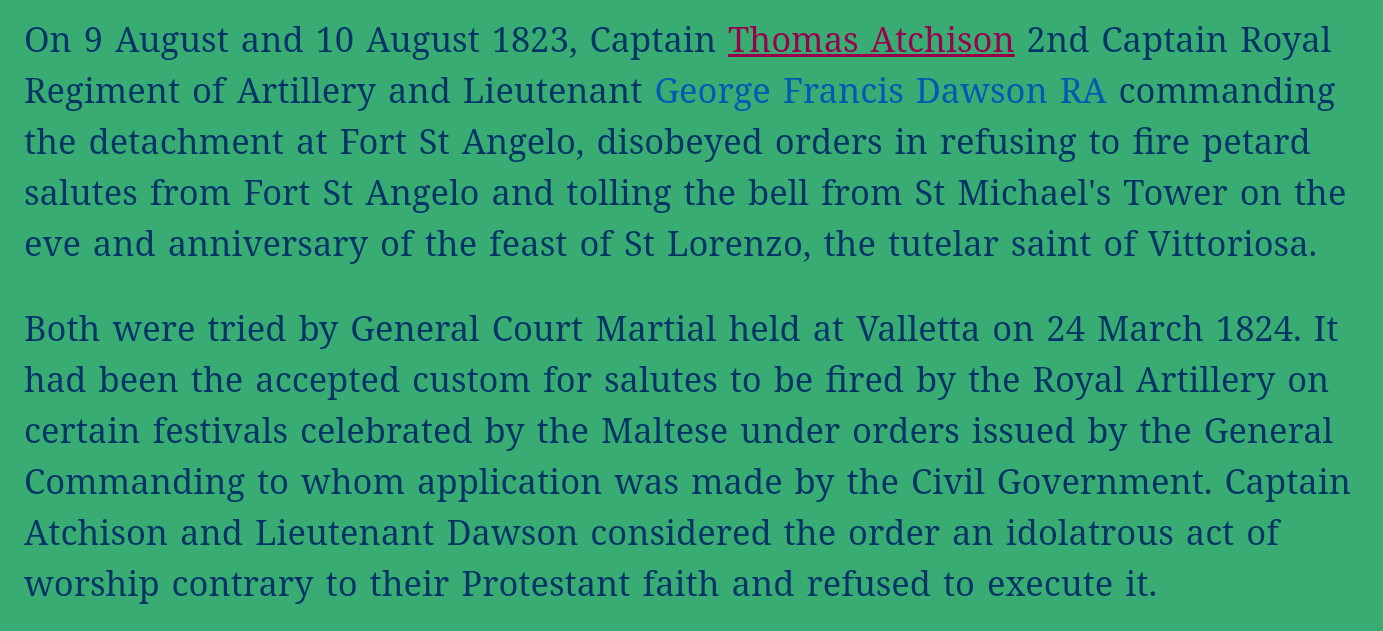
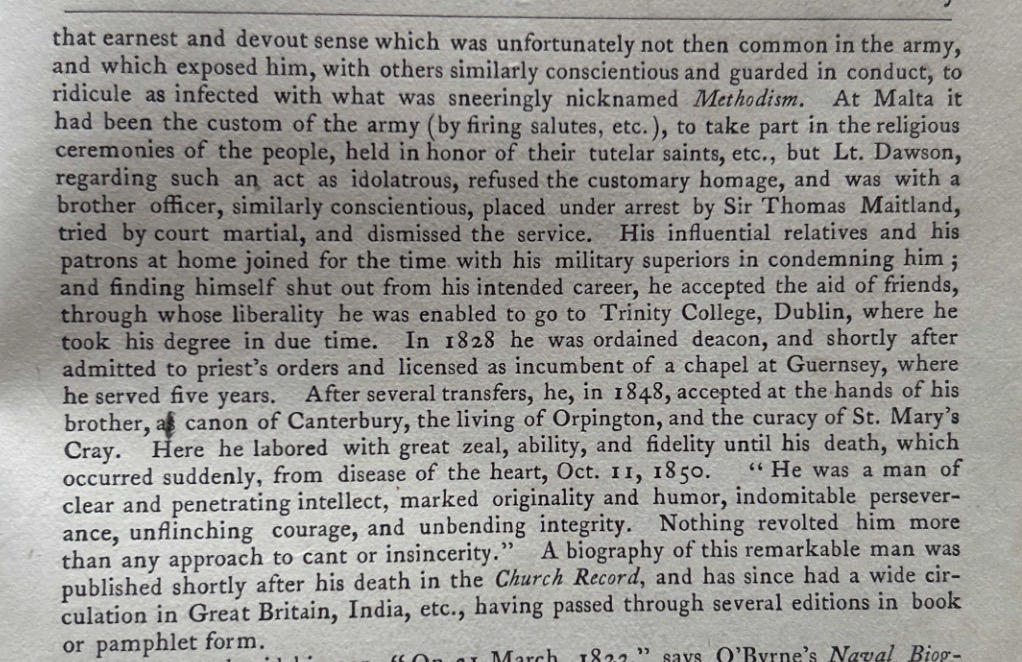
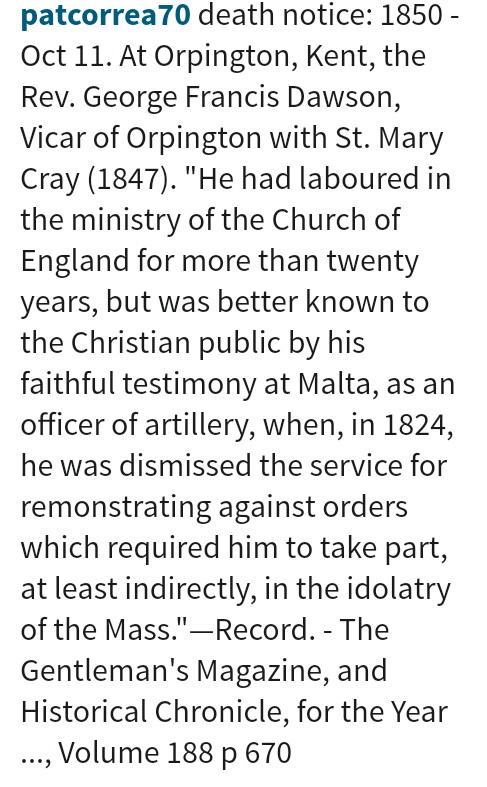
The free New Zealand government site paperspast was invaluable for some of the information about Wanganuri and Gilbert Francis Dawson’s role there
https://paperspast.natlib.govt.nz/
Thanks to the Museum of Whanganui who provided a detailed biography of Gilberts life including an account of his capture by hand of the notorious Spanish Pirate: Marquis Cayatano Arogonez (or Cayetano Aragonés) captain of the Zaragozana.
Cornelia Theresa Bagenall
Born: 1825
Dunkerque, France
Died: 1904
74 Hurlingham Road, nr Putney Bridge, London

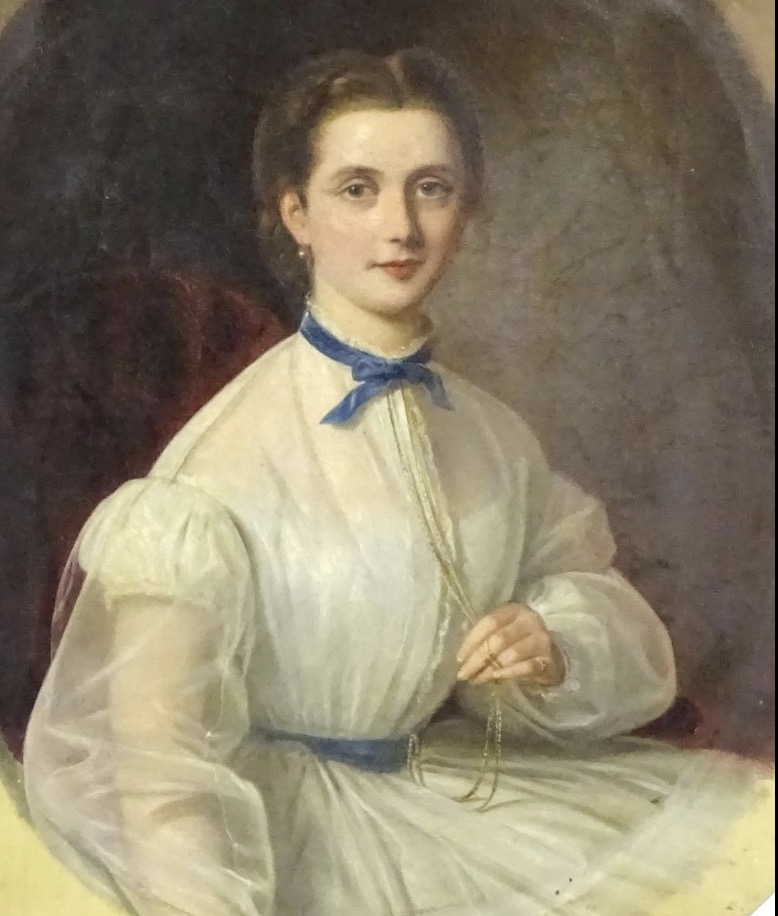




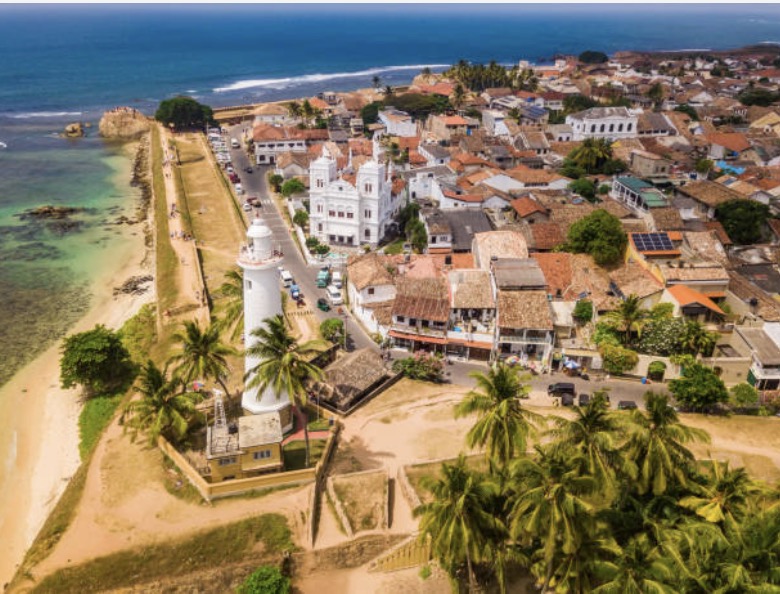



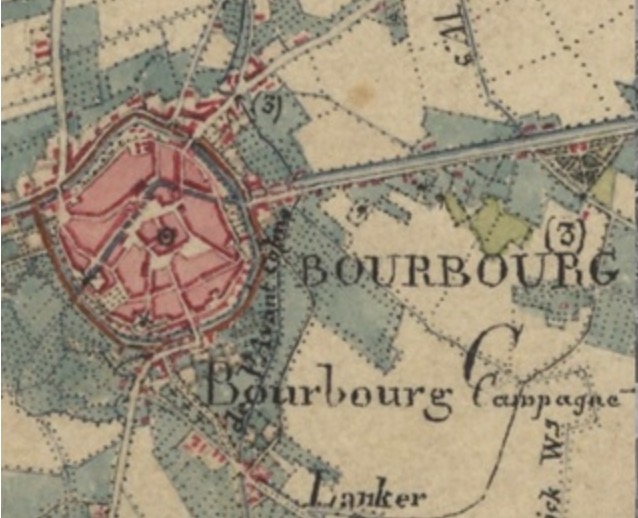
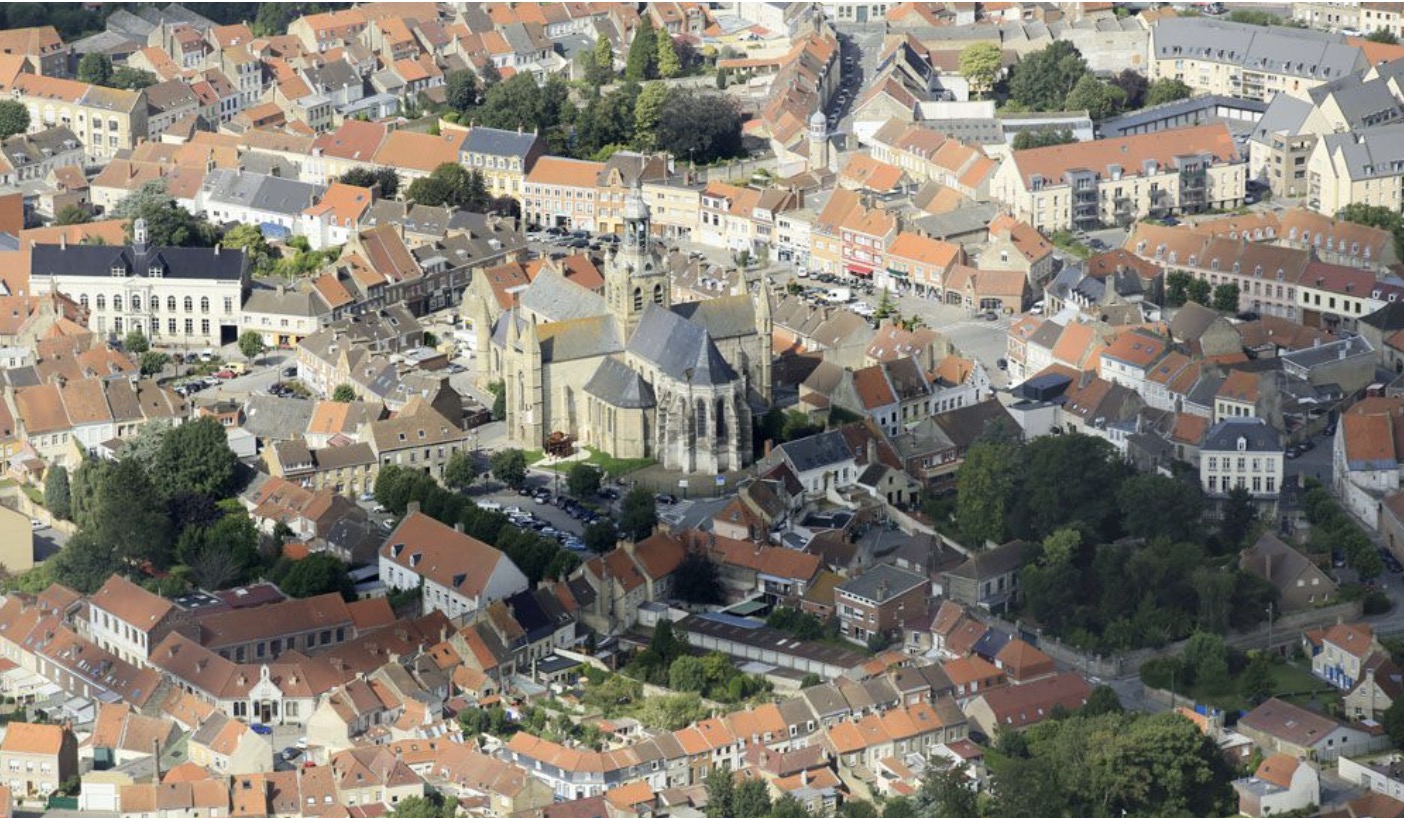
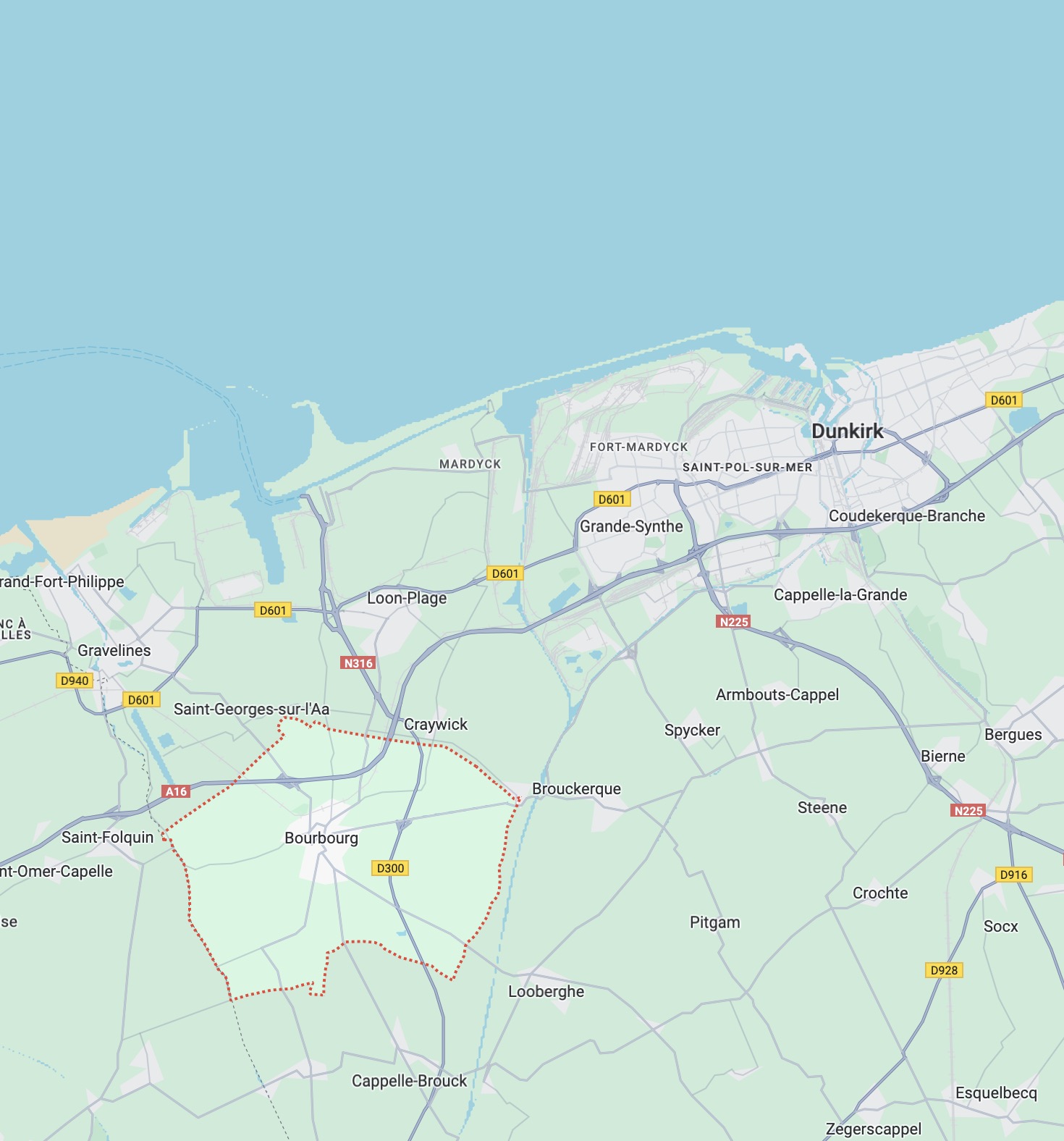
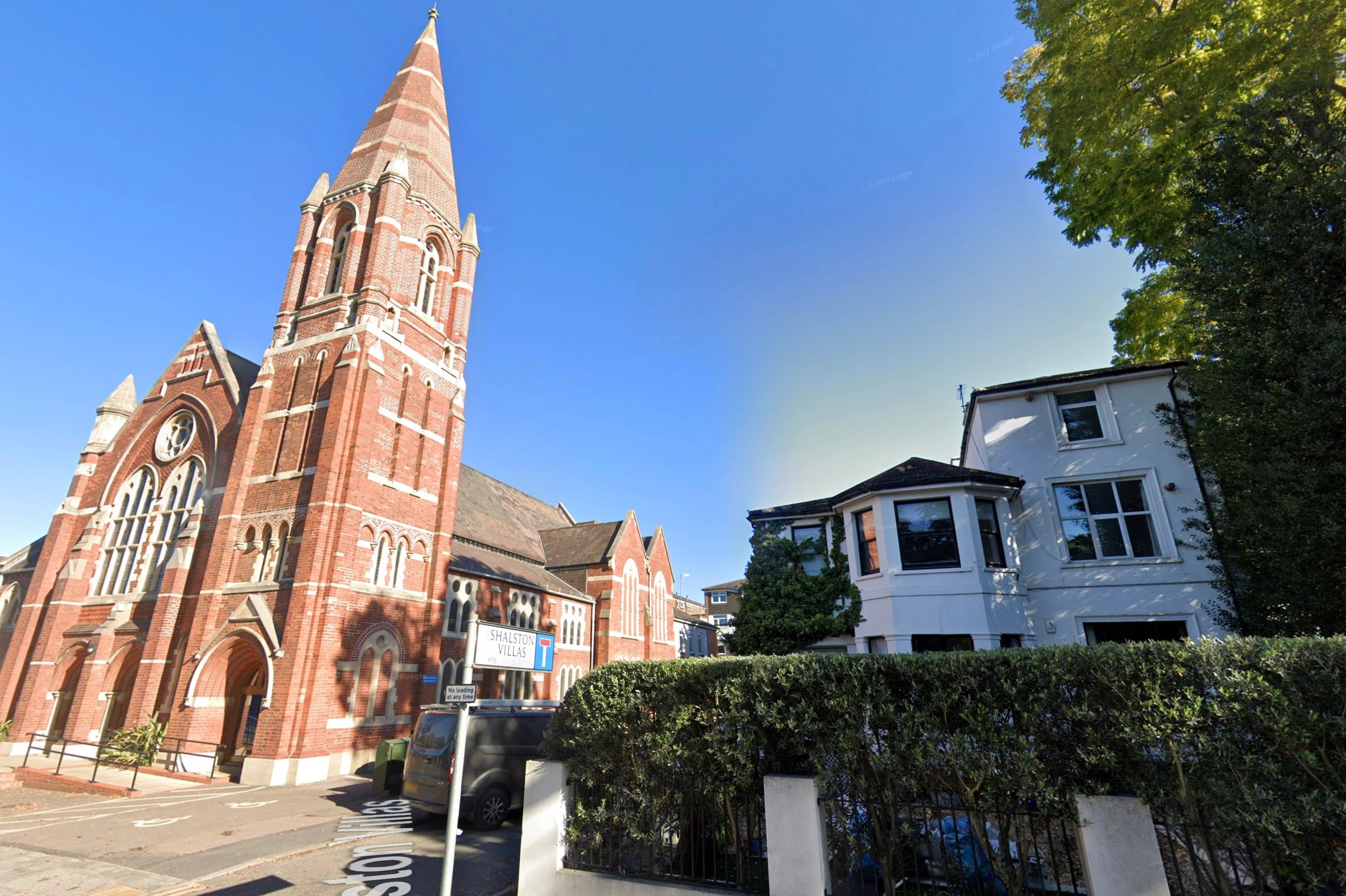


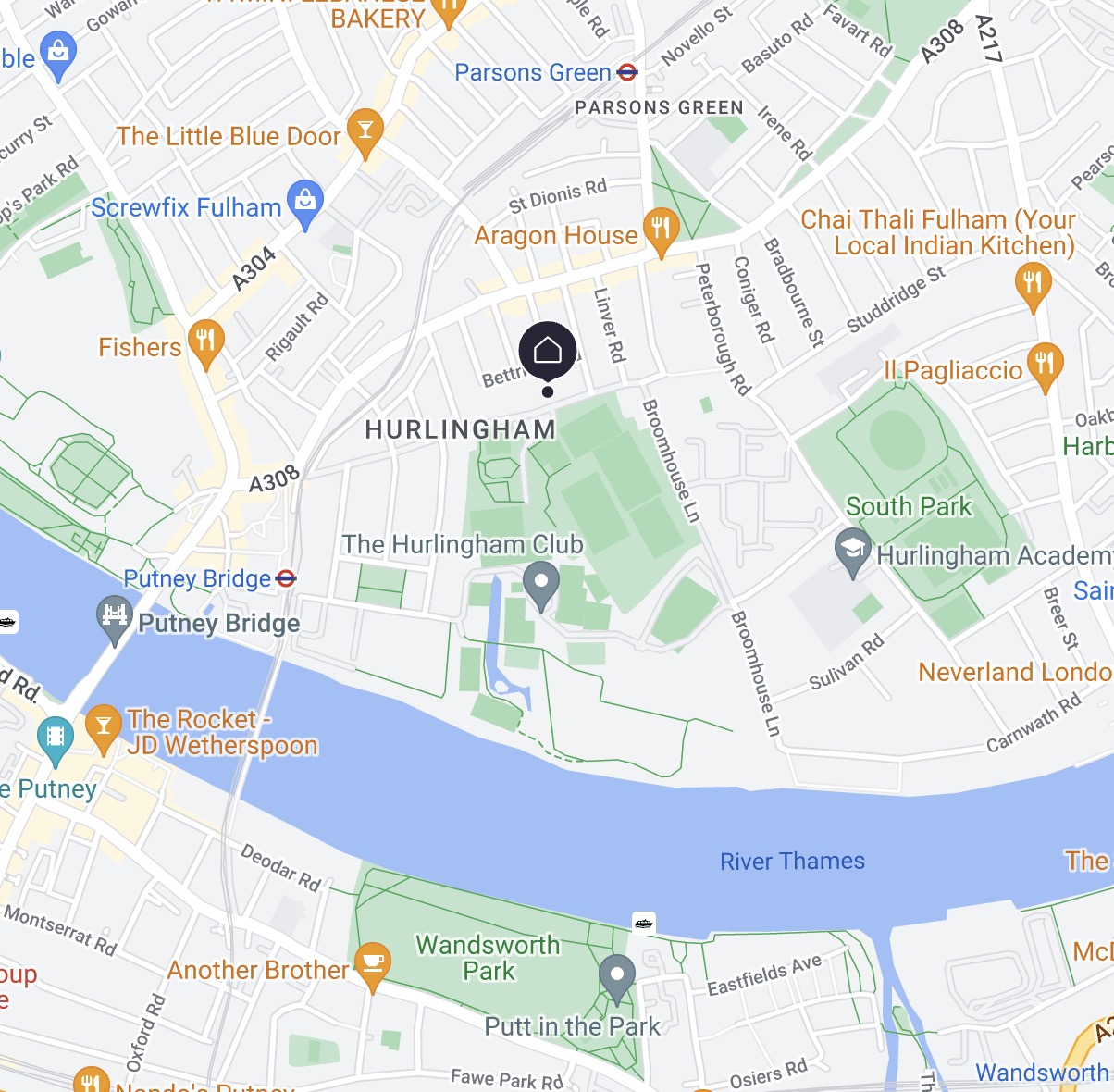
Cornelia Theresa Bagenall was born to an Irish soldier father: John Doyle Bagenall and a Basque (from the Spanish side of the border) mother: Maria Florentina Longina Teresa Sebastiana Josefa Lecuona Fernanda y Bea. The couple had run away together to get married in Bordeaux when John had been working as an adjudant in Hondarrabia. He was convalescing because he had lost an arm in the Battle of Talavira de la Reina outside Madrid against Napoleon. Florentina was just 17 when they married. I am not sure that she ever saw her family again.
Cornelia was born in Dunkerque in 1825 and probably spoke French, Eskudi and English. Her father was on half pay pension from the British Army. This would provide a stipend for the rest of his life but with a growing family it may not have been sufficient to sustain them.
When Cornelia was around 5 years old her parents took the decision to move to England so that John could join up again. To start with John had an admin job on the south coast enlisting recruits. But in a few years later he was transferred to the Ceylon Rifles and the whole family packed up and moved to Sri Lanka in about 1832/33. By the time Cornelia was 9 years old her brother Wilson was born in Sri Lanka.
In 1835 the family lost Cornelia’s little brother John Doyle, he was 5 years old. And then the following year they lost 2 year old Wilson. Unfortunately in 1837 Florentina then also died unexpectedly at the age of 39.
John was in deep mourning. The Sri Lankan weather was starting to bother his old injuries and he was advised by a doctor to go back to England to get some expert medical advice. So he set off on the ship Sarah Jane leaving his young family back in Ceylon. Sadly he was never to make it to England and he died at sea.
This left 8 orphaned children back in Sri Lanka. The oldest brothers were young adults and they asked the British army for support. That came in the form of jobs for the eldest boys and possible a small sum. Cornelia was the third youngest aged 13 and her youngest brother was just 2. I assume that they were taken by other army families or looked after by their older sisters.
Six or seven years later the orphaned Cornelia met Henry Templer and she was married at 19. They were married at Galle possibly in the Dutch reformed church.
Henry had an uncle Francis James Templer who had been in the Ceylon Civil Service for a long time. By that point he was Treasurer of Ceylon. So they would have been involved in helping organise the wedding.
The couple quickly had four children. George William, Gertrude, Edmund Reginald and lastly Emily Charlotte.
Sadly after only 6 years marriage Henry died at Matale just north of Kandy in central Sri Lanka.
Since only one brother remained in Sri Lanka it appears Cornelia did not stay – in 1853 her brother’s will states that Cornelia is living in Bourbourg, near St Omer France. Henry’s probate was not sorted out until 1866 which must have been something of a concern for Cornelia. Perhaps it was issues related to this that made her reluctant to go to england.
There is a record that she applied for a British passport in 1861. And the census shows us that she did go to the UK and stayed with her brother in Kent. This is something of a poignant visit because Louisa Henry’s first wife and children are there. However shortly afterwards she and the children took a ship back to Halifax and the boat was lost at sea and they all died.
I cannot find any record for any of the five Templer family members in the UK in 1871. It seems likely that Gertrude and Cornelia are in the UK because Cornelia married Reverand Henry James Buller her first husband’s cousin in 1873. And then Gertrude married her new stepbrother in 1874. Cornelia’s new husband died later in 1874.
George and his brother Edmund probably stayed in Sri Lanka or went out there after being educated in england. They certainly ended up marrying in Sri Lanka Edmund in about 1868 and George in 1875.
In 1880 Cornelia is living off Ewell Road in Surbiton. This is where Fanny Mary Templer (nee Dawson) comes to have her twin boys (Henry Buller and Francis Dawson). Emily is living with her.
In 1891 Cornelia and Emma are visiting Gertrude in Witney outside Oxford.
Cornelia ended her days living at 74, Hurlingham Road, near Putney Bridge. She is there in the 1801 Census and also on her death certificate. Her daughter Emma was present at her death. She was 80 years old.
Gertrude went on to have a large family of her own and was buried in a church in Cowley Oxford. Only one of her children Gladys married and had a family.
Edmund Reginald married a Dutch Burgher wife Maria DeWitt. He was later to go to Belgium to promote Singhalese tea and he ended his days there. However all five of his children married into the Dutch Burgher community and he has many descendents. He outlived all his siblings. His son and namesake Edmund Reginald joined him in Belgium and eventually became the British Consul there.
Cornelia was the last of her 11 siblings to die. Many of them had died quite young (7 of them before the age of 30). Only Clara and Henry and her lived into old age. Clara living in Scotland and Henry in London in Brentford so not too far from Cornelia in Fulham.
Her brother Henry had very bad luck losing his whole first family at sea (a wife and three children) and then also losing a second family (wife and two children). At He had a third family with 5 kids in London – although sadly even the youngest of these died aged 5. I hope Cornelia and Henry were good family support for each other at this time
Charlotte or Emma as she seemed to be called as an adult lived to be 80 and ended her days in Brighton in 1830. So she lived for another 25 years after her mother died.
Although I have not found it in my own close family. Many of the descendents of Cornelia when they do a DNA test do show some Basque ethnicity I have seen values from about 1 – 4 %. It is the first time I have found ethnicity useful as a tool in helping confirm a family line!


Census records for Cornelia.
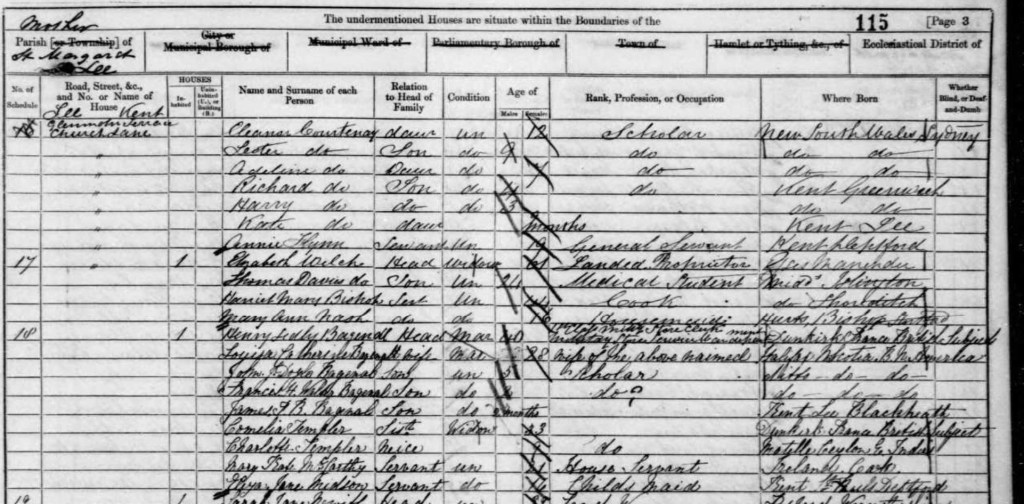
I cannot find where Cornelia or any of the rest of the family were in 1871. It is possible that she was in Sri Lanka. Both her son’s married in Sri Lanka in 1869 and 1875. However she also remarried herself in England in 1873 and her daughter married in 1874.



Information about Cornelia’s siblings

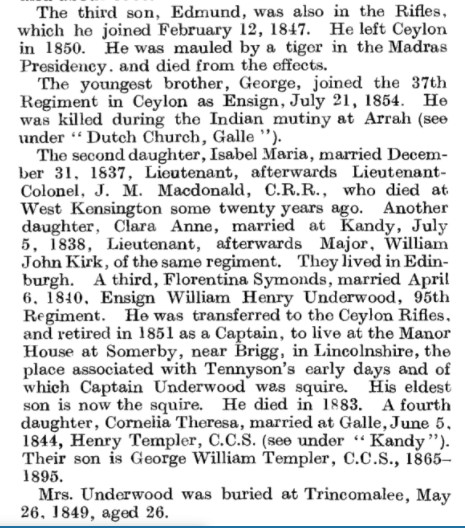
There is an error in this information William was not lost at sea with his brothers family because we have his Will and he died in 1855. The rest of the information in this biography appears to be accurate. Except that on the children’s birth certificates in Dunkerque John Doyle Bagenall is said to be born in Dublin. This fits in with what we know about his parents who definitely lived in Dublin. Mullingar is where the regiment that John Doyle Bagenall joined up with was from so I wonder if he just stated that he was born there to be signed up more easily.

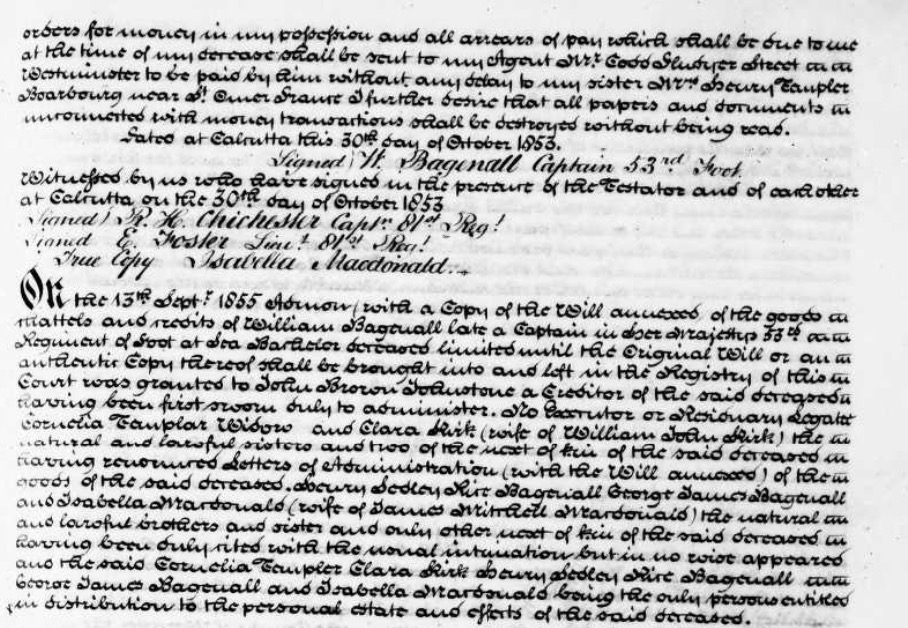
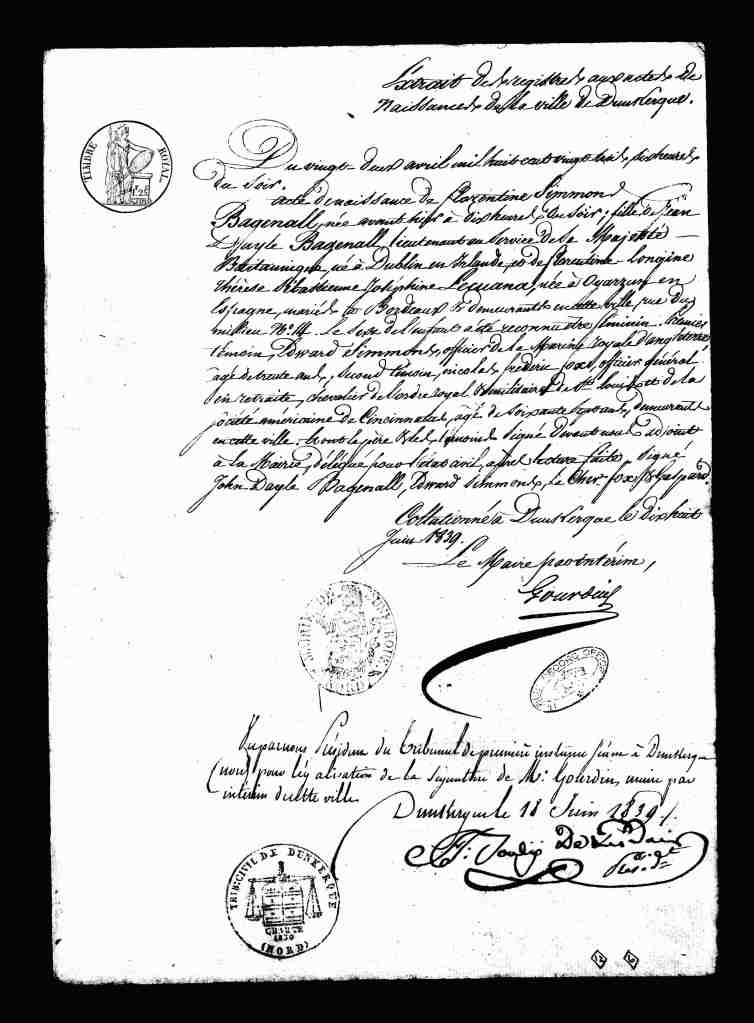

We also have a letter written by William Bagenall about his siblings to Lord Howath asking for funds for the child orphans of John and Florentina.
Colombo
Island of Ceylon
March 11th 1839
Viscount Lord Howath
My Lord
Labouring under the serious affliction consequent on the los of my parents I take the liberty of bringing to your Lordship’s notice the following circumstances.
My father the late Captain John Doyle Banal of the Ceylon Rifle Regiment entered the army in the year 1807 and having served his country for a period of thirty one years was compelled to proceed to England at the recommendation of a medical board having suffered from the effects of wounds received while serving with the 87th Regiment while serving in the 87th Regiment during the Peninsular war. From the exposure to a tropical climate in the colony and from the domestic affliction caused by my mother’s death. He never reached the shores of his country having expired on the voyage on the 21st of May 1838 leaving a large family unprovided for – In consequence of my Fathers long and loyal services, Lord hill has been graciously pleased to obtain for me, a second Lieutenantship in the Ceylon Rifle Regiment and I entertain every hope that your Lordship will also extend your kind interest to my late Father’s four unprovided orphans by recommending them as claimants in the compassionate Fund which kind act of commiseration I beg to assure your Lordship will ever call forth their confounded gratitude.
I beg leave to annex a statement of the particulars required of the claimants on the Fund and trust that the extract I have made from the Register book of the Ceylon Rifle Regiment will be sufficiently satisfactory in lieu of the certificates of Birth and Baptism which I could but with very great difficulty obtain.
I have the honour to be
My Lord
your Lordships most obedient humble Servant
William Bagenall
2nd Lieutenant, Ceylon Rifle Regiment


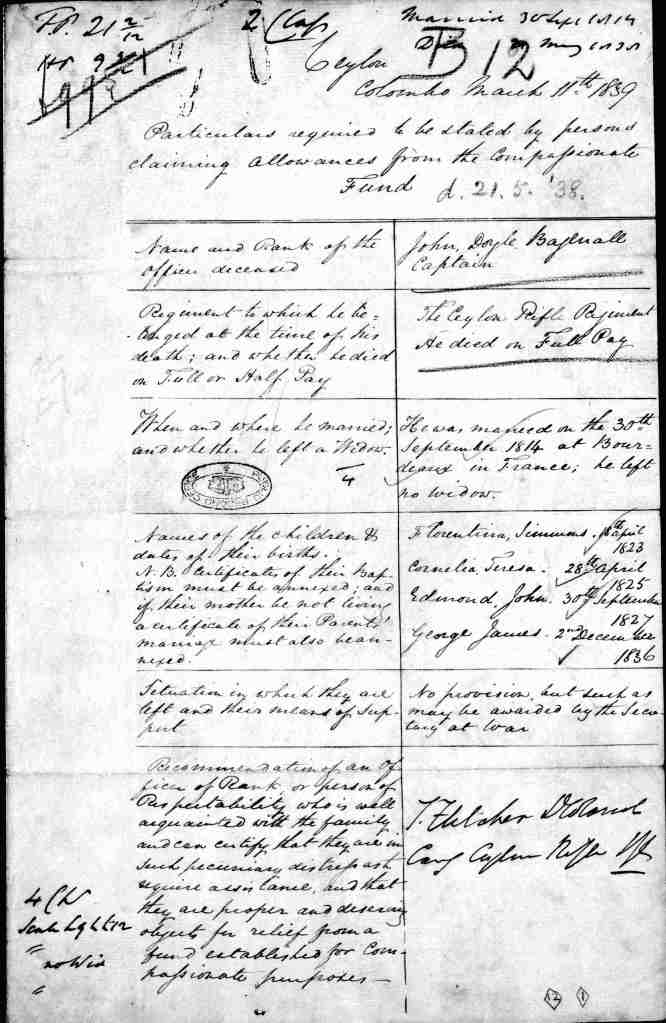
More details about Cornelia and Henry’s other children
Gertrude married her step brother Richard Buller.
She had five children. Only one of them Gladys married and had a family. Two of her sons Richard and Arthur died in WW1.
We know from Probate her formal address at time of death was in Leicestershire but records show she died at 13 Bartlemas Road, Oxford and is buried at St Mary and St John Church on the Cowley Road very close by.




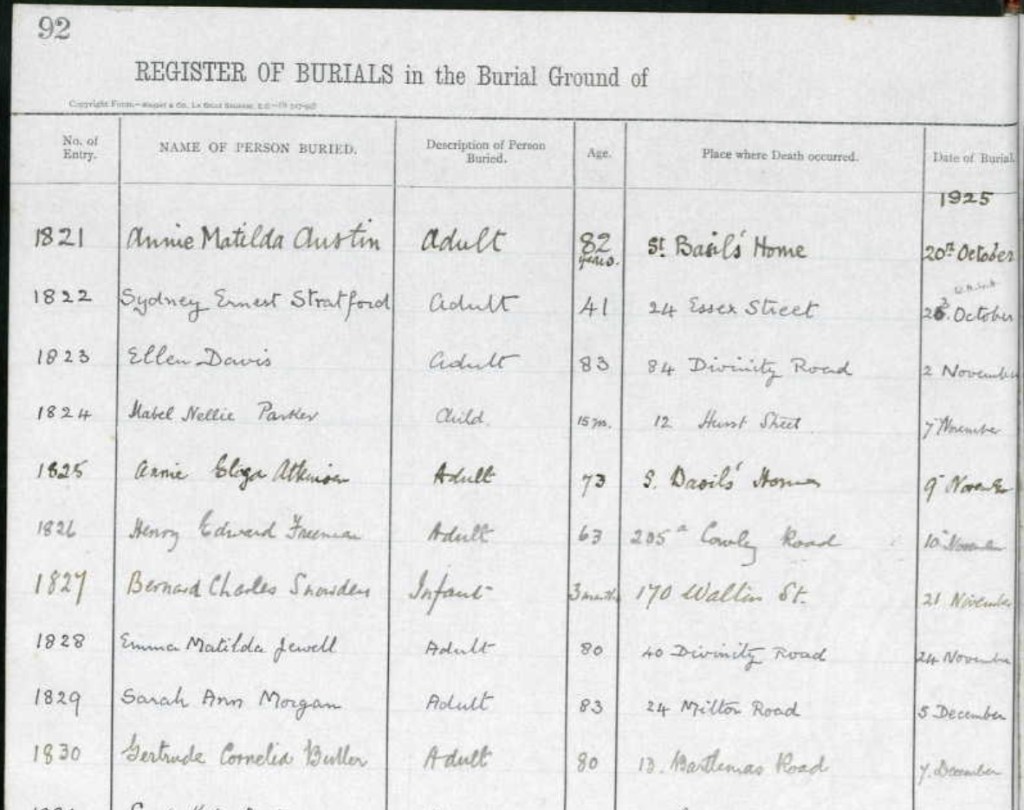
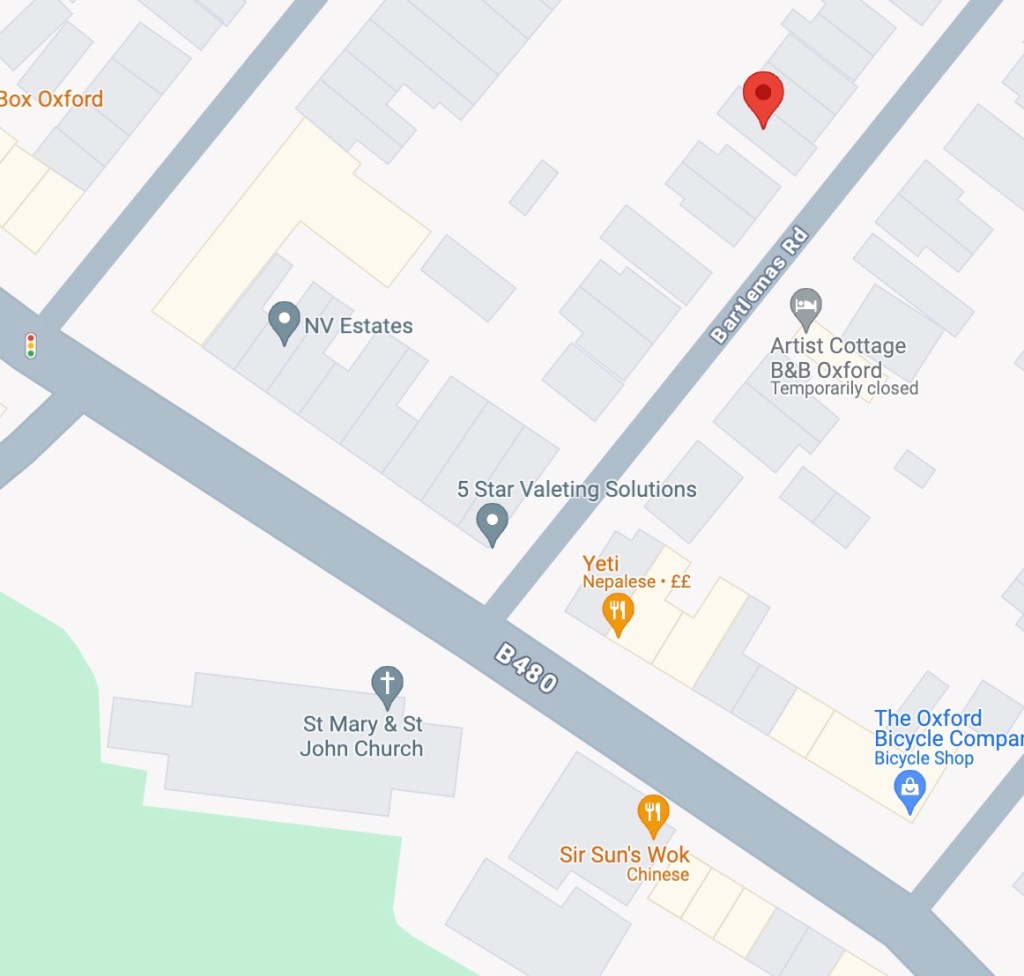
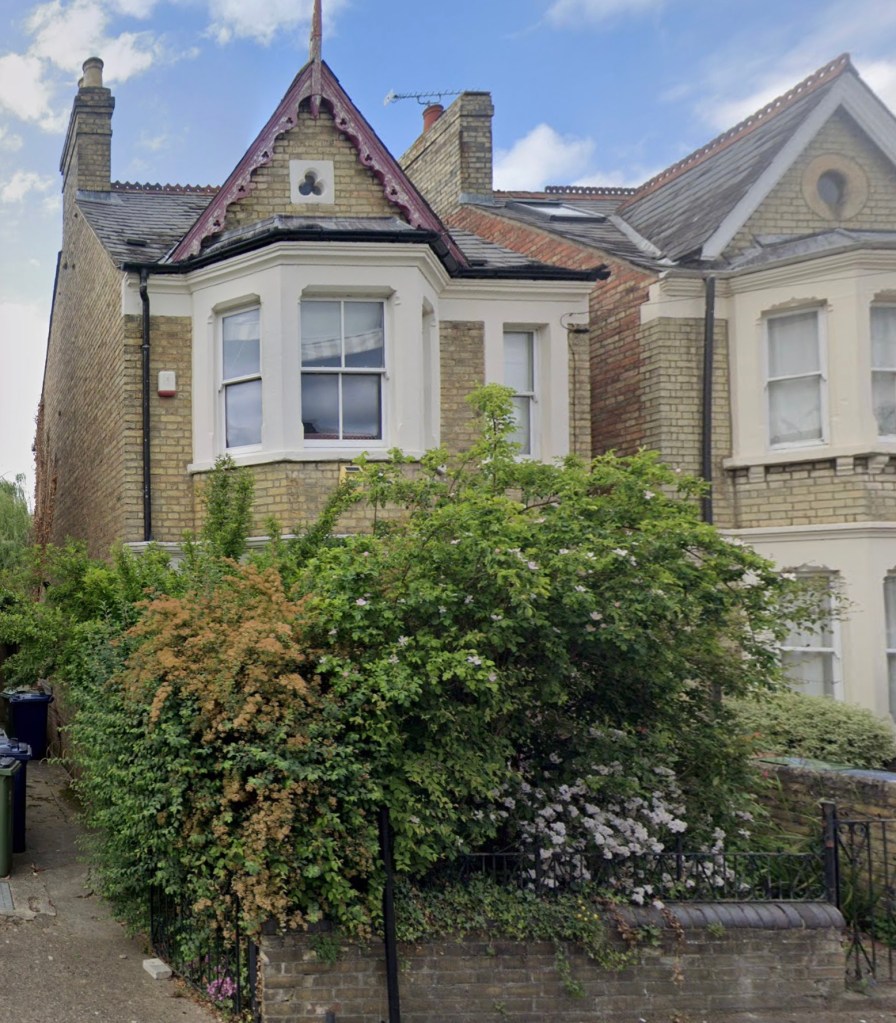
13 Bartlemas Road
Edmund married Maria de Witte from the Dutch Burgher community in Sri Lanka and had five children. They all married into other Burgher familes. He eventually went to live in Belgium to promote Ceylon Tea in Europe.

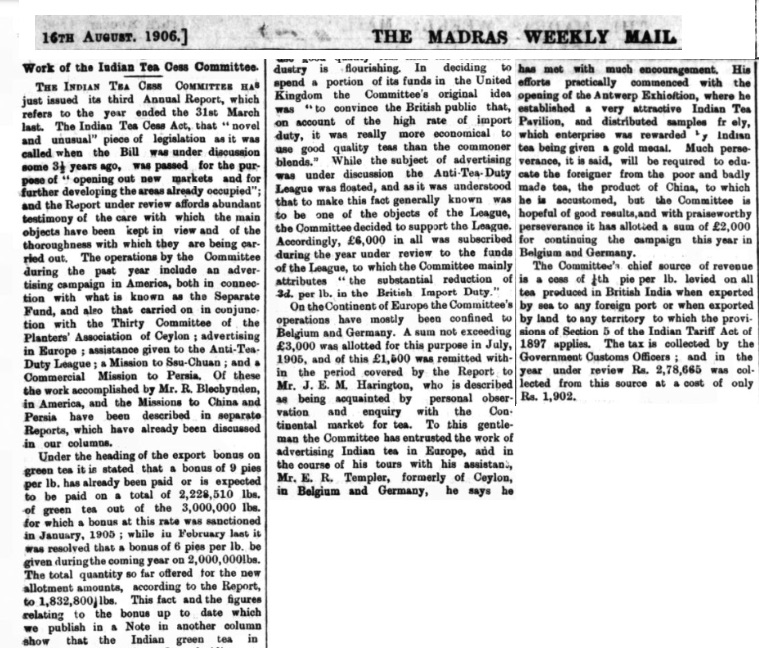
George William is described elsewhere in the website. Unfortunately we have very little more detail about Emma/Charlottes adult life aside from the fact that she lived with her mother until she died as shown in the census records.
Thanks to the nine descendents of Cornelia Templer who have taken a DNA test we can confirm this line as we have three matches to two of George William’s siblings.
See match summary
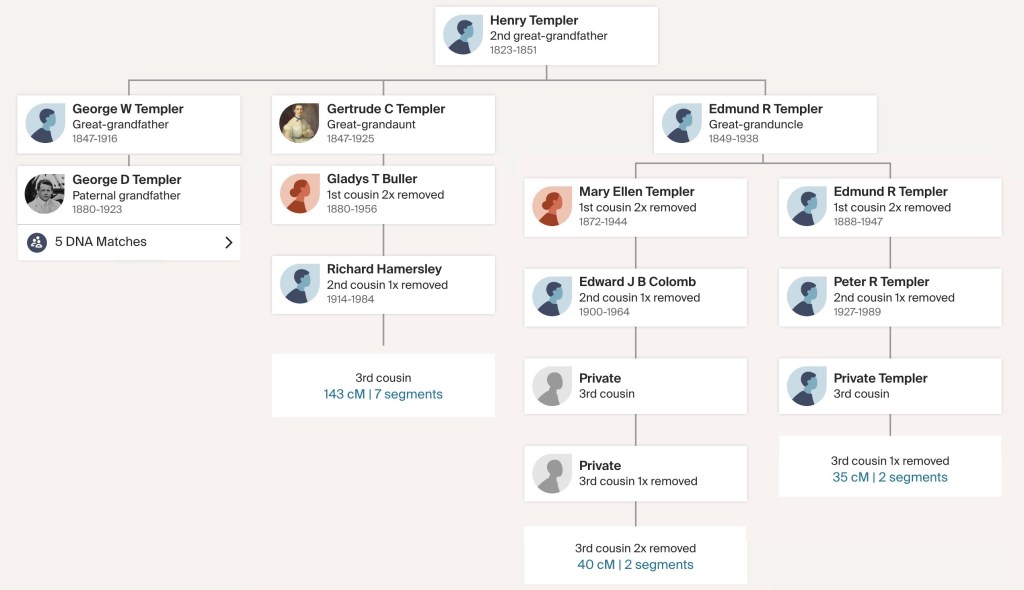
Henry
Templer
Born: 1823
High Week, Devon
Died: June 1851 – aged 28
Matale, Sri Lanka

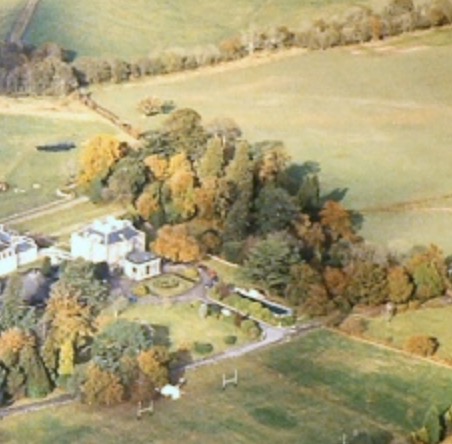
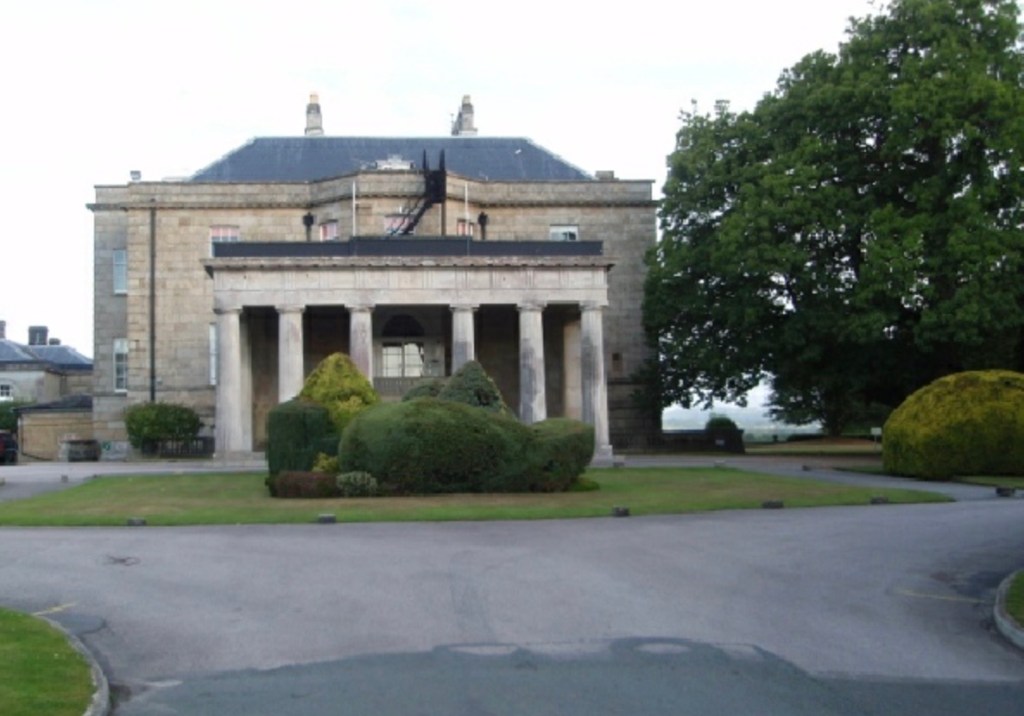



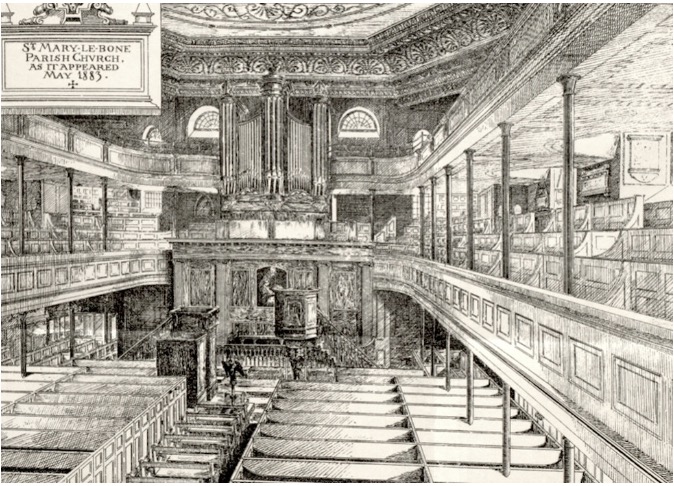

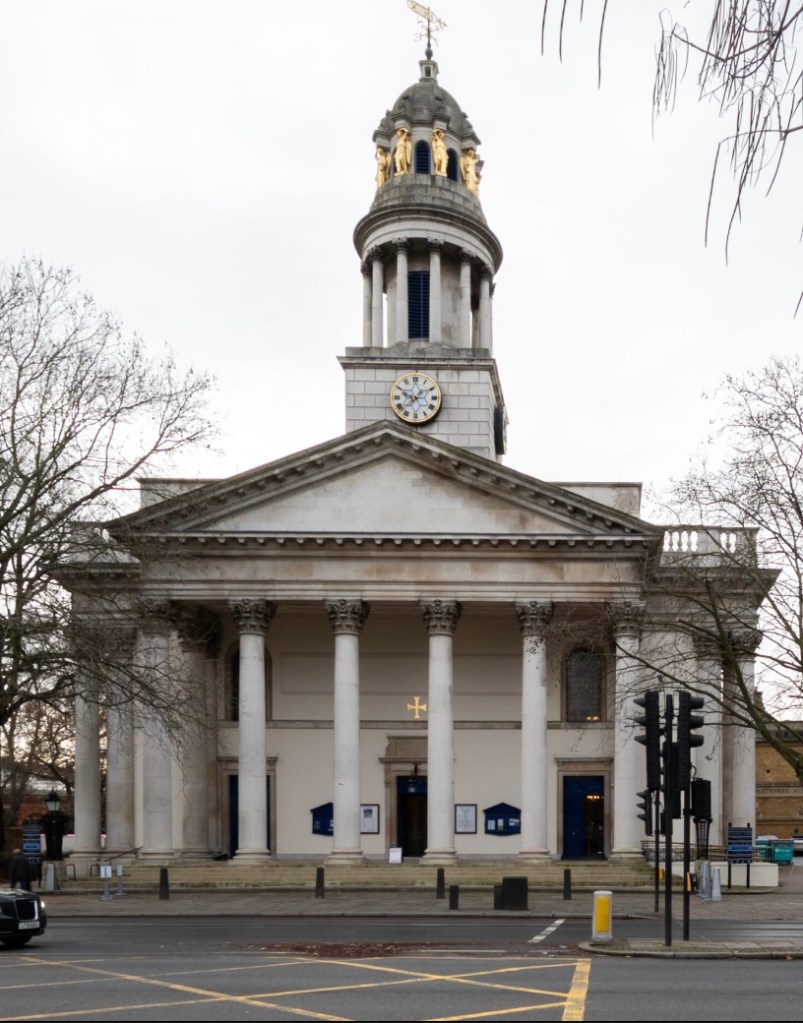

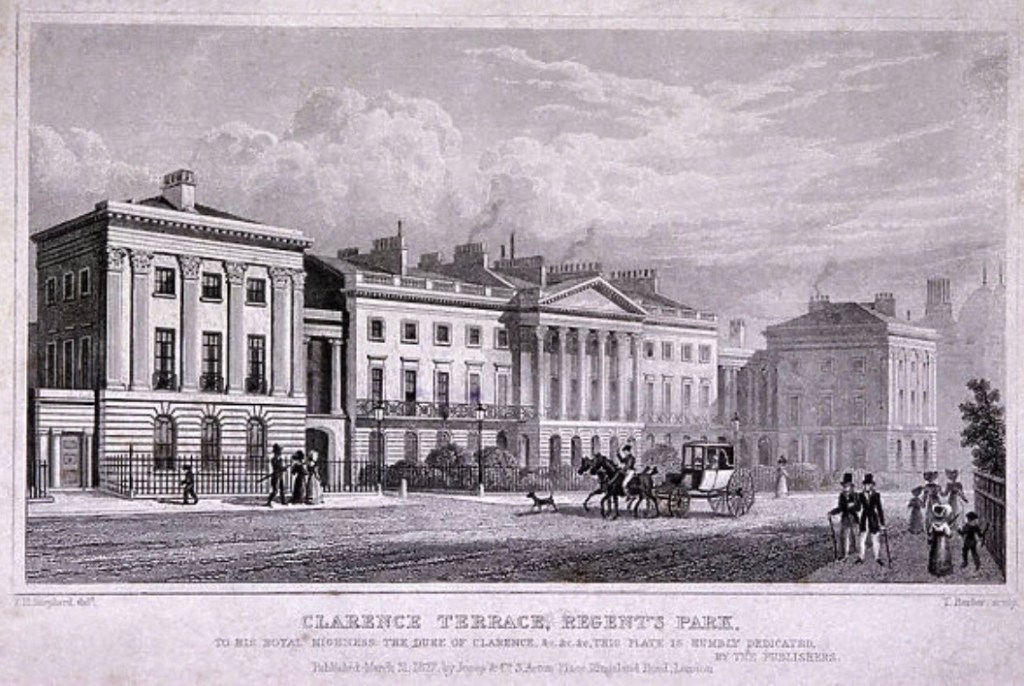
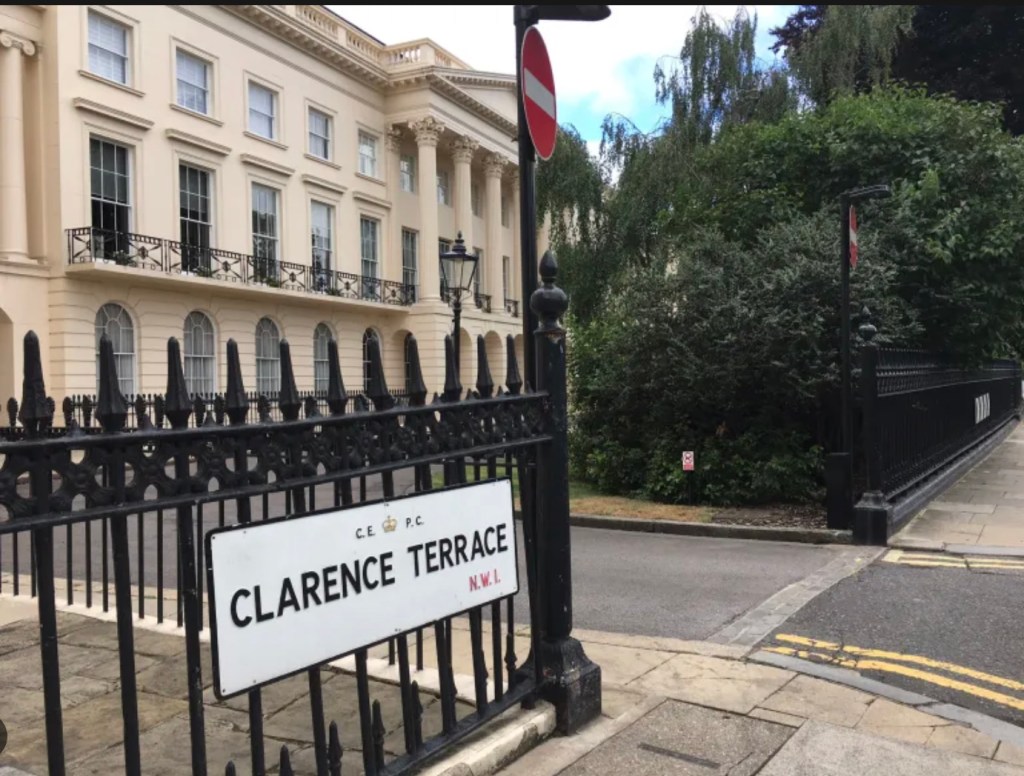

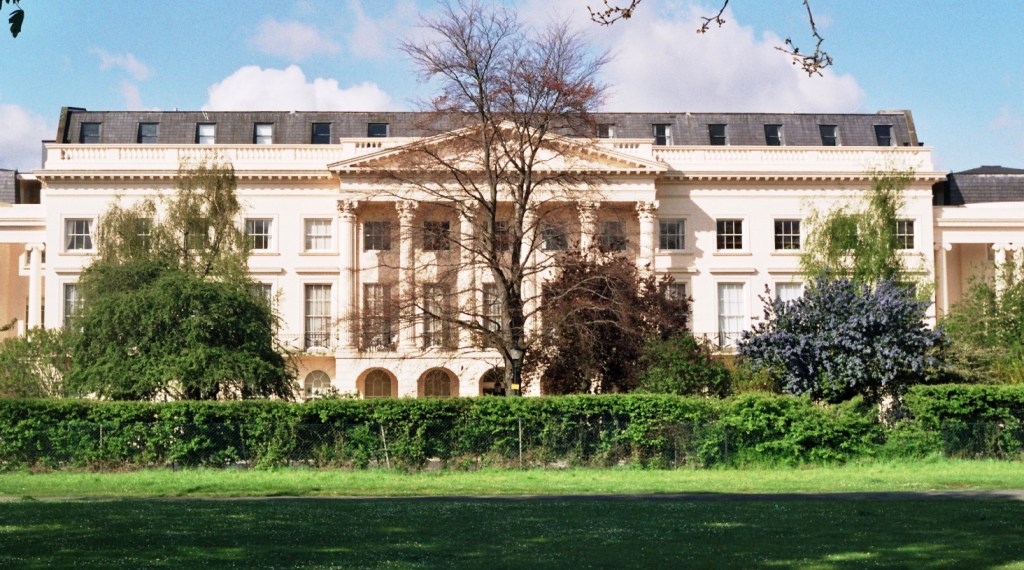

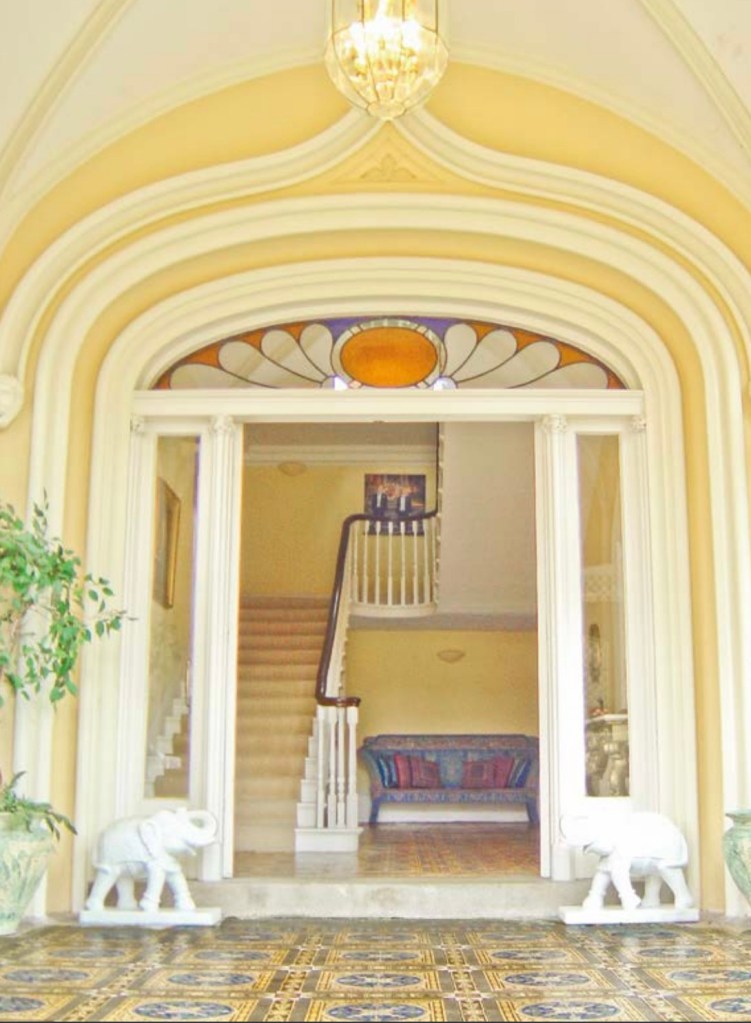



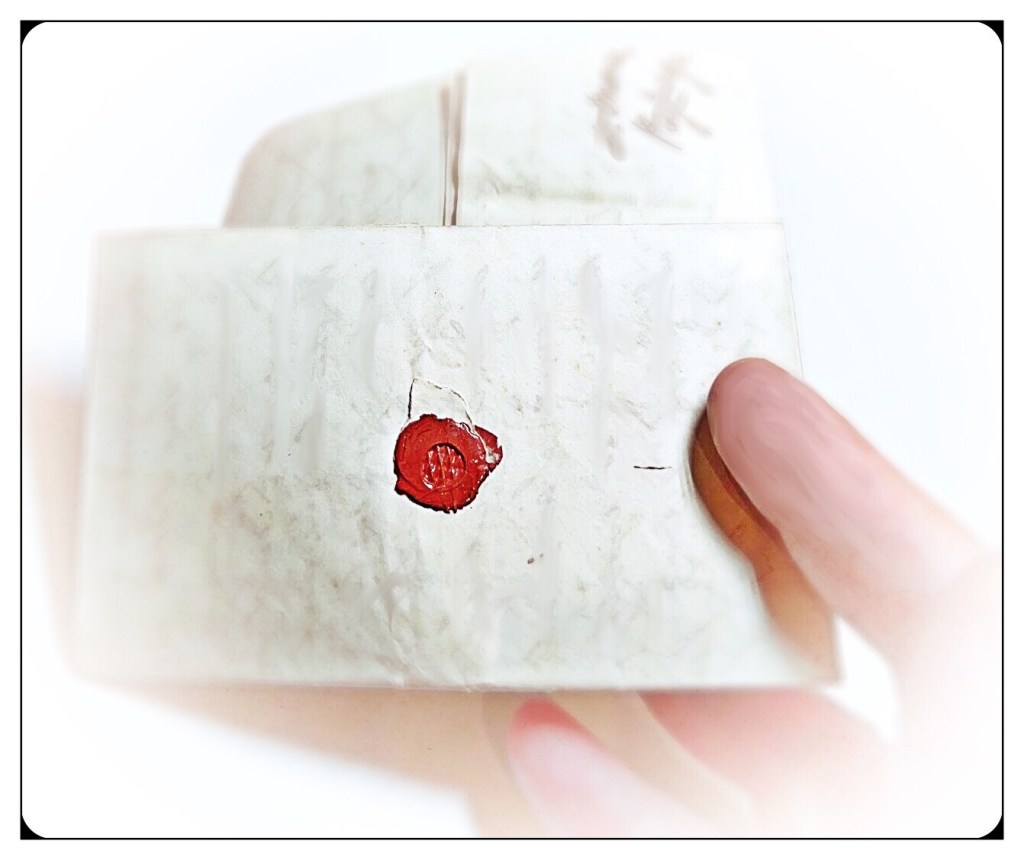


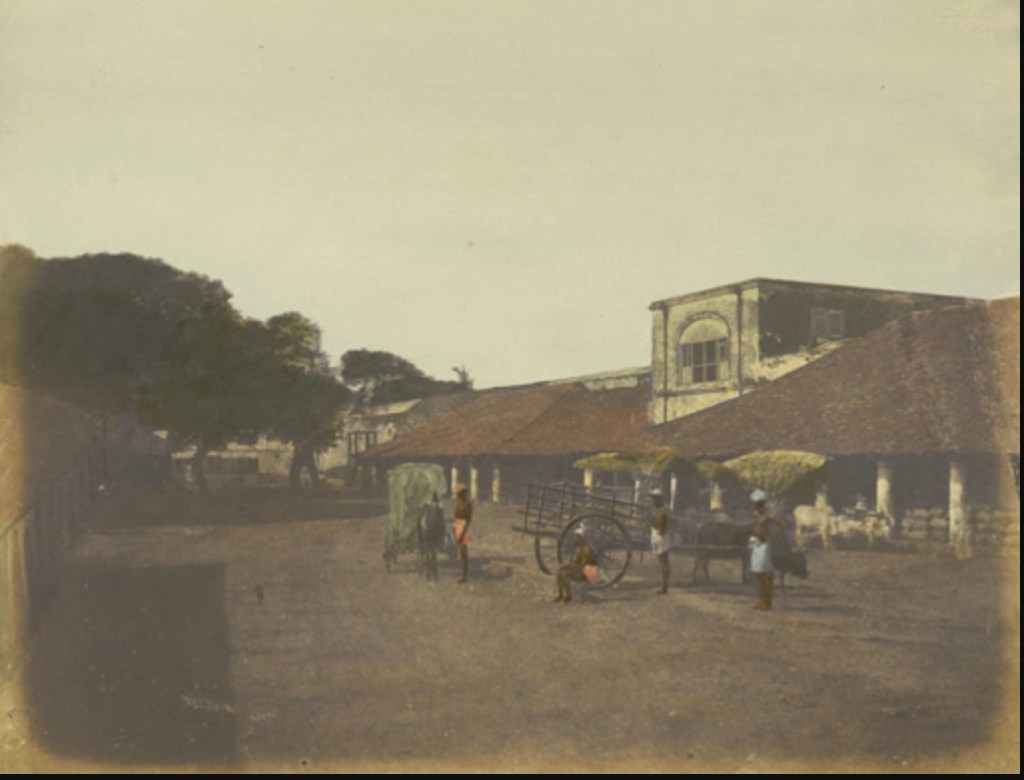

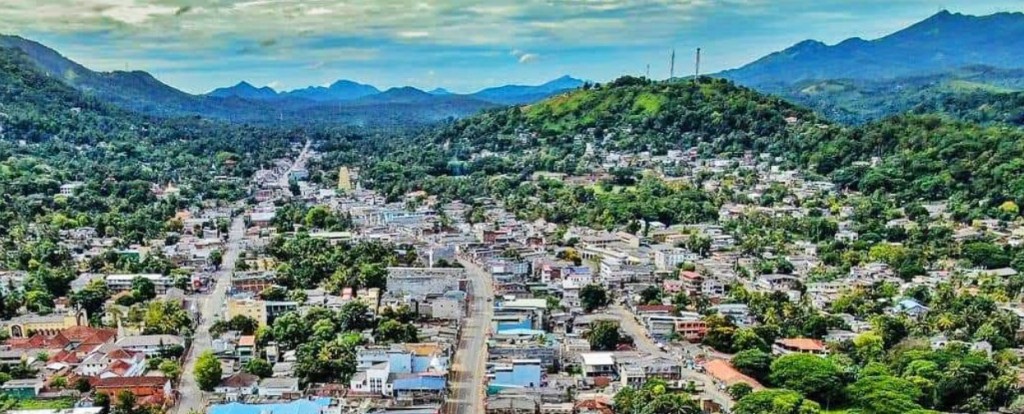

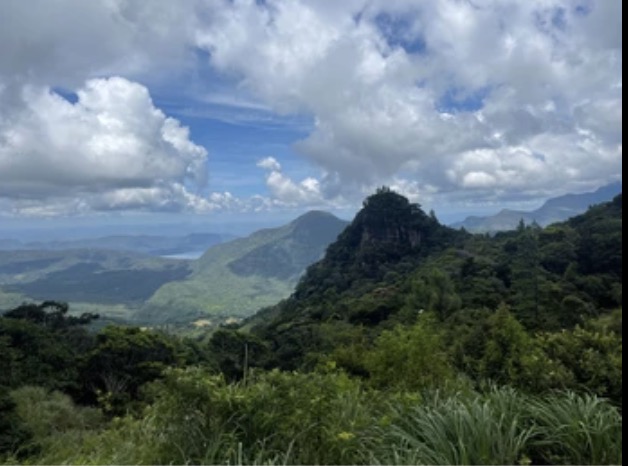

Henry Templer was born in Devon under complicated circumstances. His father George Templer (1781–1843) was a Devon landowner, and the builder of the Haytor Granite Tramway. George was the son of James Templer of Stover House, Teigngrace, Devon. George inherited the estate on the death of his father in 1813.
George had a number of business ventures which continued on some of the work of his father. He built a railway taking coal up from the docks. He was very keen on fox hunting and was a friend of the famous huntsman, Jack Russell. He also enjoyed amateur dramatics, and invited many celebrities to Stover.
Henry’s mother Anne Wreyford was the daughter of a local farmer from a next door farm at Green hill, High Weeks.. She had a long term relationship with George. She was not from the same social group as him so a marriage would be frowned upon. George and Anne had six children together. Henry was the fifth child of this relationship. It is very possible that Henry never lived at Stover house. Anne was brought up on Green hill farm and some suspect that Henry installed her at Ash hill farm next door to Green hill farm and a short walk across the fields to Stover.
In about 1825 George’s businesses were doing very badly at this time and he had to sell Stover and his precious hounds in 1826. This may be why he then decided to marry Ann. As a debtor he was in some disgrace anyway so it was an easier time to come clean about his relationship at this time.
So in 1826 when Henry was 3 years old his parents married in London. And four of the children were baptised at St Marylebone church in Westminster that year. This was Anna, Frederick, Henry and his younger sibling Caroline Mary. The address given on the baptism records is the newly built Clarence house looking out over Regent’s Park – a very nice address in central London.
George and Anne then moved to France. However Anne passed away 3 years later in 1829. She was buried on Christamas Eve in Boulogne sur Mer. Henry was 6 when his mother died. George then returned to the Devon area that he clearly loved and built himself a new home at Sandford Orleigh again within spitting distance of Stover, Teigngrace and his wife’s parents at green hill farm.
It seems from letters and family records that George treated his and Anne’s children as entirely legitimate and ensured that they were properly educated, and in due course were directed into good careers or marriages. Later in his will he carefully labelled each of them by name and the surname “Templer”. Perhaps making clear their legitimacy to inherit in his eye.
Six years after his mother died when he was 12 Henry got a new step mother. This was a more “suitable” marriage for George. Charlotte Kennaway, was the daughter of Sir John Kennaway, they were married in 1835. There were two daughters from this marriage. From the letters Henry has wrote it seems that it was a warm family atmosphere and he was clearly fond of his little step sister Georgy.
In 1839 when Henry was 16 there are a number of letters from Henry now in London which describe him making preparations to go to Sri Lanka. He looked at two boats the Morning Star and the Achilles. He finally settled on the Achilles which was cheaper, faster and had a larger cabin. He met up with various people who London who wrote letters of introduction for him.
The letters continue once he gets to Sri Lanka and we have some fairly detailed accounts of his life there. Firstly living with Charles Buller for 6 months and then his early days as a customs officer in Ballepitty Moderah. And something of the loneliness of his life there and his homesickness.
He describes in detail how the family connections he had there were very important for him. They were Francis James Templer (later Treasurer for Ceylon) and Charles Buller – Governor of Ceylon who retired in 1842 not long after Henry arrived and later Arthur William Buller – of Ceylon (who was married to his aunt Anna Henrietta Templer). He and his father leant on these links to get his roles in the Civil Service but also they helped him find company and comfort.
He clearly had a close and warm relationship with his father who he wrote to often. Sadly George was to die in 1843 – so it is unlikely that Henry ever saw him again. It must have been a big blow for the lonely 20 year old.
Judging from later accounts Henry grew into his roles working in the civil service first as a customs official and later as a police magistrate. He was an amiable fellow well like by local Sinhalese and his fellow civil servants.
“Eight years wandering in Ceylon” is a great account by Samuel White Baker of what it was like to live in that area from 1845… It is describing Sri Lanka as it was 6 years after Henry was first there. But Henry and Samuel would have been pretty much the same age so would have experienced similar things..
In his letters Henry bemoans the lack of female company several times. Not surprisingly given his loneliness and his yearning for female company he met and married orphaned Cornelia in 1844. He was 22 and she was 19.
By 1845 his beloved younger sister Caroline had come out to Sri Lanka and was married to. So perhaps she finally agreed to his requests to come out and keep house for him. Maybe she decided to go after their father died in 1843. From his letters that probably gave him a great deal of pleasure as they were definitely close.
Henry and Cornelia had their first children which were George, then Gertrude . This was quickly followed by Edmund Reginald and lastly Charlotte Emily.
Sadly Henry died in Matalle where they lived of a tropical illness. George William was only 4, Edmund Reginald 2 and Cornelia may have been pregnant with Emily Charlotte.
Henry was buried at Kandy. A memorial to him from the local Singhalese community was placed on his grave. This is something of as honour. So something to be proud of.
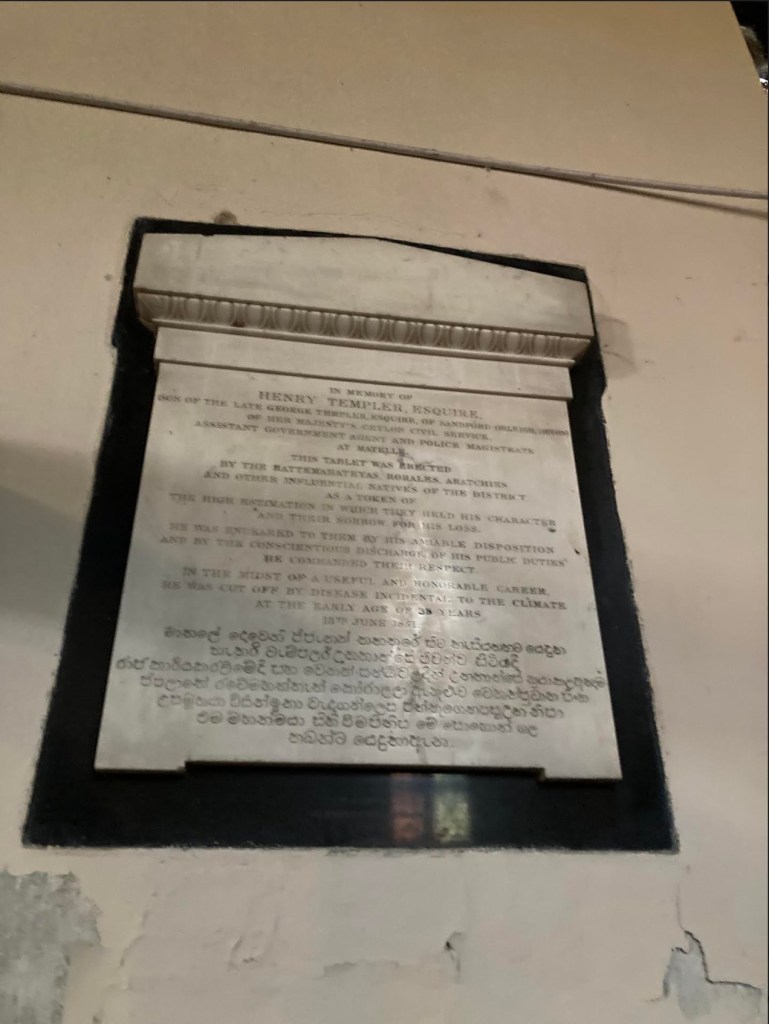

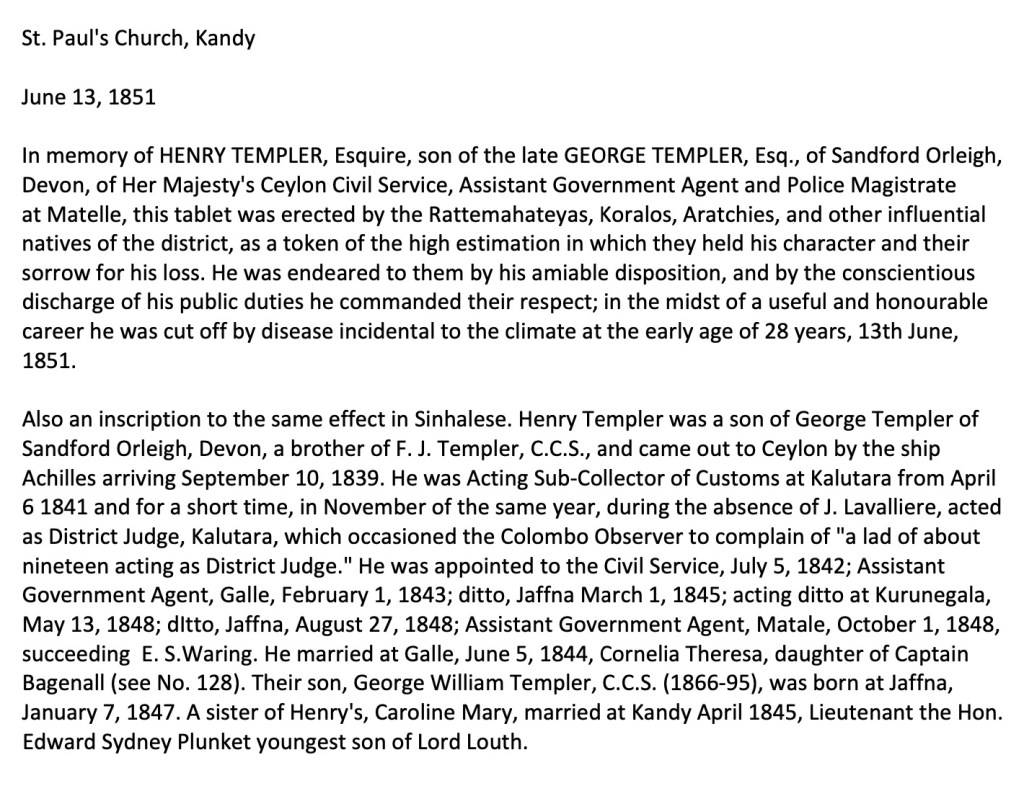
10 Letters from Henry as he leaves the Uk and heads to Sri Lanka aged 16/17. The letters are very poignant when you realise that he never saw his father in person again or probably his beloved Devon after leaving for London just before the first of these letters. His father died in 1843 in Devon and Henry himself died in 1851 in Sri Lanka aged 28.
People mentioned in the letters
Uncle Francis and Aunt Ellen are George Templer’s brother and wife. Francis James Templer was the collector and government agent of Colombo (1833-1843) at this point. In 1843 he was appointed the 9th Treasurer of Ceylon. Clearly George and Francis were planning to create a coffee estate as mentioned by Henry in the letters – this was probably put to an end to because George died unexpectedly in 1843. In the last letter Henry refers to “Frank” I think this must be a reference to his uncle Francis.
Kate is Henry’s cousin who he clearly spends a great deal of time with. Kate is Francis’s daughter and Wodehouse is her husband.
Charles Buller – was Governor of Ceylon when Henry arrived and Henry spent his first six months living in their house. He retired shortly afterwards and returned to England. His son Arthur was married to Francis James Templers daughter. But there are other family connections too. Henry’s grandmother was Mary Buller who was Charles Buller’s aunt. So Henry’s father George and Charles were first cousins. Charles was instrumental in getting Henry a position in the Civil service. Much later Henry’s widow married another Buller cousin and his daughter Gertrude marries her mothers step son!
Sir Arthur William Buller – Charles son married to Ann Henrietta Templer. He initally had a successful career in Canada. He came out to Ceylon not long after Henry arrived in 1840. He was appointed crown attorney in Ceylon, and held this post until 1848. He was made a judge of the Supreme Court of Calcutta and served in that capacity until 1858. Buller died in April 1869 in London, after being a member of the British House of Commons for ten years.
The Whitings were a family living out in Sri Lanka. They had a young family. Eliza Whiting visits with Henry at his Station. At that point she would have had a small baby Emily Whiting and possibly been pregnant with her next one! Clearly Henry got on well with the couple as he often seems to dine with them and spent days or even weeks in their company.
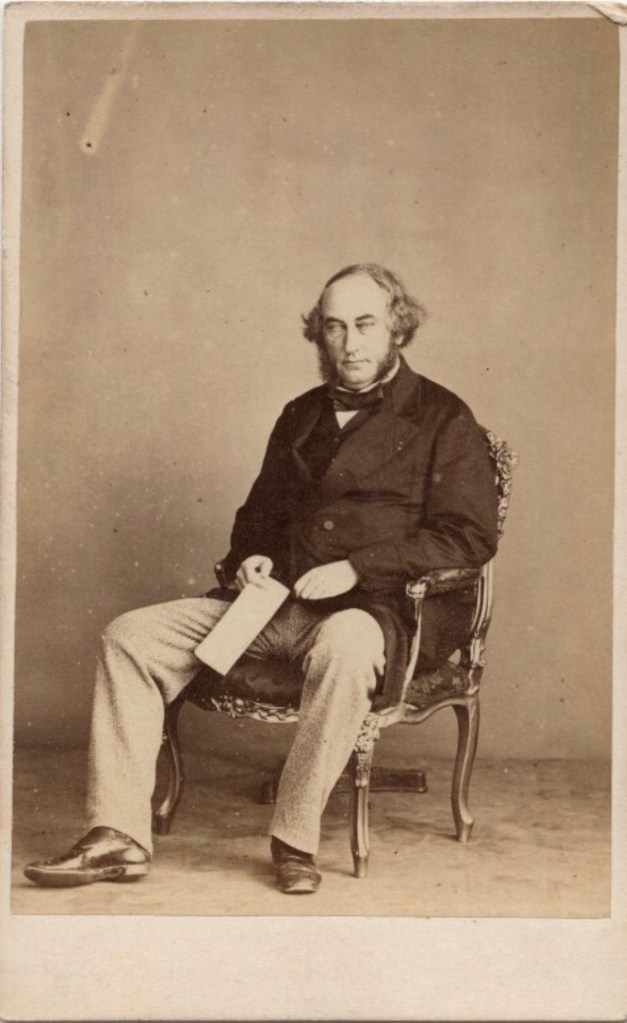
Caroline Templer Henry’s sister did eventually come out to Sri Lanka and did marry an officer out there. It seems likely that she finally gave in to Henry’s request and went to “keep house” for him. Although his may have been after he married Cornelia in 1844 (or perhaps after their father died in 1843). Caroline married Edward Plunkett in Sri Lanka in 1845.
One of the few records of Frederick Henry’s brother is made in the last letter to Caroline. It says he is in Australia. I found no futher records of Frederick except that he was party to a court case in 1845 – it states he is abroad. We do know Henry’s older brother George died in Christchurch, New Zealand.
Georgy and Gussie are Henry’s stepsisters. Georgy is only two when he left and he never meets Gussie. His other two sisters Amelia and Anna are getting engaged and married in the years that the letters are written. At first he hopes Anna will come out and keep house for him but her engagement puts paid to that.
Mama is Charlotte Templer nee Kennaway Henry’s stepmother and Lady Kennaway is her mother. Mrs Acland nee Templer is Henry’s Aunt.
Letter 1: Arrival in London
Woburn Square April 21st 1839
My dearest Papa and Mamma
I have arrived quite safe and well in London after a very cold ride. Little George Buller of Pound came up on the same coach and the same seat which was very pleasant, on his way to Eton. Mr Dean drove a great part of the way out of Exeter. I stopped at Escot and ran down to the House and gave Mama’s note to young Lady Kennaway. I had only time to say goodbye and run out again which I was very glad of having the opportunity of doing. Brunshill had made my coat and trousers by the time I came. He had entirely forgotten it and could not recollect anything about it until I told him it was to cost only two guineas being so much cheaper than Silvers. He has made one much lesser cloth than you asked. I had my dinner there which saved 3 d and bought a cloth to cover my legs of him which was not open which he had of Cook. It was marked 12 Guls, gave only 10. It is a very large one and very good. I am so sorry I should have forgotten to get a bill about the steamer. I was very much cramped of time but I ought to have done, you having so expressly told me to do it. But I will not fail finding out every thing about it tomorrow morning. Mrs John Buller is such a very kind agreeable person I am a very little way from W. Footer which I am very glad of tomorrow morning. I shall do all you told me and finish my letter. My expenses up were about 13 S. Some people say the Steam coaches do not go so very fast. I say they travel immensely fast when you pass a person you cannot see whether he is a black or white man and the rumbling is tremendous. I think I had better write to Lady Kennaway myself to thank her for her kind present which I really had not time to do. I read mama’s little pocket companion which she gave to me every (?) day . I saw Mr and Mrs Vigor walking in their field just after I left you but I do not think they saw me. I was so sorry not see him but do tell him I was very much ??? for time and when I was over there I could not find him. Give my very best love to Amelia, Anna and Caroline and to Uncle and Aunt Elizabeth. Remember me kindly to Mr Vigor and family and to all the servants at home. Mrs John Buller sends her kind respects to you and Mama. I shall finish off tomorrow. Sunday 6 o’clock
The Morning star leaves Dock next Saturday 300 four Bundes??. She does not touch at Columbo nor Plymouth nor Portsmouth. The Achilles another ship sails in about 12 days and touches at Columbo. My bid is cause the passage is 6 months. I am not going down to the dock to see her til late tomorrow and will give you a correct account of the Cabin and passages. There are no cabins taken for certain as yet so that I have a choice if you would like to have a plan I could send it you but I will not today. My sofa has come I am afraid it has cost more money than it is worth, the carriage alone is more as it cost 23 for carriage. I should think it ought to be inquired into. I can ????? Is 8 times as much as it might have cost. I shall write again before I leave London and shall be very glad to hear from you. My clothes will be ready tomorrow and I shall have them to try on so if they do not fit they will be made to do so. Mr John L Buller came home just as I was going to bed. He had a n…. Bed for me in the house but took lodgings at Mrs Wakefields 27 Frances St. I am going tomorrow to the bank with Mr Buller as you directed. I hope you are all quite well. Best love to all and kind remembrances to the servants. Mary’s gloves will be of great use but as yet I have not use. Tell her they are very sailable being made by her. I have not got my dressing case yet or anything else but I have looked at many.
I remain
your most dutiful and affect
son Henry Templer
Monday 4 o’clock
Letter 2: Choosing a ship
Stone Buildings, Lincolns Inn
April 25th 1889
My dearest Papa and Mama
I have been this morning to see the Morning Star. She is a very nice little ship but I think she will not do for me. She sails to Trincomalee which is on the opposite side of Ceylon and I want to go to Columbo. The Achilles the plans of which I send you goes direct to Colombo and sails the beginning for next month about a week or fortnight after the morning star which does not sail until the 1st of May. The Captains of both strongly advise me to go by the Achilles. It will save two months voyage which is a great thing. Besides 30 pounds and very likely save me from catching the jungle fever. And I shalll get there a month sooner. The ships belong to Mer Wendell who also advises me to go by the Achilles. The passage from Trincomalee to Columbo is a very unpleasant one. W. Footer says there can be no hesitation about it. Do let me know directly which you fix upon. I should certainly say the Achilles. She touches no where. There is plenty of light in the cabin. I am sure if it saves time and expense there can be no doubt. The Captains of both seem very agreeable men. Write directly and tell me what I am to do in London all this time. I sleep at lodgings. I think it would be a good idea if I was to go to Mrs Charlie Bullers for a little time. I have not been there yet but intend going as soon as possible. I have got the letter about my watch. I have been very busy all day about my clothes and enquiring about the ship. So I have no time to spare. I do not like the idea of staying here 3 weeks or about. I do not know what time you come up here but I suppose it will be very soon. I should like so much for you to be with me. If I had known all this I might have staid home a fortnight or three weeks longer. I do not go any distance by myself for fear of losing my way. It has been very wet all the day. I put nurses letter into the post this morning. The next letter I send shall be in a frank it is too late to go for one now and it is of consequence. I should hear as soon as possible. Give my best love and best wishes to all. Give my remembrances to Mr Vigor and family and all the servants. Kiss to little miss George and all the rest. Ann’s present has been of use already. I think the Achilles is the ship for me. Write as soon as possible to tell me what to do.
I remain
Your most affect and dutiful son
Henry Templer
Tuesday
Please do remember me to Mays S???? And tell me how you all are. If you could have your letter franked I should be very glad. All those ??? ??? soon ??? away with what I have left. Remember me also to Beckford. I must not forget him.

Note on the plan of the ship next to cabin 8:
This cabin is not taken. It is a very large one and the price is 90 Guineas which is less than the other vessel. The cabin of the Morning Star is 6 by 5.8
Letter 3: This is a letter to Charlotte Acland (nee Templer) – Henry’s aunt – sister to his father.
My dear Aunt Acland
I received your letter and the present you been so kind to give me for which I am very much obliged to you indeed. I have been to Mr Layard who is very kind hearted agreeable gentleman. He is going to introduce me to Captain McAllen who is going out with me in the same ship and to the same place and has offered to take care of me and see my luggage landed safely on shore. Little did I suspect when I left home, I should meet with a kind friend so soon. I was going in the morning …
Unfortunately I did not photograph the rest of this letter. Part of it is written by one of Henry;s cousins (who addresses their part of the letter dear mother) and talks about visits to doctors and a confinement. So Henry clearly met up with this cousin to write the letter to his aunt.
Letter 4: Letter to Lady Kennaway – Henry’s stepmothers mother
17 Woburn Square
My dear Lady Kennaway
I hope you will excuse my seeming neglect in not answering Augusta’s letter before, but I thought I might wait till I had got the watch and tried if it was good. Mr smart will… ….. fi good and says it will keep …. Time. I am very very much obliged …. for having made me such a good and useful present. I hop you will excuse my hasty visit and my not thanking you at the time but the Coach would not wait, it was at the door when I got out. I am not going in the Morning Star as I expected, but in the Achilles. It will be very pleasant for me indeed. Captain McAlpin a gentleman going out in the same vessel having offered to take charge of me. And also to see all my luggage post on shore. I hope I shall never be without a friend, there is one who I … will always be my constant friend…. Protector. Please to Mrs Nel… the Book she was so kind as… and give my kind love to Lady Kennaway, Sir John and Hugo ..arte and Mrs Newman. I do not sail for a …
Only one page of this letter is available and it is torn with some pieces missing
——————————
Letter 5: Letter to George Templer from Henry giving details of his final preparations for departure.
17 Woburn Square
My dearest Father
I am sure you will be happy to hear that I have been introduced to Captain MacAlpin who is a very kind and useful person to me, he told me that I must not think him an unkind fellow if he sometimes reproves me for doing wrong. He says that he has had experience and knows what is right. He is besides being kind and friendly, a religious man which is a very desirable thing, he told me if he could be of any use to me organising my chest or anything else I had just on board if I would tell him he would do it for me. He is about 40 years old and has plenty of books which am welcome to read. Captain Lagarde one of Mr Layard’s (friends?_ is going out also. But not with me, he is going over land, he could have gone with me if the people of the ship had not told him they should not sail for 3 weeks or a month. I am to sail about the 10th. I thought it better to remain here instead of going unto Devonshire. I had fully made up my mind to come back to you. Before I enquired about the dates of sailing and then I thought it too short a time as it could only be for two or there days. There is only one reason why I should not like to come down which is I should be obliged to leave a second time. I am going tomorrow to Mr Glubbs (because Mr and Mrs Buller are going to Charlton for a change of air for the children who are just recovering from the measles) and also in order that I may spend the last Sunday in a house where it is kept properly, else I should go to Mrs C Bullers. I am going there on Tuesday or Wednesday. Mrs J Buller will not let me go till tomorrow because I may be with them as long as I can. I could not have come to people who are more kind. I have everything I want and they do all they can to make me comfortable, they beg I will come here before I go and leave all my things here while I am away. Mr Layard is gone to the country and I dare say he will call upon you. I asked him to do it, if he went to see Aunt Buller and gave him your direction, he tells me the people in Ceylon wear hats and not caps. Hats I think he told me he got here in Bond Street and cloth jackets also but I think I have enough. I wore my coat for the first time on Monday at dinner at Mr Hayne’s, the only inconvenience I found in it was finding the pocket. In the evening we went to the Hay market theatre. I do not want to go again just directly. I never suffered so much from headache in my life, the next day I was fit for nothing. A London life would not suit me at all, I never go to bed later than ten the same as at home and get up at I/2 past 8. W. Former has been very kind to me in showing me about the place but now I go by myself . Charles Buller is …. me Lord Normanby’s letter after Friday that is an awful day for the ministers. It is very probable they will go out. Whether they do or not I am to have my letter, his own letter to Mr Heacut Mackenzie, the governor will be of service to me and I am to have a letter of introduction to the Governors Lady from Mrs Bullers governess. I shall be glad when I am gone the anxiety and uncertainty is very wearing This I expect is very little to what I shall have some future day. You have the names of the Passengers, there are no Ladies. I wish there were some, the Captain is a very kind hearted agreeable man, middle age. There was a bag of coffee for you that came home the other day from Uncle Francis in the Iris. I have been on board her and had a glass of wine with three different captains. Cast Harewood of the Iris, Captain Duncan of the Achilles, my Captain and Linton of the Morning Star. Mr Porter told me about the coffee, a person who knows Uncle Francis. I have a letter of his for Uncle Francis. He has asked me to come to his house before I go and have a chat with him. The weather is very hot here. When I am settled I will describe my cabin to you.
Give my kindest love to all home, I should like so much to see you all again. Remember me most kindly to Mr and Mrs Vigor and William. Does poor Mr barker seem to feel his loss as deeply as ever. Kind remembrances to the servants and other people I know. Does miss Rendle the Baker ever ask after me, she used to after Fred. I think Charles at Ceylon is very likely to come home. It appears so from his letter to mr Layard his health seems to be very bad. Mr and Mrs J Buller send their best regards to you. I have nothing more at present to say. What I have told you is very little. I have not begun my journal yet but as soon as I am on board I shall.
The nail I am afraid will come off. One side of it is split more than half way down. I could cut it off but am afraid to. It could be a long job I think.
I remain
your ever most affect and dutiful son
Henry Templer
Thursday 2nd 1839
Ps I have written to Lady Kennaway and Aunt Acland thanking them for their presents.
Letter 6: On board the Achilles
Achilles May 12th 1839
My dearest Father
After a journey of 2 hours and a half by the steamer. I am safe on board, every thing at present is in a ?? and confusion. I think we shall not sail till tomorrow. Mr J. L. Buller came down with me and has seen my cabin, he thinks it is very comfortable and snug and I can assure you I think it is grand. I hope I shall find it so. This is the commencement of my journal I hopes I go on with it, it will improve more and more and will daily become more interesting at present it is a complete piece of patchwork something like most of my letters. I am sure if you delight to read my letters as I do your handwriting you must experience unspeakable delight. Your letters are everything to me. There is only one Bill of any sort that I have left and that is a washing bill, a shirt and stockings which I have had washed two or three times. I did not know the amount that is the reason I left it.
May 23rd
The day is very fine much better than I expected. My cabin now begins to look a little comfortable, the things are put a little in order.I have bought this morning a night lantern so that I may burn candles without being in fear of setting the ship on fire. Indeed it would be no joke to do so because there is a magazine of powder just under us. I think about a ton of it. We should look very odd if any fire did come near it. Before I bought my lantern I had nothing but a common open candlestick which the mate and passengers did not like me to use. And the ?? Accident should I have done so.
There are six passengers Captain McAllen, Doctor Beaston, Mr Allen, Mr Truncal and a little boy whose name I do not know who is going out to the Governor. They all seem to be very pleasant people. I am not the youngest, there are two younger than me. We have a cow, en sheep, nine pigs and plenty of geese, ducks and chickens. 15 sailors, Captain and Mate. I have not got my hats but I can get them out in Ceylon but not as cheap as in England. We are still laying off Gravesend where I suppose we shall be for some hours. I am almost afraid my paper is too think and Ink too light. At present my head is all in a whirl and I dare say it will not be long before I am sick. I do not mean to say I shall be so today but in two or three days. Wa re sailing away at this moment at a fine rate and shall very soon be at the shore. We shall anchor there for tonight.
The Pilate is such a funny looking little wretch I made a very good dinner and am quite ready for my tea. I have not been able to read as yet but as soon as I have every thing straight I shall commence a regular course of study. I have no latin book and only one Greek Testament but plenty of English books and a chess board and men Mrs Charles Buller gave me. They were exceedingly kind to me all the times I was with them. I do not much like the thoughts of leaving England still I am glad we have made a start, being kept in suspense so long is no pleasant thing. I am quite tired of it. I dare say I shall be able to get a sight of Devonshire and shall long to go on it. Every place near home I can picture in my mind the house, garden and walk where I was with Hasworthy cooking the night before I cam away. I fancy I see it all before me. Now I may consider myself to be on the sea…. Months. Give my very best love to Mamma and …. Tears and relation and to Mr Vigor and family, Kind sentiments to Mr Phillips and other people in the town. I do not forget any of them. I cannot write any more tonight. Tomorrow morning I will get up and finish it, My other letters I hope will be a little better than this.
I have suffered very much from sea sickness and could not send my letters before because I was in bed when the Pilate left. There is a boat coming off now and I hope this reaches you safe. I remain your affect and dutiful son
Henry Templer
Tender love to all at home. I cannot stay to write any more
Letter 7: From Sri Lanka just after Christmas
January 2nd 1840
My dear Father
I am afraid I shall not be able to write to you by the weekend as there is no office notion about the postage so you could not hear so regularly. The Jungle life is not what I like. You may live by yourself for 3 or 4 months without seeing an European. A person that is to live in the jungle ought to be married or a man that is no so fond of society. I am in very good health better than I have been since I landed. The hot months are just beginning and I feel them a little. Spent a very pleasant Xmas at Uncle Francis ??? ??? a family party. I like Uncle Francis and Aunt Ellen better every day. They are extremely kind to me and so are the ??? I am sure you will like him. Dates little boy (you may call him big now) has taken a great fancy to me, Lazy body says he is exactly like me. I was at a ball on the 31st December at the Pencils and danced in the New year. How different Xmas is now to what it used to be I remember what great Xmas’s we used to have at Uncle Johns at Chudleigh but those days we all ???/ I will wish you a merry Xmas and a happy New Year. Mr Edward Meryard came out a few days ago he seemed to know about Torquay and that neighbourhood and also about the Kennaways at least he told me all about them. Mr Layard and part of her family are going home and Mr and Mrs ??? who was here died a short time ago. If ever you meet them they will tell you how completely on ?? Is a great friend of mine. I have taken a great fancy to her. She always answers me very nicely. I shall ??? My best epistle to you. May god help you my dear father, Believe me too ??
From your most dutiful and affect son
Henry Templer
My dear sisters
It is very seldom I write to you I have just returned from a wedding and seen a happy pair set off. The Lady came out from England a fortnight ago to be married. They had been engaged 9 years and they had not seen each other for that piece of time. I think I might give you a companion in a few years time to get me a wife. I should not like to live here for 14 years without a companion to comfort me like Charles. It is very extraordinary what an affection children made for me. Mary was very fond of me, young ladies too the same. It is quite ridiculous this story in which the little girls flirt with me. I hope soon to hear that Amelia is married and Anna is engaged. Is ??? ??? married yet or likely to be, pray give my love to all that family. I find the people here are not so stiff and formal as they are in England. The balls here are very pleasant but there are not many ladies and what there are, are mostly married. I am getting thinner. It is not enough to win any lady although there are some people who are very fat. I think Anna when I get a situation you could come out and keep house for me. Miss Christina Mapleton is married to Mr Horkins and came here a few days ago in the Sir Edward Paget on the way to ???? and I near saw her. You cannot think how annoyed I feel. I might have heard of you. Mr Mergant a young man who came out on the same ship told me today. He seemed to like her very much. I danced until 4 o’clock in the morning on the 1st. I hear of you from Aunt Ellen and Kitty every month or nearly so, or from Charles. I think Charles is exactly like his brothers. He is a Buller all over in manners but a kind hearted person I never met ??. I hope you can see him next year and then you will hear all about me. I miss you. I am very keen to see you (and meeting again). I am getting very hale like every body else, no person can keep their colour here exerts the wife’s. We had a large party last night of 24 out of which 21 were Lazard’s. Charles made a speech he was very nervous, in fact there are very few people who are not, I am getting very much so, the climate affects ones nerves very much, Frank often talks about you Amelia he is a very agreeable young man, got plenty of gab gift. I do not know what I should do if I did not see him sometimes. He explains …???… anything. I am still growing and I can make a man in time, when at Kings Kendall how you all used to laugh at me about being so small. You used to call me Jeremy Riddler and little son. I think the next time we meet which I hope we shall soon some fattie face or ou will call me elephant.
April 7th
I am sorry I have not send this letter before but I think I sent another in its stead. You will no doubt be amused at reading over these letters. I am very much so at times although they are my own composition. I always write the first things that comes into my thoughts and when I read them over I am very much astonished I could even write so much. Mama had a great fanny for reading my letters at home, perhaps these will amuse her. At all events I hope they will – My style of writing has altered a little since. I wrote the first part of this letter
your affectionate brother
Henry Templer
April 7th 1840
Outside it say’s “Hal’s letter”
Letter 8: Letter about possible appointments
My dearest father
The Governor has received the letter from Lord Byrd about employing me and he has promised Francis and Charles that he will attend to my interests during his absence but it is impossible to say whether he will trouble himself about it. He is such an odd being. Connections ??? is everything and of others he has nothing to say to him. If it is left entirely to his Excellency and if he does not feel disposed to do anything for me I am no better than I was before. Uncle Francis is trying to get that letter filed and then it could be as good as an appointment. As yet it is not and I am sure I do not know whether it will be. You said Arthur Buller was coming out and he would be able to do something for me. I hope he will be but I do not know how he can exactly. If he does anything it should be done before he leaves England because the ???? Advocate has something to do with the Civil Servants ?? will move. I am daily writing to be moved. As regards wages it will be £100 a year, Most of the young men are getting this off estates and all my friends are wanting me to go also and if I can get in on the same terms as the officers it will be the best thing I can do. They have £100 to begin and the increase every year of £5 pounds when the estate comes into being when a percentage is given out of the produce. On a large estate that would pay ???illy
All announcements about what I am to do will be made I think before Charles goes home. For family news ?? Is not ??? Aunt Ellen that they are all pretty well Kate and Wodehouse are gone to their estate and Uncle Francis went up to look for some Coffee land and so is Charles. But you know I suppose that Charles is not a partner with you and Uncle Francis. I hope he may succeed in his coffee. He has begun. I shall be so glad when you and Uncle Francis begin, the sooner the better. You said Amelia would be married soon. I hope she may be. I shall be so very glad to hear of it and Anna is engaged congratulate her. God bless them and make them happy. Caroline I suppose is quite an accomplished person with all the activities at one to Pudd??? and now the sooner she comes out to Ceylon the better. Pleased shalll I be. Do send her out she will I am sure be happy and so pleasant for me to have a sister here. I spent the new year at Uncle Francis, there was a ball ??? At the assembly but such a stylish affair. I should have been much better planned, Dinner included at Molle. I am so sorry to hear of poor Georges’s illness. Let me know a place where he is now and in what ship that I may write to him. I am glad to hear little Georgy and all who ?? are so well and I hope they may remain so. Here cholera is at an end. I am Healthful today. You sound rather alarmed about it. ??? to them most of the people here. It confined itself mostly to the natives. Some soldiers died of it but not here around but have a feeling that it may be now over next. We have thank God all ??? ?? ?? how with agent to ??? ??? ???? altogether ??? Charles £5 and not I fear have none before he leaves because it is uncomfortable for me to live on £5 a year with that I could not even get curry and rice. I have now nothing more to pay. Do give my kindest love to dear Mama and sisters and kind regards to all ?? ??
Your ever affectionate and grateful son
Hal Templer
January 11th 1840
Letter 9: Letter about life in Sri Lanka
My dearest father
I will send you a copy of the journal I kept the first month
October 21 – Got up at 7 studied ??? ??? ??? a chicken beatten by one of the coolies which died in 3 ??? Next to the Barceau which was not a very good one. The Admiral bought two gaslights
22 ??? ??? ??? dined at Kates and talked over the concerns of early days
23 Dined at Mrs Whitings – Celia has sailed 61st each headed for England
24 Next to some horses. A great deal of thunder and lightening and rain in t he morning

25 Heard that I was appointed to the Celinese ???? At ?? Perrocori
26 Going to Catalina associated ??? ??? in the morning
27 Sunday at Catalina
28 ??? down from Catalina at 6. Had a very pleasant travel. Arrived at Colombo at half past ten as the sun setting. Catalina is a very pretty place, plenty of rain for about 9 hours on Tuesday night. Birkledge going to lecture the Clergyman. Dined at Mrs McKienys sadly Aunt Ellen Poorly
29 Thunder and lightening and rain fell night, did not ride in the morning. Dined at Mrs Layards
31 Rode in the seaside. See the Cirencanon Greed ????????
Attended the Embassy for the 1st time to begin work – Uncle Francis, Frank and ?? ?? the carte col ???. Heavy rain for 2 hours. Introduced to the Governor and his wife. Mr and Mrs Gibson dined with us.
2 Nothing practically Gibsons and Scabbard’s dined with us
4. Rode into the Port to see the officers detailed fin fell – none like an awkward squad fifteen officers
5. This day is not like it is is England nothing to ??? ??? it
6. Dined at the Lazard’s and met the Meryards
7. Took a ride in the carriage. Rode Bullers large grey – pulled my hair. Dined alone.
8. Took a ride in the morning. Went into Court. Mr and Mrs Whiting dined with us after dinner went the Theatre. The acting is very comical. It is got up by the soldiers and is a very good thing as it keeps them from getting drunk which they otherwise would.
10 Went to the Pillah church and heard the Bishop preach
11 Got wet going to the embassy sennaical piece till half past 6, dine with Mrs Whiting and came home at 12 o’clock
12th went the Pisces in Ceylon Society meeting. Heard Buller’s voice but not his words did not see his face which the young ladies love to see ?????????
The Bishop made a very good speech and about an hour after called into a fainting fit which he is very subject to. He is a very weak man, sometimes he can ??? Faint for 3 and 4 hours
13 Went to a wedding the first I ever went to. Niece of Layard ’s were married to Mr Butlins. She is a very ??? ???? My friend I am sorry to say is gone to England. I did not kiss the bridesmaids as I ought to have done. They are rather too stiff to be fond of kissing and I accordingly left it alone
16th Found out my boy had robbed me of my clothes. Had his house searched. Found them. Put him into custody. Had a large party in the ??? ??? a very fete and ??? One.
22nd Rode out to the ??? ??? the coffee Uncle Francis and then rode back again
23rd went to Cave Island enquired after Mrs Merrison who is very ill. Saw Kate. Called on Mrs Owen Gleniul. Kate is the …. ???? dined alone
25 dined at the Governors, Meed the Fudle, Neus, Fielder – a very stupid party – Late Bombay arrived
26 Got weak in the evening. Mrs Steward Daniel with me and after dinner I went to the Whitings and spent a very pleasant evening
27 Had a good ride in the evening with Mrs Maynard. Dined at Whitings
28 Wet day could not go out in the morning. Dined with Caulfield who I think Anna knows. He told me he had met her in London. ????
29 Had a tolerable day and a very pleasant ride with Miss Whiting and to play Canasta and dined at their house
27 Been into the jungle to concerecete got on very slowly came home on ???
28 Spent the Xmas with Uncle Frances had two days family parties- This is the end of this part of the year. Now for my history in March and April. It is short and sweet. Received a letter from George on the 31st march. Appointed as acting custom master at Ballepitty Moderah on the 17th March 1840. Went to Galle on my way down, stopped at Catalina with the Whitings and had a very ??? ??? visit. Eliza came to my station, slept there one night and went on to Halle and staid there a couple of days with the Mecc??’s and came back again to Ballepitty Moderah where I ?? hard at work with Proctor, when I went to Catalina and staid four days with the Whitings. The four happiest days I have spent for a long time, While there’re had a trip up the sial and into the Generals bungalow and the botanical gardens. Came back to my station finished my work for this season and went to Galle for a day. We went to Church and felt very shy at being stared at by so many young Coolies as there was not one of whom I know they were all taking a peep as if I had been a monkey. Perhaps they were not much out of there ??? Not many people at Galle. and news. It went well ???? Ly kind to me and have offers to come and stay a week or fortnight at any time I like and the Whitings have loved the scene. On their way to Galle they breakfasted with me and also on there ??? From this you can see that I have not forgotten your request entirely Although I do not keep a complete journal yet occasionally I write down what has happened lately.??? Are ???? there marriages on foot and settled I believe. I am not of the happy party although people talk of my going to be married and laugh at me about it.
March 12 1840
I must not forget dear Amelia’s birthday give her my kindest and best love and I only wish I could kiss her once more. I wish her many many happy birthday and may every happiness and comfort attend her. For the last few days nothing has occurred. I am living quite alone and have no business. I shall now write a few lines to Mama and believe me wish to be your most affectionate and dutiful son
Henry Templer
My dearest Mother
Very few of my letters have been addressed to you but this one I cannot let go without thanking you for the many affectionate ones I have received from you. By this time I hope you are recovered from your ailing and all the party little George is still well and as funny and happy as ever and I only hope she may con be so. I is very little I can say about her but I think much more than I write. The finger the so often concerns you of is not right yet and I do not think the nail ever will be. I suffer no inconvenience over it. The cheese came out all safe but did not last long after landing, they spoil very fast. If ever you send me anything do not let it be a cheese. I do not think they are so much prised as you imagine. Boats are very often sailing from this for England and much do I long every time to return once more to see my dear and affect friends. Now that I am alone from the world they are very often and I may say ever in my thoughts. There must be some delay I think in sending your letters because I have only received two since I left England and that is now exactly a year. I did write something about you neglect of courtesy in all my letters but now I find it all wrong. Many many thanks to you all for writing to me and I can assure you it is the pleasure and happiest temperance to read over your letters and all the others. I must beg you in this letter also to write to Uncle Francis. I am afraid I never can sufficiently thank him for his kindness to me. He has taken a very great interest in my future happiness and has done and is still doing every thing he can to promote it. Charles has been very kind to me. I lived with him for 6 months during which time I can safely say he never said an unkind work to me. I am indebted to both of them more than I can express. I wrote a letter to Lady Kennaway but I do not know whether it is gone. I sent it to Colombo. I do not think it was a very satisfactory one. I must now stop my scribblings and fill up this piece of paper by Monday. My kindest and most affectionate love to my dear sisters one and all and Uncles, Aunts, cousins and the whole lot and kind remembrances to all of whom I know – particularly to the Vicors and Bierlly and I must not forget Mary and the S??? Susan I suppose has left if not tell her I like Ceylon better than London. May God bless you all. I am my dear Mother your ever affectionate son
Henry Templer
Ballepitty Moderah
May 18th 1840
Gill has sent best love to all
Direct to me Columbo as usual, my station is Called Ballepitty Moderah
My dearest sisters
I will fill up this by telling you that I am going to Columbo for the birthday ball where I shall dance as much as I can. I often think of my dancing to Baby like his Parrot or some name of that sort. Frank is an odd chick he will make you laugh when you see hi. He is always in good spirits nothing puts him out of temper. Kate is lovely too but generally speaking when we get together we are very sober. I am longing to see Gussie. I hear so much of her I think you will like Aunt Ellen very much and Wodehouse in my opinion they are two very kind agreeable people. I am as fat as ever notwithstanding the hot climate, Anna you may rely upon it I shall not go elephant shooting for a year or two. At present I have not too much courage and that is dangerous sport. We are obliged to go within ten feet of them and should the gun misfire or he see me before I fired he would kill me for a certainty. I wonder so few accidents have occurred. God bless you my dear sisters
Your affectionate and loving brother
Henry Templer.
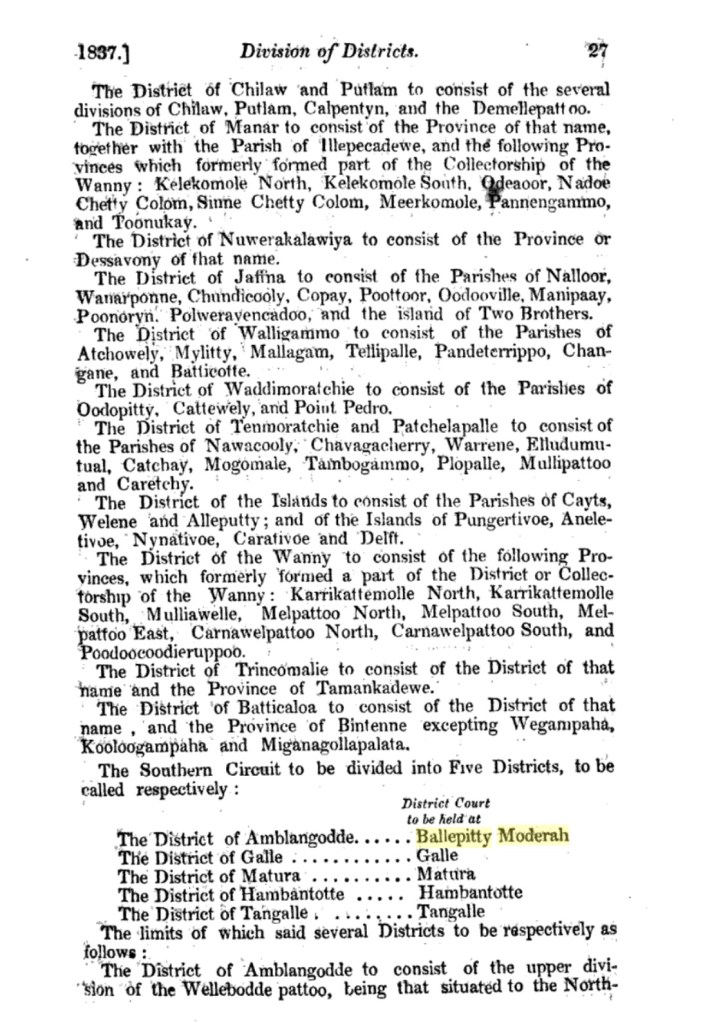
Letter 10: Letter to Caroline
To Miss Caroline Templer
Ballepitty Moderah
August 2nd 1840
My dearest Caroline
Knowing how much you prize those letters that are addressed to you I will give you one for your oneself in return for the many kind and affectionate ones you have written to me which are prized very much by me and which I often read over with the greatest pleasure. I have just read the one you wrote on Christmas Day and have laughed most heartily at the first part of it. Now I will tell you a little about myself. I am now living in a small cottage by the roadside with no European nearer than 20 miles. I see nobody but black people. I have no work to do, and a gentleman at large which does not suit my taste. I quite envy poor Frederick who certainly has endured very many hardships but he has employment. It is too hot to go out in the middle of the day, so I am obliged to stay indoors. The largest room in my house is as big as the little bedroom George used to sleep in. There are three rooms – one I use as a drawing and dining rook, one as bedroom and the other as Pantry. I have 40 £’s a year which I manage to live upon as well as I can and do very well upon it but I am expecting in a few months to be appointed to another station on 100£ and then I shall do very well. You think how very kind Uncle Francis and all the others have been to me. They have given me everything I wanted and treated me as their own child. I was certainly in hopes you were coming out and I was very much disappointed to hear that you were not. I am sure you would have like it. Kitty has such a nice little boy. I m sure you will be very fond of him. He has taken a great fancy to cousin Hal and so has cousin Hal to hi. I had such a delightfully long letter from Fred which I send home to Papa in case you have not heard. His is a hard life notwithstanding I would go there if I could but I am very well off where I am. He had to sleep poor fellow for 4 months in the open air and I have not had to sleep r minutes. Australia is a different country to what it is represented as you will see by his letter. I have been staying at Gale with the Stewarts who are very kind to me. There is not I can safely say one person I know who is not very kind to me and I only hope I shall never give them cause to make them otherwise. I had a regular scraping at a little boy I had a few days ago he had not dirty little wretch washed himself for 4 months so I took him down to a well and made him wash himself and how do you think he rubbed the dirt off his back. Why by rubbing himself against a coconut tree the same way a sheep does against a post Oh there are dirty people and great rogues. Fowls are very cheap only 6d. each that is the very largest. If they were dear I do not know how I should live it is the only thing I have eaten since I have been here. I am sorry to hear of the deaths of so many Newton people whom I know. When Kate read your letter she began at me directly wanting to know who the young lady at Miss Sweeting·s was and Miss Rendle. Pray remember me to them all most kindly and tell them I have not forgotten them. How I should have liked to have been at your birthday party. I would have danced but I still hope the time will come when I shall be at one of your birthday parties but then how everything will be changed. What a difference a few years makes in a family. Your birthdays are never forgotten by me nor are those of any of my relations. I have been at a great many Balls and Parties but all that sort of thing is dying away very fast. I hope your health is better than when I left. I expect to hear every day of Annie’s arrival. She ought to be here now or in a day or two. I am very anxious to see her in order that I may know how she left you all. I am not otherwise than when I left England but I think a little taller and still dressed in the boyish dress that Mama is so fond of the jacket and turn down collar but the innocent locking cap is changed for a hat, when I go to Colombo. How does your garden get on. The one you asked me to put the bones round which I am sorry to say I did very unwillingly and many times have I thought of it since. If I were home now I would do it my dear sister with the greatest pleasure and with all my heart. I have not seen such a thing as a garden since I left England. One day Charles Buller went with me to see Miss Layard’s garden and when there I asked where the garden was he said why this is it do you not see it it was nothing but half a dozen large trees and I would much rather have seen 2 or 3 Elm trees. Charles I think will be astonished when he sees an English garden. Tell me what ship George is to sail in this next voyage whether the same or another. I have seen Mr Stewart he gave me letter of Introduction to(?) and like him very much. Have you seen the little dancing (?) lately.
Great many of the natives have what is called elephantiasis which is a leg without any exaggeration as large a gatepost, exactly like an elephants and not a bit smaller. I hope Louisa I should say Miss Vigor is all well again. Pray give my kind love to Mr. Vigor and c. No doubt he will be very glad to see George. How is Leah and when to be married very soon I hope. I am rather pale but very well all the Ceylon people are so. When you see Mrs Bickford tell her I wished to be remembered most kindly to her and to the 2 Miss Bickfords. Send me something when you have an opportunity of your making never mind how small a gift. Mary’s gloves are in my chest and never do I see them but I think of her and remember the morning she came in to me and said Mr. Henry, I give you a pair of gloves which I hope you will find useful. I know you like giving messages so please tell her that I have not forgotten her kindness to me in former days at Kingskerswell when she used to come in at eleven at night and tell Miss Lewis that it was late and time for me to go to bed. I suppose Miss Georgy can dance now and talk. I should give a great deal to hear her. I am afraid this is not so amusing a letter as mine used to be especially when read by Mama. I must now wind up by sending my kindest and most affectionate love to my Father and Mother and sisters, kind remembrances to the servants and people of Newton and may God ever bless you my dear Caroline and give you health and happiness and now accept the kindest love of your ever affectionate brother
Henry Templer

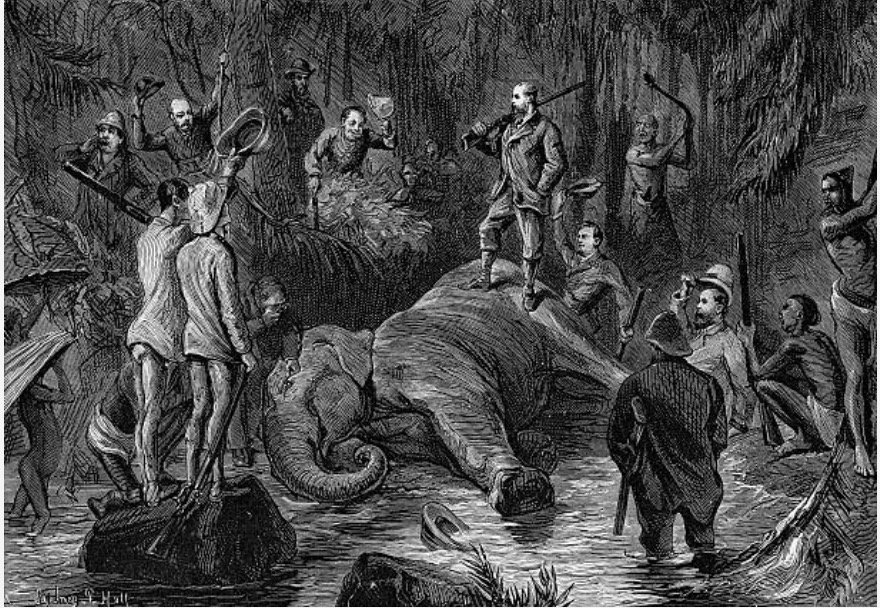
Thanks to the nine descendents of Henry Templer who have taken a DNA test we can confirm this line as we have matches between 3 of their descendents – namely: Gertrude, Edmund and George William. Charlotte Emily did not have children.
Thanks to the Box, Plymouth for allowing me to see the letters written by Henry and transcribe them. A copy of the transciption has been left at the archive.
Thank you to Anthea McMyn for taking the photograph’s of Henry’s memorial at the church in Kandy on her recent visit to Sri Lanka.
A huge thanks to Andrew Templer of the Templer family website without whom I would never have found the letters. It was that website that explained to me the relationship between George and Ann Wreyford.
Thanks also to Michael Leviseur and Clive Hammersly two fellow descendents for helping me along the journey to finding out more.
See match summary









